

Live-English.net
Learn English Online with real teachers
40 Basic Vocabulary Words and Common Phrases for Travel in English

Embarking on a journey to a foreign country can be both exciting and a bit daunting, especially when language barriers come into play. But fear not, we’ve got you covered! This page is dedicated to all the globetrotters out there who are keen on enhancing their English language skills specifically for travel.
We’ve curated a list of 40 essential English words and phrases that will prove to be your best companions on your travels.
Whether you’re a seasoned traveler or planning your first overseas trip, mastering these words and phrases will not only boost your confidence but also enrich your travel experiences. So, let’s dive in and start preparing for your next adventure with our comprehensive travel vocabulary guide. Happy learning and safe travels!
40 essential English words and phrases for travel
- Passport – “Don’t forget to bring your passport to the airport.”
- Luggage – “Please make sure your luggage is not left unattended.”
- Reservation – “I have a reservation under the name Smith.”
- Itinerary – “Our itinerary includes stops in Rome, Paris, and London.”
- Destination – “Our final destination is Sydney.”
- Accommodation – “I’ve booked accommodation for three nights in the city center.”
- Sightseeing – “We’re going sightseeing in the old town tomorrow.”
- Currency – “What’s the local currency in Japan?”
- Boarding Pass – “Please have your boarding pass and identification ready.”
- Departure – “Our departure time is 6:00 PM.”
- Arrival – “Our estimated arrival time is 8:00 PM.”
- Customs – “You’ll need to declare any items at customs.”
- Visa – “Do I need a visa to travel to the United States?”
- Tourist – “As a tourist, I love exploring new places.”
- Landmark – “The Eiffel Tower is a famous landmark in Paris.”
- Guidebook – “I bought a guidebook to learn more about the city’s history.”
- Souvenir – “I bought a souvenir from each city we visited.”
- Jet Lag – “I’m feeling a bit of jet lag after the long flight.”
- Travel Agency – “The travel agency arranged all of our accommodations.”
- Backpack – “I prefer to travel with a backpack instead of a suitcase.”
- Could you help me, please? – When you need assistance.
- How much does this cost? – When you want to know the price of something.
- Where is the nearest…? – When you’re looking for something specific, like a bathroom or a subway station.
- I would like to book… – When you want to make a reservation.
- Do you speak English? – When you need to find someone who speaks English.
- I’m lost. Can you help me? – When you need directions.
- Can I have the menu, please? – When you’re at a restaurant and want to see the menu.
- I’m allergic to… – When you need to inform someone of your allergies.
- Can I have the bill, please? – When you’re ready to pay at a restaurant.
- What time does it open/close? – When you want to know the operating hours of a place.
- Can I have a ticket to…, please? – When you’re buying a ticket.
- Where can I catch the bus/train? – When you need to find the bus or train station.
- Is it far from here? – When you want to know the distance to a place.
- Can you recommend a good…? – When you’re looking for recommendations.
- Do you accept credit cards? – When you want to know if you can pay with a credit card.
- What’s the Wi-Fi password? – When you need to connect to the internet.
- I’d like to go to… – When you’re telling a taxi driver your destination.
- Is there a pharmacy nearby? – When you need to find a pharmacy.
- Can I try this on? – When you’re shopping for clothes and want to try something on.
- Could you take a picture of us, please? – When you want someone to take a photo of you and your group.
Wrapping Up Our English Travel Vocabulary Journey
And there you have it! We’ve journeyed through 40 essential English words and phrases that will help make your travels smoother and more enjoyable. Remember, language is a powerful tool that can open doors to understanding new cultures, making new friends, and creating unforgettable experiences.
Don’t worry if you can’t memorize all the words and phrases at once. The beauty of language learning is that it’s a continuous process. Keep practicing, and soon these words will become second nature to you.
But why stop at 40? If you’re eager to expand your travel vocabulary even further, we have an exciting offer for you. Follow us on Instagram and send us a direct message to get your hands on our comprehensive eBook (write “Travel eBook”), which features 200 essential English words and phrases for travel, plus 2 special bonuses!
We hope this guide will be a valuable resource for your travel adventures. Whether you’re exploring bustling cities, tranquil countryside, or exotic beaches, these phrases will help you navigate your way with confidence.
Thank you for joining us on this linguistic journey. We wish you all the best in your English learning and your future travels. Remember, every journey begins with a single step, or in this case, a single word. Happy travels and happy learning!
>> Learn more English vocabulary
Privacy Overview
My English Language
English language resources for efl students and teachers.

Travel and Transport
Travel vocabulary: using english for travel.
Travel vocabulary is one of the most useful areas of language learning today, as more people than ever are travelling far and wide for business and pleasure. There are many useful words and phrases we use when travelling and dealing with transport.
Although our travel plans have been put on hold for a while due to the Coronavirus pandemic , the world is slowly starting to open up again. This means we need to be ready with our travel language and vocabulary for when we can get a flight, a bus or a train!
For non-native speakers , travel vocabulary is a particularly useful topic of study and always a popular subject, allowing you to enjoy organising your travels without worrying about language issues.
Explore travel vocabulary here and learn useful vocabulary related to travelling and using public transport. We have included useful words related to using trains, buses, cars, taxis, planes and boats, so you can have your travel phrases covered, whatever your mode of transport.
General English Travel Vocabulary:
to arrive , to depart, to leave, to stay,
to cancel, cancellation, cancelled, delay, delayed
to book, to reserve, reservation, to cancel a reservation
holiday, business trip
suitcase, bag, luggage
trip, journey, to travel, map
travel agent, brochure
ticket office, fare, price, single/return ticket
by foot, on foot
travelling by plane, by train, by taxi, by car, by boat
roundabout, road, traffic lights, speed limit, junction, cross roads, road signs
Image source
Transport Vocabulary and Useful Phrases:
Wheels, steering wheel, dash board, indicators, headlights, roof, bonnet, boot, engine, battery, windscreen wipers, garage, car mechanic, petrol station, service (a ‘check up’ for a car)
Double decker, single decker, passengers, bus driver, bus stop, bus station, bus conductor, coach, luggage hold, bus lane
Bus travelling phrases:
the next stop, the last stop, to get on/off the bus, to buy a ticket
Train station, platform, track, level crossing, locomotive, underground, cross-country, local, return, single, ticket, carriage, first/second class, train driver, ticket inspector, waiting room, seat, timetable, guard, season ticket, fare, travel card, buffet car
Train travel phrases:
to catch a train, to check the timetable, on the platform, to travel cross-country
to get on the train, to embark, to set off (on a journey)
to get off the train, to disembark, to alight
ticket machine – a machine where you can buy your train tickets
ticket gate – a mechanical gate blocking access, where you need to insert your ticket to pass through
the buffet car – a carriage on a train where you can buy drinks and snacks
Grand Central Station , New York City – image source
Cab, black cab (official English taxi), fare, taxi rank, taxi driver, tip ( noun and verb )
Taxi travel phrases:
to hail a taxi / to flag down a taxi (when you raise your arm to get a taxi driver’s attention to encourage it to stop in the street)
to pay the fare (the fare is the fee for the journey)
to tip the driver (verb) / to give the driver a tip (noun)
Aeroplane, airport, airline, wing, runway, pilot, gate, passport, excess baggage charge, cabin crew, flight attendant, air steward/stewardess, security, turbulence, seatbelt
take off, landing
turbulence (uncomfortable, sudden movements of a plane due to air pressure/temperature changes)
hand luggage (luggage you take into the cabin with you)
hold luggage/checked luggage (luggage you check in for stowage under the aircraft)
over-head locker (where you can put your hand luggage)
boarding card, customs, departures, arrivals, lounge, aisle seat, window seat, check-in, in-flight movie, in-flight entertainment
terminal 1, terminal 2 / T1, T2 (a terminal is where passengers go to buy tickets, check in luggage, go to their boarding gate etc.)
boarding gate – where passenger go to board the plane (i.e. to get on the plane), located inside the terminal building
A plane takes off – image source
Plane travel phrases:
to put luggage/bags in the hold
to board the plane
prepare for take off, the plane will be taking off in 30 minutes
prepare for landing, the plane will be landing in 20 minutes
to fasten your seatbelt, to buckle up (‘buckle up’ is slang for ‘fasten your seatbelt’)
the flight was quite turbulent, to experience some turbulence, there was some light/heavy turbulence
“How was your flight?”
“It was good, thanks, except there was some turbulence during the descent that made me spill my drink!”
“Great – it was a smooth flight and I slept most of the time.”
Ferry, cruise ship, harbour, deck, port, sea, ocean, cabin, captain, sail, sea sickness , crossing, on board, life belt/jacket, foot passenger, buffet, port side, starboard
- The difference between a boat and a ship: boats are small to mid-sized vessels, often used for pleasure trips. Boat is also a generic term for water vessels. Ships are normally larger and are used to carry cargo, passengers or smaller boats.
Boat travelling phrases:
to embark (to get on the boat) / to disembark (to get off the boat)
‘choppy’ seas / rough seas / strong waves
Calm waters will provide a peaceful cruise for this ship – image source
calm waters / still waters
to sail, to have a good crossing (a ‘crossing’ is when you go from one place to another on a boat/ship) – e.g. “Did you have a good crossing?”
to go out on deck (to go outside on the ship)
welcome aboard/on board (you might hear this when you embark for the first time)
the captain’s table (where the captain sits at dinner – sometimes passengers might get an invitation to site at the captain’s table at some point during their cruise)
- ‘Plain sailing’ is an idiom that means an event that goes smoothly: ‘It’s all plain sailing from here’
It’s a great day to be ‘out on deck’ – image source
English at the Train Station
Useful travelling vocabulary for using the train, including phrases you may want to say, phrases you may hear and comments you might want to make about travelling by train:
- Train times on timetables are always given in the twenty-four hour clock format. So, 5.15 pm would be 17.15 and 9.05 am would be 09.05.
A busy airport – image source
“How was the journey?”
“It was fine, the train arrived on time and I managed to buy a coffee from the buffet car.”
“Terrible, the first two trains were cancelled and then I had to stand up for the entire journey.”
“My train was delayed, so I passed the time by browsing in the station bookshop”
English vocabulary at the airport
Travelling vocabulary for using planes and visiting the airport, including phrases you might hear at the airport and sentences you might need to say when travelling by plane:
Click here to explore more essential English vocabulary and phrases for everyday situations.
When travelling and using transport, you might also need to ask for directions. Check out how to ask for directions in English when travelling around a city with our directions page. Our article includes possible questions you might want to ask and answers you could receive when navigating your way around a new town.
Let us know your thoughts on travel vocabulary
What do you find most difficult about using English when travelling?
Do you find any of these phrases related to travel and transport confusing?
Can you think of other useful English travel vocabulary for using different modes of transport?
TEFL teachers, how do you incorporate travelling vocabulary into your English lessons?
2 thoughts on “ Travel and Transport ”
Thank you for the provided phrases and words. I would also like to see a short dialogue or common phrases when someone got lost in a city or trying to get somewhere, so that there should be various options for speaking about traveling ina city
Hi Tatyana, thanks for your comment. A dialogue like this is a great suggestion. We will looks to add something like this to the travel and transport page soon. In the meantime, you might find our directions page useful, as this contains phrases for asking for directions when travelling in a city.
Leave a Reply
Your email address will not be published. Required fields are marked *
Travel Vocabulary for English-Language Learners
With a follow-up quiz for extra practice
- Basic Conversations for English Language Learners
- Pronunciation & Conversation
- Writing Skills
- Reading Comprehension
- Business English
- Resources for Teachers
- TESOL Diploma, Trinity College London
- M.A., Music Performance, Cologne University of Music
- B.A., Vocal Performance, Eastman School of Music
The travel-related words below are the most important terms to know when talking about travel or taking vacations . Words are categorized into different sections depending on the type of travel. You'll find example sentences for each word to help provide context for learning, as well as a short quiz at the end to test your knowledge.
Air Travel Vocabulary and Sample Sentences
Airport : I went to the airport to catch a flight to San Francisco. Check in : Make sure to get to the airport two hours early to check in. Fly : I like to fly on the same airline to get mileage points. Land : The airplane will land in two hours. Landing : The landing took place during a storm. It was very scary! Plane : The plane is packed with 300 passengers. Take off : The airplane is scheduled to take off at 3:30 p.m.
Vacation Travel Vocabulary and Sample Sentences
Camp : Do you like to camp in the woods? Destination : What is your final destination? Excursion : I'd like to take an excursion to the wine country while we're in Tuscany. Go camping : Let's go to the beach and go camping next weekend. Go sightseeing : Did you go sightseeing while you were in France? Hostel : Staying in a youth hostel is a great way to save money on vacation. Hotel : I'll book a hotel for two nights. Journey : The journey will take four weeks and we'll visit four countries. Luggage : Can you carry the luggage upstairs? Motel : We stayed in a convenient motel on our way to Chicago. Package holiday : I prefer to buy package holidays , so I don't have to worry about anything. Passenger : The passenger felt ill during the voyage. Route : Our route will take us through Germany and on to Poland. Sightseeing : The sightseeing in this town is rather boring. Let's go shopping . Suitcase : Let me unpack my suitcase and then we can go swimming. Tour : Peter went on a tour of the vineyard. Tourism : Tourism is becoming an important industry in almost every country. Tourist : Every May, many tourists from around the world come to see the flower festival. Travel : Travel is one of his favorite free time activities. Travel agent : The travel agent found us a great deal. Trip : The trip to New York was lovely and interesting. Vacation : I'd love to take a nice long vacation on the beach.
Overland Travel Vocabulary and Sample Sentences
Bicycle : One of the best ways to see the countryside is to ride a bicycle. Bike : We rode a bike from shop to shop. Bus : You can catch a bus for Seattle at the bus station. Bus station : The bus station is three blocks from here. Car : You might want to rent a car when you go on vacation. Lane : Make sure to get into the left lane when you want to pass. Motorcycle : Riding a motorcycle can be fun and exciting, but it's also dangerous. Freeway : We'll have to take the freeway to Los Angeles. Highway : The highway between the two cities is quite lovely. Rail : Have you ever traveled by rail? Go by rail : Going by rail offers the opportunity to get up and walk around as you travel. Railway : The railway station is down this street. Road: There are three roads to Denver. Main road : Take the main road into town and turn left at 5th Street. Taxi : I got in a taxi and went to the train station. Traffic : There's a lot of traffic today on the road! Train : I like riding on trains. It's a very relaxing way to travel. Tube : You can take the tube in London. Underground : You can take the underground in many cities throughout Europe. Subway : You can take the subway in New York.
Sea / Ocean Travel Vocabulary and Sample Sentences
Boat: Have you ever piloted a boat? Cruise: We will stop at three destinations during our cruise through the Mediterranean. Cruise ship: It's the most elegant cruise ship in the world! Ferry: Ferries allow passengers to take their cars with them to their destination. Ocean: The Atlantic Ocean takes four days to cross. Port: There are all kinds of commercial ships in the port. Sailboat: The sailboat requires nothing but the wind. Sea: The sea is very calm today. Set sail: We set sail for the exotic island. Ship: Have you ever been a passenger on a ship? Voyage: The voyage to the Bahamas took three days.
Travel Vocabulary Quiz
Test your knowledge by taking this short quiz.
- destination
- your mindset
- conversation
- have a beer
- all answers are correct
- all the answers are correct
- Family-Related Vocabulary for English-Language Learners
- Vocabulary Quiz - Travel
- Reporting Verbs for English Language Learners
- Sports Vocabulary for English Learners
- Travel Vocabulary
- Hobbies Vocabulary for English Students
- Media Vocabulary for English Learners
- Education Vocabulary for English Learners
- Spanish Vocabulary for Planes and Airports
- Indirect Speech in the English Language
- Dating and Marriage Vocabulary in English
- Vocabulary Lesson: French for Travelers
- Advertising Vocabulary for English Learners
- German for Travelers: The Basic Travel Phrasebook
- How Do You Rate as an Expert of the English Language?
- Driver Education Key Vocabulary for English Learners
- Learn English
- Infographics

- English Vocabulary
100 + Travel Words explained 🛫🏝❤️ Best Free Lesson
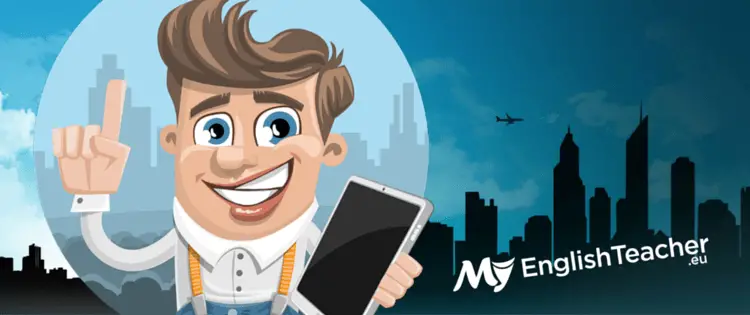
You can jump to any section of this article:
Booking a Holiday
Travelling to your destination, arriving at your destination, places to visit, describing places, asking for help.
Whether you are going on a short holiday for a few days or planning to travel around various countries for a few months, having a basic understanding of the vocabulary and phrases you might need to use for communication is quite important.
English is a widely spoken language in the majority of countries that welcome tourism, so it would be beneficial to familiarise yourself with some useful phrases before departing.
In addition, if you could find out how to say some basic phrases in the country’s native language, I’m sure the local people there would appreciate your efforts!
Basic phrases in English that you should translate and try to use in the native language of your destination:
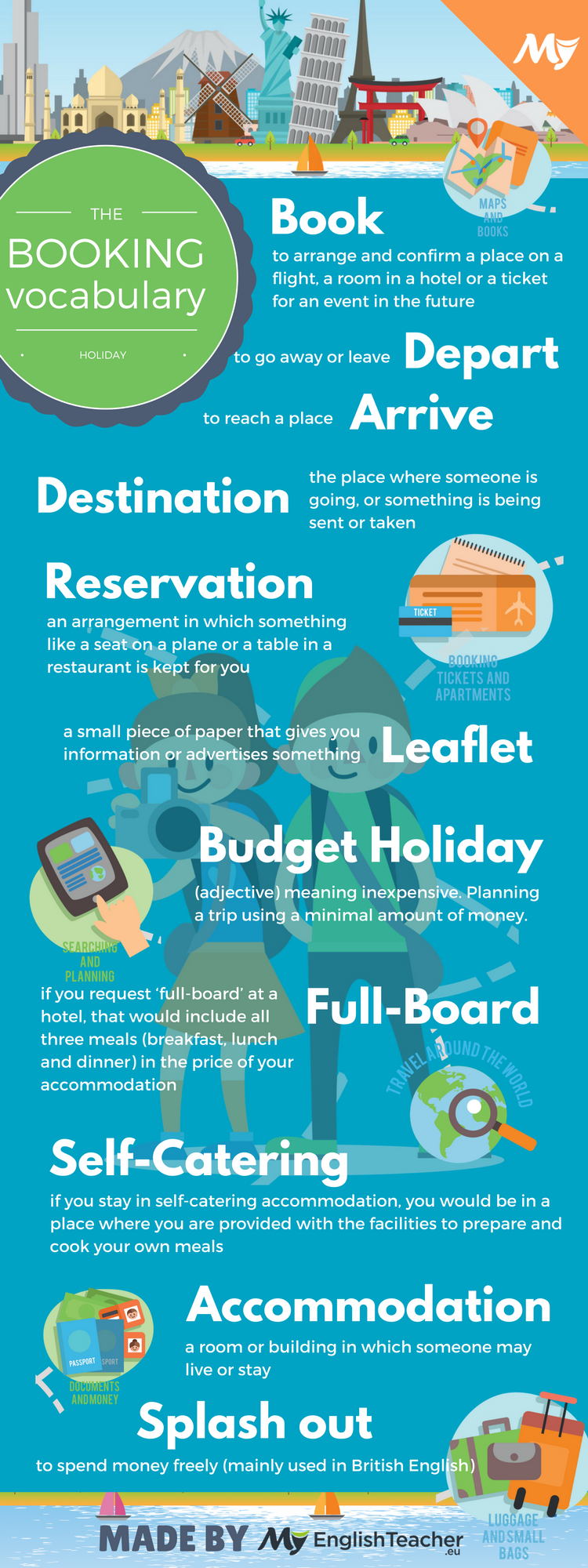
Book: as opposed to the noun (reading material), this verb means to arrange and confirm a place on a flight, a room in a hotel or a ticket for an event in the future.
Depart: to go away or leave, especially on a journey.
Arrive: to reach a place, especially at the end of a journey.
Reservation: an arrangement in which something like a seat on a plane or a table in a restaurant is kept for you.
Destination: the place where someone is going, or something is being sent or taken.
Complimentary: if tickets books or any other items are complimentary, it means they are given free, especially by a business.
All-Inclusive: Including everyone or everything. In holiday terms, this would refer to a hotel deal where the price usually includes accommodation, meals and drinks (any extra activities or facilities would be charged separately).
Travel Agency: a company or shop that makes travel arrangements for people.
Ticket: a small piece of paper or card given to someone, usually to show that they have paid for an event, journey or activity.
Brochure: a type of small magazine that contains pictures and information about a product or a company.
Leaflet: a small piece of paper that gives you information or advertises something.
Last Minute Deals: these are promotions that are advertised at the latest possible time for those who are more spontaneous!
Promotion: publicising a product to increase sales or public awareness.
Package Deal: an offer or agreement involving a number of related items or the acceptance of one being dependent on acceptance of another.
Half-Board: if you request ‘half-board’ at a hotel, breakfast and dinner would be included in the hotel price (as part of the package).
Full-Board: if you request ‘full-board’ at a hotel, that would include all three meals (breakfast, lunch and dinner) in the price of your accommodation.
Self-Catering: if you stay in self-catering accommodation, you would be in a place where you are provided with the facilities to prepare and cook your own meals.
Accommodation: a room or building in which someone may live or stay. Different types of accommodation include apartments, hotels, guesthouses and backpacking hostels.
Vacation: the American term for ‘holiday’.
Camping: the activity of spending a holiday (vacation) living in a tent or campervan.
Backpacking: to travel or hike carrying one’s belongings in a backpack.
Transfer: the act of moving someone or something from one place to another.
Budget Holiday: (adjective) meaning inexpensive. Planning a trip using a minimal amount of money. (Budget – noun) Having a limited amount of money for expenditure:
- ‘We have to keep within the household budget).
Travel Documents: all the necessary documents you would need to take with you on a holiday i.e. passport or ID card, driving license, flight/bus/ train tickets, visa confirmation etc.
Outbound: travelling away from a particular place, usually the first half of a journey.
Inbound: travelling towards a particular place, especially when returning to the original point of departure.
Two-way, Return Ticket (UK), Round Trip (US): a ticket that allows someone to travel to a place and back again.
One-way, Single Ticket: a ticket that allows a passenger to travel only to his/her destination, without returning.
Transport: (verb trans-PORT ) to take or carry goods or people from one place to another. (noun TRANS-port ) A system or means of conveying people or goods from place to place by means of a vehicle, aircraft or ship.
Splash out: a phrasal verb (mainly used in British English) meaning to spend money freely
Please enable JavaScript

Sample Conversation about Booking a Holiday: Travel Agent = TA, Customer = C
TA: Good afternoon madam, how can I help you today? C: Good afternoon, I would like to book a trip to Italy for 2 people and a 6 year old child please.
TA: Is there anywhere in particular you would like to go? C: I can’t decide between Venice or Rome, whichever is cheaper as we’re on a budget this year!
TA: Okay, and when would you like to go? C: We have two weeks of holiday between 18 th June and 2 nd July, and we’d like to go for at least 10 days during that period.
TA: No problem, I’ll just check to see which destination would be cheaper…. We have a special promotion on at the moment, if you book a package deal to Venice, you get free transfer to and from your hotel to the airport, plus one free meal each day. Would you be interested in that? C: Yes, that sounds great!
TA: And would you like full-board or half-board ? C: Well, seeing as we will get one free meal each anyway, I think self-catering would be better. I’ll have a little bit of extra money to splash out in a nice restaurant somewhere!
TA: Okay, that’s fine. We have a hotel that offers self-catering facilities and is right in the centre of Rome. They also have special facilities for children such as meal deals, extra beds, a play area in the lobby and a crèche. C: Perfect! I won’t need to spend too much money on transport and our son will surely have fun too!
TA: Exactly. Your outbound flight will be on the 19 th June, departing from London Gatwick Airport at 11:30am , and your return flight will be on the 30 th June at 10:30pm. That gives you 11 and a half days in Rome, does that suit you? C: Yes, that’s excellent, and we’ll still have a couple of days to recover before going back to work! How much will that be?
TA: Well, the promotion is £200 per adult, and your child can go for free because he is under 8 years old. That includes the return flights , accommodation for 11 nights, airport transfer and a complimentary meal each per day. Shall we go ahead and book it ? C: Wow, that is a fabulous deal! Yes please.
TA: Okay. How would you like to pay? C: Credit card please. Here you go.
TA: Thank you. Could I also see your passports please? C: Sure, here you go.
TA: Thank you. Here are your tickets and everything else you’ll need to know about your package holiday. Remember to keep all your travel documents safe throughout the whole trip. C: Thank you so much for your help!
TA: You’re welcome. Enjoy the rest of your day and please contact us if you have any queries before you set off on your holiday !
Recommended for you: Spa Fitness Gym Workout Massage Vocabulary and Dialogs Formal and Informal Email Phrases Starting with Greetings
NEXT: Packing Vocabulary
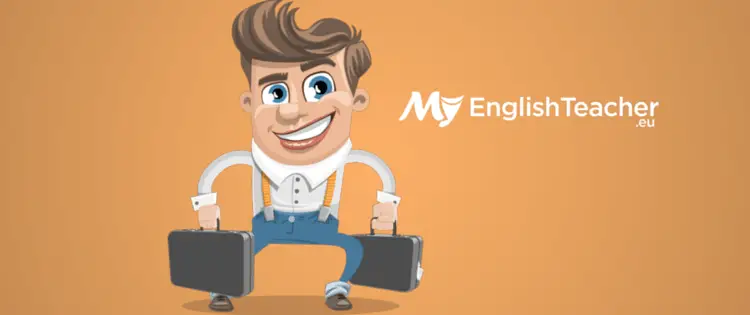
Suitcase: a case with a handle and hinged lid, used for carrying clothes and other personal possessions.
Backpack (US), Rucksack (UK): a bag with shoulder straps that allow it to be carried on one’s back.
Currency: a system of money in general use in a particular country.
Appropriate Clothing: suitable or fitting for a particular purpose, person or occasion.
Seasonal: relating to a particular season of the year (Autumn, Winter, Spring or Summer).
Swimwear, Bikini: clothing worn for swimming (bikinis are specifically for women).
Fanny Pack (US), Bum Bag (UK): a small bag used to safely store small valuable items when on holiday. This is usually worn around the waist and can be concealed under one’s clothing.
Sample Conversation about Packing:
A: Sarah, I’ve managed to book the flights and the train tickets for our vacation to Switzerland! B: Wow, that’s so exciting! So, are we leaving next month on the date we wanted?
A: No, we’re leaving next week! The travel agency gave us a great package deal and we’ve saved a lot of money, but it meant changing the dates to go earlier. We don’t have to work anyway, so I thought it would be nice! B: Oh, I see! Okay, that means we’ll have to start packing very soon. What will the weather be like?
A: Well, it’ll be spring but we’re going for 3 weeks, so I would say it’s safer to take clothing for hot and cold weather. We’ll probably go skiing too, so let’s pack our snow gear . B: Sure. I’m going to pack a few bikinis too, just in case we find a small beach!
A: It might be easier to take our backpacks , as we can fit more into them. B: I agree, they’re a lot bigger than the suitcases . Have you got all our travel documents together?
A: I just need to print off the flight confirmation details and the train tickets . B: Great. I’ll get some dollars exchanged to Swiss franc for the first few days. A: Okay, so you’re in charge of getting the currency sorted and I’ll keep all the travel documents together. Now, let’s start packing!
Recommended for you: Cooking / At the Restaurant Vocabulary and Dialogs Vacation vs Holiday in English! Travel, Trip, Journey, Tour, Voyage, Cruise, Crossing, Excursion, Expedition, Flight
NEXT: Traveling to your destination

Check-In: the act of reporting one’s presence and registering, typically at an airport or hotel.
Departure Gate: gate where passengers embark.
Airport Terminal: this is a building at an airport, where passengers transfer between ground transportation and the facilities that allow them to board or disembark from an aircraft.
Departure Lounge: a seating area in an airport where passengers wait to board an aircraft or vehicle.
Duty-Free: Items available for purchase that are free of duty or tax charges in a particular country, generally sold at airports.
Ferry: a boat or ship for conveying passengers or goods, especially over a relatively short distance and as a regular service.
Take Off: (of an aircraft or bird) becoming airborne.
Board: to get on or into (a ship, aircraft or other vehicle).
Passport Check, Security Checkpoint: a barrier or manned entrance typically at a border of a country where travellers are subject to security checks.
Overweight: baggage weighing in excess of the allowed amount.
Destination: the place to which someone or something is going or being sent.
Window Seat: a seat positioned next to a window on a large vehicle or aircraft.
Aisle Seat : a seat positioned beside the walkway on a large vehicle or aircraft.
Sample Conversation about Checking-in at the Airport: Airport Attendant = AA, Passenger = P
AA: Next please! P: Hi. Good Afternoon.
AA: Good Afternoon sir. May I see your passport please? P: Yes, here you go.
AA: Thank you. Please place your luggage on the belt. P: (Places suitcase on the conveyor belt)
AA: I’m afraid this suitcase is 7kg overweight . You are allowed a maximum of 30kg and this suitcase weighs 37kg. You will need to remove some items or pay an additional fee for the extra weight. P: Oh no! I see. Okay, I’m happy to pay the fee.
AA: Is this your bag sir? P: Yes, of course it is.
AA: Did you pack it yourself? P: Yes.
AA: Were you given anything by someone else to take on the flight? P: No, definitely not.
AA: Do you have any of the following items in your luggage ? (points to images of dangerous objects) P: No, I’m certain.
AA: Okay, that’ll be 56 euros for the overweight case please. P: Okay, here is the right amount in cash. Also, could I please have a window seat ?
AA: I’ll just see if there is one available…. Okay, you’ll be seated in 25A. Here is your passport and boarding pass , please keep all your documents safe. Enjoy your flight. P: Thank you very much.
Recommended for you: Main differences between American and British English? Useful English Phrases For Running A Business Meeting Difference between LUGGAGE and BAGGAGE

Landing: an instance of coming or bringing something to land, either from the air or from water.
Customs: the place at a seaport, airport or frontier where officials check incoming goods, travellers or luggage.
Baggage Collection Point, Baggage Reclaim, Baggage Claim Area: an area where arriving passengers claim checked-in baggage after disembarking from an airline flight.
Nothing to Declare: exiting the airport at a gate where you state that you do not have any goods where duty is payable or that need checking whether entry into the country is permitted.
Credit Card: a small plastic card provided by a bank or company which gives you access to money that you will need to pay back within an agreed time limit.
Debit Card: a small plastic card provided by your bank which gives you access to money that you already have in your bank account.
Porter: a member of staff in a hotel who assists guests with carrying their luggage.
Alarm: something to help you wake up at an appropriate time, this could be a sound notification on your smartphone or a telephone call from staff if you are staying in a hotel.
Room Service: requesting food, drinks or other services to be delivered to your hotel room.
Sample Conversation about Checking-in at the Hotel: Hotel Receptionist = HR, Guest = G, Porter = P
P: Good morning Sir, welcome to The Royal Pavilion Hotel. May I take your bags please? G: Oh, that’s very kind of you! Thank you. I am quite tired after that journey.
P: Please follow me this way to the check-in desk. HR: Good morning Sir, do you have a reservation ?
G: Yes, I booked online. HR: Which name was it booked in?
G: Mr. Graham Watts HR: Yes, I have it here. Could I see the credit card you paid with please?
G: Yes, here you go. HR: Thank you. Would you like an alarm call to wake you up?
G: Yes please. If you could call me around 11am, that’d be great. I would like to rest for a few hours before my meeting. HR: No problem. The complimentary breakfast is served until 11:30 and you can call for room service at anytime.
G: I will most probably do that! Thanks. HR: Your room is number 237 on the third floor and here’s the key. Our porter will help you with your bags and show you to your room.
G: That’s wonderful, thank you. Is there a Wi-Fi connection available in my room? HR: Yes, you’ll find the password in you room beside the TV. We hope you enjoy your stay with us. P: Okay Mr. Watts, if you please come this way, I’ll show you to your room…

- Kitesurfing
- Rock Climbing
- Windsurfing
- Wakeboarding
- Paddleboarding
- Sunbathing
- Sightseeing
- Amusement Park
- Art Gallery
- Miniature Golf, Crazy Golf
- Animal Sanctuary
- National Park
- Invigorating
- Enervating
- Fascinating
- Old-Fashioned
- Picturesque
- Over-Priced
- Cosmopolitan
- Metropolitan
- Neopolitan
NEXT: Asking for help
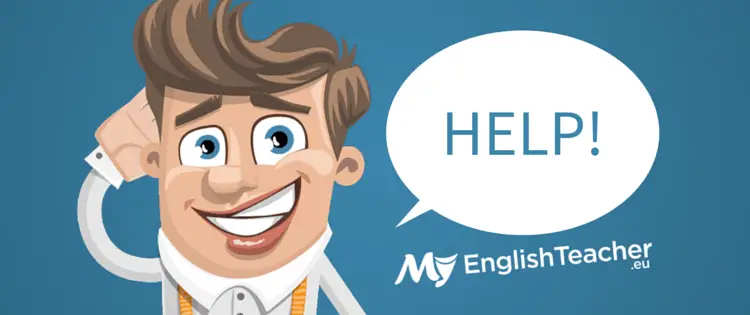
Catching someone’s attention:
- Excuse me, could I ask you a quick question please?
- Excuse me, sorry to bother you but could you help me please?
- Hello sir/miss, …
- Sorry sir/miss, …
- Excuse me, do you speak English?
Asking for information:
- You wouldn’t happen to know where … is, would you?
- I’m trying to find the …
- I need to get to the …
- How can I get to the …?
- Do you know where the … is?
- Where is the nearest …?
- I’m a little lost, where is the …?
If you miss a flight, bus, transfer, train:
- It seems I have missed my … could you please book me onto the next available one?
- I’ve missed my … is there any way of getting a refund?
- I’ve missed my … could you please give me information about the next one?
- Could you please help me to rearrange my …?
When you’re feeling unwell:
- Excuse me, is there a first aid room here?
- I feel really unwell, is there someone who can help me?
- I’m suffering from … do you have medical staff here?
- Do you have a first aid kit I could use please?
- I’ve injured my … could you please help me?
If there is something wrong with your luggage:
- My suitcase has not arrived yet, where can I get it from?
- My luggage is missing, could you help me please?
- My rucksack has been damaged, what can I do about this?
- I cannot find my suitcase, where can I check please?
Asking someone to translate:
- Could you tell me what it says on that sign please?
- Could you translate this message for me please?
- Could you please ask this person to …?
Prepositions and giving directions:
- (Turn) Right
- (Turn) Left
- Straight On
- Opposite the …
- Next to the …
- The … is on your (right, left)
- Before, After the traffic lights
- Take the first, second, third exit at the roundabout
More for you: Aviation Vocabulary ››› 19 most important words explained Difference between BEFORE and UNTIL Numbers, Years, Length, Dates in English!
RELATED ARTICLES MORE FROM AUTHOR

Historic vs Historical

Understanding the Extroverted Introvert

Your Guide: List of 30 Helpful Synonyms with Explanation and Examples

50 Creative Ways to Say Happy Birthday: My Top Picks

48 Another Word for Impo or Important

Bear Homophones Demystified: Expert Guide

I like using standard english

Such a great job to run this awsome site.

that is wonderful!
MOST POPULAR

👉 A BIG List of Prefixes and Suffixes and Their Meanings

200 Phrases for saying THANK YOU in any situation!

Formal and Informal Email Phrases – from Greetings to Closing Phrases!

Linking Words: List of Sentence Connectors in English with Examples!

80 In Conclusion Examples! + Translation

90 Names of Baby Animals and Their Parents

Talk to Strangers / Free Chat Rooms

English Level Test

6 Ways to Immediately Improve Your English Communication Skills

What does TBH mean? (TBH full form) on Facebook, Instagram, Texting

25 Ways to Say “Keep Up The Good Work” 💪 &...
Stay connected, editor picks.

Nonverbal communication definition

Difference between Alligator and Crocodile
Popular posts, popular category.
- Q&A 2437
- English Vocabulary 625
- English Vocabulary Dictionary 364
- English Grammar 200
- Synonyms 148
- Infographics 109
- Collocations 105
- Learn English 81
- English Idioms 69
- Privacy Policy
- Terms & Conditions
- 📝 VOCABULARY
- 🚀 GAMES/ACTIVITIES
Travel Words to Learn in English

Travelling is going from a place to a distant place. Movement of people is considered as travel. People travel by many vehicles such as car, bus, plane, train or ship. These are called means of transport .
⬤ Pictures of travel vocabulary with pronunciations
Here is a list of travel vocabulary in English with pictures. You can listen to the pronunciation when you click on an image. The browser you are using does not support HTML5 audio playback. Sorry.
⬤ Word list of travel vocabulary in English
- destination
- travel agent
- ticket office
- information desk
- flight attendant
⬤ Air travel vocabulary
- boarding pass
- business class
- economy class
- first-class
- emergency exits
SIMILAR PAGES: ❯❯ Holiday vocabulary ❯❯ City life vocabulary ❯❯ Transportation vocabulary ❯❯ Business English vocabulary
⬤ Flashcards exercise about travelling
Learn travel vocabulary with flashcards exercise below. There are flashcards about travel vocabulary. Guess it and open the card to see the answer.
⬤ Flip the card game about travelling
Click on a card to open it. Then you will see a random word about travelling. Guess the meaning of it in your own language.
⬤ Images of travel vocabulary to download
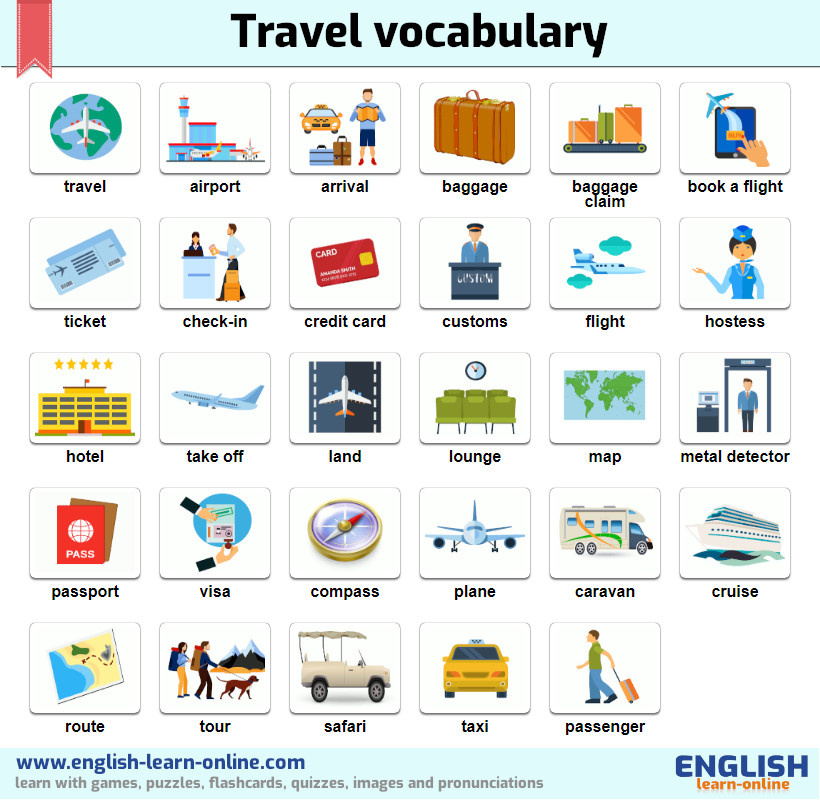
⬤ Picture quiz about travel vocabulary
Let’s check your travel vocabulary with images. Select the correct option according to the given picture. For every correct answer you get 10 points.
⬤ Listening test
This is a free listening test about travelling. First listen to the audio about travel. Then select the corresponding picture from the list.
⬤ Writing test about travel
Below is a vocabulary writing test about travel. Look at the image and write the name of the picture into the input box.
START
⬤ Spelling test about travel
Below is a vocabulary listening and spelling test about travel. Listen to the audio and then write what you hear into the input box. For every correct answer you get points.
⬤ Worksheets for travel vocabulary to download
Related pages, memory card game for travel, word scramble game for travel related words, word search puzzle for travel, make words game for travel expressions, wetman game for travel, accessories vocabulary 👓 exercises pictures audio, body parts in english 👨 with games and listed images, classroom objects vocabulary in english 📕 with games, clothes vocabulary in english 👕 learn with images and flashcards, colour names in english 🎈 with tests and images, computer parts (hardware) vocabulary: pictures audio, verb to be (am, is, are) – with examples and online exercises, modal “can” – with explanations exercises and activities, present continuous tense – with usage examples and pictures, simple present tense (do-does) – with usage, pictures and example sentences.
© www.english-learn-online.com All right reserved You can write us any mistakes or read our about page or see our privacy policy .

- Start Learning
- Free Resources
- Manage Subscriptions
- Classroom Login
Speak Like a Local: Essential Travel Vocabulary for English Students
- LLS English
- November 1, 2023
- No Comments
Are you an English student looking to travel to an English-speaking country? Or perhaps you’re already there and find yourself struggling to communicate during your museum tours or other travel activities. Fear not, for we have the perfect solution for you – Travel Vocabulary! In this blog post, we’ll provide you with a list of essential words and phrases that will help you speak like a local and navigate through your travels with ease.
Whether you’re asking for directions, ordering food, or simply trying to strike up a conversation with a local, these travel vocabulary words will come in handy and make your trip a more enjoyable experience. So let’s get started and take your English skills to the next level!
Basic Words Every Traveler Should Know
Are you ready to start your journey into the world of English travel vocabulary? In this section, we’ll provide you with a list of basic words that every traveler should know before setting foot in an English-speaking country. These words will serve as a strong foundation for your language skills and will help you navigate through various travel situations with ease.
First up, let’s talk about directions. Knowing how to ask for directions is essential when you’re in a new place. Familiarize yourself with words like “left,” “right,” “straight,” and “turn.” Combine these words with phrases like “Excuse me, can you tell me how to get to…” or “Which way is…?” to confidently find your way around.
Next, let’s cover food. Food is a universal language, and knowing the basic vocabulary related to ordering food can make your dining experience much more enjoyable. Learn words like “menu,” “bill,” “water,” “coffee,” and “vegetarian” to ensure you can communicate your preferences to the waiter or waitress.
Lastly, make sure you have some essential phrases for general communication. Words like “hello,” “goodbye,” “thank you,” and “sorry” are the building blocks of polite conversation. Adding phrases like “I don’t understand” or “Can you repeat that, please?” will also come in handy when you’re faced with a language barrier.
By familiarizing yourself with these basic words and phrases, you’ll be well-prepared to navigate your way through any English-speaking country. So get practicing and soon you’ll be speaking like a local!
How To Ask Questions Professionally

Useful Phrases at the Museum and Tours
Now that you have a strong foundation of basic travel vocabulary, let’s focus on specific phrases that will come in handy when visiting museums and going on tours. These situations can be overwhelming, especially if you’re trying to fully understand the historical or cultural significance of what you’re seeing. But fear not, with these useful phrases, you’ll be able to confidently communicate and get the most out of your museum visits and tours.
When visiting a museum, it’s important to be able to ask questions and seek information. Phrases like “Excuse me, can you tell me more about this exhibit?” or “Could you explain the significance of this artwork?” will show your genuine interest and help you gain a deeper understanding. Additionally, you may want to inquire about the availability of guided tours or audio guides to enhance your experience.
During guided tours, it’s crucial to be an active participant. Phrases like “Could you please repeat that?” or “I didn’t quite catch what you said about…” will ensure that you don’t miss out on any important details. You can also engage with the tour guide by asking questions like “Do you have any recommendations for other museums to visit in the area?” or “What is your favorite part of this museum?”
By using these phrases, you’ll not only communicate with confidence but also make the most out of your museum visits and tours. So go ahead and practice them before your next adventure, and watch as your English skills open doors to a world of knowledge and cultural understanding.
How to Cancel a Meeting Professionally

Survival Phrases & Essential Terms
Traveling in an English-speaking country can be an exciting and enriching experience, but it can also present challenges when it comes to everyday situations. That’s why it’s important to equip yourself with survival phrases that will help you navigate through these situations with ease.
In this section, we’ll provide you with a list of essential terms that will come in handy in everyday situations in English-speaking countries. Whether you’re at the grocery store, the post office, or simply interacting with locals, these phrases will ensure that you can effectively communicate your needs and understand what others are saying to you.
First and foremost, it’s crucial to be able to ask for help when you need it. Phrases like “Excuse me, could you please help me?” or “I’m lost, can you point me in the right direction?” will ensure that you can get assistance when necessary.
Additionally, knowing how to handle transactions is essential. Phrases like “How much does this cost?” or “Can I pay with a credit card?” will help you navigate through the process of buying goods or services. In social situations, it’s important to be able to make small talk and show politeness. Phrases like “Nice to meet you” or “How are you today?” will help you strike up conversations and build connections with the locals.
By familiarizing yourself with these essential terms, you’ll be well-prepared to handle everyday situations in English-speaking countries. So go ahead and practice them, and get ready to navigate through your travels with confidence!

Travel Vocabulary & Typical Conversations
When traveling in an English-speaking country, you’re bound to have various conversations with locals. To help you navigate these situations with ease, here are some practical dialogues that you might find yourself having:
1. Ordering Food: Imagine yourself in a cozy cafe, ready to enjoy a delicious meal. Use phrases like “Could I have the fish and chips, please?” or “Do you have any vegetarian options?” to communicate your preferences to the waiter or waitress.
2. Asking for Directions: Picture yourself wandering through the bustling streets of a new city. Approach someone and ask, “Excuse me, could you tell me how to get to the nearest train station?” or “Which way is the famous landmark?” These questions will ensure you reach your destination without getting lost.
3. Making Small Talk: Imagine meeting friendly locals who want to engage in conversation. Respond with phrases like “What do you recommend I visit in this city?” or “Have you tried any traditional dishes I should try?” These questions will not only help you connect with the locals but also enhance your cultural experience.
4. Seeking Help : Whether you’re in need of assistance or facing an emergency, it’s essential to know how to ask for help. Use phrases like “I’m lost, can you help me find my way back to the hotel?” or “Is there a hospital nearby?” These phrases will ensure that you can get the help you need in any situation.
By practicing these practical dialogues, you’ll be prepared for any conversation you might have while traveling in an English-speaking country. So get ready to confidently communicate with locals and make your travel experience even more enjoyable!
Travel Words to Learn in English
Reinforcing Your New Travel Vocabulary
Now that you have learned a variety of essential travel vocabulary for English students, it’s time to reinforce what you’ve learned and ensure that it sticks with you. Remember, practice makes perfect!
One great way to reinforce your new travel vocabulary is by incorporating it into your daily life. Try using the phrases in everyday situations, such as ordering food at a local restaurant or asking for directions from a passerby. The more you use the vocabulary in real-life scenarios, the more comfortable and confident you will become.
Another effective method is to engage in language exchange activities. Find a language partner or join language exchange groups where you can practice speaking English with native speakers. This will not only give you an opportunity to use your travel vocabulary in conversations, but also help you improve your overall language skills.
Additionally, take advantage of online resources and language learning apps that offer vocabulary exercises and quizzes. This will allow you to test your knowledge and identify areas where you may need further practice.
Lastly, keep a travel journal during your trips. Write down the new vocabulary words and phrases you encounter along the way, and make an effort to use them in your writing. This will reinforce your learning and provide you with a valuable reference for future trips.
By actively reinforcing your new travel vocabulary, you’ll soon find yourself speaking like a local and navigating through your travels with ease. So keep practicing and enjoy your English-speaking adventures!
Travel Vocabulary for English-Language Learners
How Learn Laugh Speak Can Help You Learn Travel Vocabulary
Learn Laugh Speak is here to help you master essential travel vocabulary for English students. With our structured lessons at levels A1, A2, B1, and B2, you can easily learn the words and phrases you need for traveling in an English-speaking country.
Our platform provides instant corrections, ensuring that you’re learning English at the right level for you. You’ll have access to 33,000 resources for reading, writing, speaking, and listening, allowing you to practice and reinforce your new travel vocabulary.
With Learn Laugh Speak, you can confidently navigate through any travel situation, whether it’s asking for directions, ordering food, or engaging in conversations with locals. Start learning with us today and unlock the world of travel with ease!

Leave a Reply Cancel reply
Your email address will not be published. Required fields are marked *
Save my name, email, and website in this browser for the next time I comment.
Sign me up for the newsletter!
LEARN LAUGH LIBRARY
Username or email address *
Password *
Remember me Log in
Lost your password?
- Student Login:

Travel Vocabulary in English with Travel Stories
Apr 27, 2016 | Advanced Vocabulary

I know you love to travel as much as do. So today I want to share some of my favorite advanced travel vocabulary in English so you can tell your own travel stories more easily.
I have 3 different travel stories for you today. In each, I’ve highlighted useful vocabulary and groups of words that often go together or collocations.
Here’s what I want you to do:
- Read the stories.
- Note the highlighted vocabulary and groups of words – can you identify the meaning from the context? (If you need help, you can use the definitions I’ve provided to help you.)
- Write your own travel story using some of the new vocabulary and expressions. You can write about a past travel experience, a business trip, a future vacation or any other travel opportunity. Then share your story in the comments.
The goal is for you to use the same keywords in your own sentences.
This is the best way for you to truly learn and remember new vocabulary. And this means the next time you talk or write about travel, you’ll have all these words available to you in your mind!
Advanced Travel Vocabulary in English with Real-Life Stories
Sharon’s travel story: a staycation on a tight budget.
When I was younger, I had a real sense of adventure . I loved backpacking, camping in the woods, sleeping in tents and spending the evening next to the campfire. As a child, I remember trying to build a fire from scratch by rubbing two sticks together. I think my entire family laughed while I worked at it for an hour. Unfortunately, I never succeeded.
But I do have such good memories of camping and hiking with my family. Every summer my parents would pack up the kids and the dog into the car, pack all our outdoor gear on the roof of the car and fill coolers full of food.
My mom would pack all the usual stuff: trail mix , fruit, marshmallows to roast over the fire , stuff to make sandwiches, etc. We’d take a road trip to the mountains in Colorado, find our spot to set up camp and pitch our tents near the river. I loved listening to the sound of the river at night!
I haven’t camped for years! Neither David nor I can take that much time off of work. It makes me a little sad that Sophie, our daughter, won’t have those same memories.
But last year we did do something a little fun, a little different: we had a staycation . The two of us could only get 4 days off of work and we were on a tight budget . We hadn’t enjoyed everything the city has to offer for ages so we decided to just pretend to be on vacation here at home. We visited the museums, went to the theater, we even took a day trip to the coast a few hours away for a day of sun, sand, and surf.
We have some wonderful photos (and memories) of our picnic dinner watching the sunset on the beach.
sense of adventure
The desire to explore and to take advantage of adventurous opportunities.
outdoor gear
Generally used to describe items or equipment needed for outdoor recreation: tents, skis, bicycles, snowboards, etc.
set up camp
To prepare and position everything in a campsite.
from scratch
To make (or create) from the beginning with the basic ingredients.
A snack mix with a combination with dried fruit, grains, and/or nuts.
The combination of stay-at-home and vacation. A vacation where you stay at home and enjoy local sites.
pack up (the kids/the car)
To prepare one’s belongings; to gather one’s things together and prepare to depart. With “the kids” this refers to prepare the kids and their belongings for departure.
roast over the fire
To cook over the fire.
on a (tight) budget
To be on a budget means to not have a lot of extra money. A “tight” budget means very little extra money.
Lara’s Travel Story: Anything All-Inclusive
Ugh! I hate planning vacations. I mean, I do love traveling but I don’t want to think about it. All those little details – I can’t be bothered !
I prefer those all-inclusive kinds of vacations for a little R&R . You know, those places where all you do is show up and that’s it.
You have breakfast, lunch, and dinner. Activities, the beach, the pools, dancing. Sure, they usually cost a little more but if I don’t have to plan everything then it’s worth it. The only thing is you have to be careful of those hidden extras ! I’ve definitely been surprised by the final bill a few times.
My fiancé and I are talking about an all-inclusive cruise for our honeymoon. It sounds amazing but I’ve never been on a ship for that long.
can't be bothered
Don’t want to waste time doing something.
all you do is show up
Show up = to arrive for an appointment or gathering. “All you have to do is …” means that there is nothing else expected of you.
An exaggerated way to say, “a lot of.”
all-inclusive
(Almost) all activities and food are included in the total cost.
hidden extras
Expenses that are not included (or unexpected) in the final cost.
The services or perks that a hotel provides with the reserved room.
a little R&R
A little r est and r elaxation.
island-hopping
To visit one island after another.
To pack too much.
Jean-Luc’s Travel Story: Exotic Adventure
I’m always dreaming of my next far-off, exotic destination . I’ll go anywhere as long as it’s adventurous.
Last year I chartered a boat with a friend to sail around the Greek Islands. In the afternoons, we’d pull into ports , dive into the water, enjoy dinner on the beach and then head back to the boat for the night. On really warm nights we actually sleep right on the deck under the stars .
What’s next? I don’t know. Maybe Colombia, Peru, or Chile? I’ve never been to South America and I love the idea of spending time in the Andes Mountains. Hiking in the middle of nowhere , you know what I mean?
Those kinds of places give you such a better perspective on life . It’s easy to forget we’re all just a tiny piece of this earth.
Or maybe Thailand? That’s another of my bucket list destinations.
far-off destination
A destination remote (in time or space).
To return to a place.
perspective on life
A particular attitude toward or belief about something; a point of view.
charter a boat
The reservation of a plane, boat, or bus for private use.
under the stars
To be outside with no covering.
bucket list
The achievements or experiences a person hopes to have or accomplish in their life.
pull into port
The place where a vehicle or driver stops into. In this case, a boat stops in a port.
middle of nowhere
A remote place far from any city, town, or village.
Now I’d love to hear your travel story!
Practice and build your vocabulary by sharing your own travel story in the comments below!
Using the vocabulary from the stories above, describe your favorite travel experience or tell me about a trip you’d like to take in the future.
Don’t forget to read and comment on stories from other Confident English readers. You might learn something new or have an interesting question to ask.
Happy travels!
~ Annemarie
Get the Confidence to Say What You Want in English
Follow my 3-step solution to speak English with clarity, fluency, and freedom so you can say what you want with confidence.
You'll also get my Confident English lessons delivered by email every Wednesday and occasional information about available courses. You can unsubscribe any time.
More Like This

Better Ways to Say Yes, No, Maybe, and I Can’t in English
At its best, saying “maybe” to an invitation is awkward. It might sound like you don’t want to go. And at its worst, it can sound rude. Are there better ways to say yes, no, maybe, or I can’t in English? Absolutely. Here’s how to accept and decline invitations + requests in English.

5 Smart Questions to Ask in an English Job Interview
It’s the last question in your job interview in English and you hear: Do you have any questions for me? What should you say? Is it okay to ask a question in a job interview? Find out exactly what you should do plus 5 smart questions to ask.

How to Disagree in English Politely
Want to say “I disagree” without creating tension in the conversation? Master the art of disagreement in this lesson on, “How to Disagree in English Politely.”

#310: The Right Grammar for English Introductions
Get your English introductions just right with this step-by-step video on Grammar for English Introductions when you’re meeting someone new.

#309: How to Go Off Topic in English | English Conversation Skills
Learn how to gracefully go off topic in English without losing your audience. Whether you’re in a meeting or chatting with friends, in this lesson we dive deep into the art of smoothly navigating tangents while enhancing your English conversation skills.
![travelling words in english #308: How to Use ‘Though’ in English [+ FREE Worksheet]](https://www.speakconfidentenglish.com/wp-content/uploads/2024/04/How-to-Use-Though-in-English-400x250.png)
#308: How to Use ‘Though’ in English [+ FREE Worksheet]
Learn and practice how to correctly use though, although, even though, and as thought in your English conversations.
© Copyright 2014-2024 Speak Confident English | Privacy Policy | Terms & Disclaimer | Online Class Policies
Thank you for this lesson ,Annemarie ,
Very useful to me and as complete as possible
There is a typo. The last line should be a bucket list for not of.
Good eyes, Harsha, and thank you. We’ve corrected the sentence.
Dear Annemarie, Am new to this site and blog .AM very thank ful to you for sharing all these good phrases and vocabularies which helped a lot . looking forward for great lessons .Your videos are so good which helped me alot to get the correct pronunciation and also i have seen you are reading all the comments and giving a positive feedback which is so appreciated am looking forward for your comment. I have read and seen lot of english leaning sites but they usually wont reply to the comments . thanks Neetha
I’m very happy to hear you’re enjoying the Speak Confident English website and the lessons we have here. We definitely work hard to create lessons that will truly help you advance your English skills. And yes, my team and I definitely read all the comments and respond. 🙂
Hi Annamarie,
Thanks so much for this lesson. I have an advanced student and new vocabulary is always helpful.
I live in Chile, so if you need any tips or recommendations, plesase let me know, I would be happy to help you out if you are still planning to visit South America,
Awesome! I’m so glad this lesson was helpful to use with your student. And I’d LOVE to visit Chile one day. I’ll definitely ask you for recommendations if I get the opportunity. 🙂
Wow, Your have shared here such an amazing and best post which is useful for all of us. I like it and wanna say that your travel story is really fantastic and know I want to bookbus for visiting NY after reading your post.
Hi Ammy, thanks so much. I’m glad to know enjoyed and felt inspired by the lesson.
Dear Annemarie I’ve been to Iceland two years ago and I had a wonderful vacation! As Sharon, I had a real sense of adventure so I convinced my best friend to come with me, we packed up our backpacks and then we departed. We chartered a car and we traveled all over the country for 11 days. We saw amazing landscapes, waterfalls, geyser, volcanos, glaciers, and we did whale watching. We had nothing but our backpack, our tent and a burning desire to explore. Iceland is a great place. I look forward to come back there and have one more … Read more »
Sounds like an amazing opportunity and adventure, Davide! Thanks for sharing. I’ve always wanted to visit Iceland. I really liked your use of “a burning desire to explore.” What a great expression!
Hi Annamarie, my last trip was in the city of Madrid. A wonderful city. At the time I was always without money because of I was unemployed but in the same time I craved traveling. So my sense of adventure took me to packed up my stuff buying an airline one-way ticket for Madrid. After few days in Madrid I found a job just in the week ends. I didn’t waste my time because there’s no time like present and every day I walked through the parks , visited museums and, I always looked around the city, the square, I … Read more »
Hello Annemarie I’m from Thailand. I just learned your lesson. It was very useful. I have to say that I really like your blog, especially this topic because I love traveling. So today I have my travel story to share with you. Last month, I went to Phuket, which is an island in Thailand. I’ve already been there two or three times actually but I couldn’t get enough of it. Somebody even calls me an “island queen” and yes I truly am. I got a chance to do some diving and island hopping with one-meter-high waves. And of course, I … Read more »
Dear Annemarie , I love these adventaures and I love going and having a trips with my friends and my family,Ande mountains I love pack packing that is my adore and I did it before with my family in sinai we climbed the mountains of sinia I loved it because the sunset seen was wonderful and we took exactly 6 hours with the tour guide and we had a rest so I wish to make a trip like me in sinia with your family or you friends Egypt is wondeful Thank you
Dear Annemarie , I really enjoyed reading Sharon’s Travel Story” A Staycation on a Tight Budget ” , it has little details which helped me in imagining the story , I felt every line in the story and how enjoyable was the trip . In addition I’ve learned many expressions like : – sense of adventure – outdoor gear – set up camp – from scratch – trail mix – stay cation – pack up – roast over the fire – on a tight budget Waiting for more ….. 🙂
Hello Rana,
Thank you for your comments. I’m so glad to know that you enjoyed this lesson and found some useful vocabulary. I hope you have the opportunity to use that vocabulary soon.
Hi Ms Annemarie! I loved this story about travel it have lots of adventures, i also loved your interesting language, and i`ve learned more vocabulary from you. I wish you more success on your project.
Hello Renad,
Thank you. I’m happy you enjoyed this lesson and I hope you’ll have the opportunity to use the vocabulary you learned. Learning + immediately practicing is the best way to improve your vocabulary knowledge.
Dear Annemarie thanks for this beautiful stories , it’s very useful and i have loved them so much. the most beautiful one is the “Jean-Luc’s Travel Story: Exotic Adventure” it’s really simple , understandable, meaningful and exciting . the most expression i had loved it in this story is “under the stars”. i hope you can do more than this , by the way you can make this stories like in an audio track or on a cd , it will be more helpful and skillful to the students who are get bored from reading stories. great job hope to … Read more »
Hello Arwa,
Thank you for your comments and suggestions. I’m glad you enjoyed the lesson and learned some useful vocabulary.
Hi Annemarie , I really enjoyed getting to read your story about jean ,also i liked your language so much it was so helpful , although i love reading adventurous stories. I wish you every success on your projects, I will continue following and sharing them on social networks. yours, ahmed
Thank you for the kind comments, Ahmed. I’m glad you enjoyed the lesson.
Dear Ms Annemarie, I’ve read your story “Lara’s Travel Story: Anything All-Inclusive”. And I learned so much new vocabulary expressions such as; – can’t be bothered -all you do is show up -a ton of -all-inclusive -hidden extras -amenities -a little R&R -island-hopping -over pack I liked the idea of it, it is creative and simple. And I’m waiting for another one, and looking forward to reading your next stories. Every good story you get here in this website and upload it gives you a push froward to reach your goal, so I advice you to complete uploading stories alike … Read more »
Thank for sharing your thoughts, Bishoy. I appreciate them and I’m glad you learned so much useful vocabulary.
Dear Annemarie My name is Abdullah, i am a student in the 8th grade. I am from Egypt. It’s the first time to read stories with this exciting an I would be so glade to read more for your stories. At first, my teacher in the school told us to read it as a homework and Summarizes, but now I would to read more from you. best wishes , abdullah
Hello Abdullah,
Wonderful. I’m glad this lesson was interesting for you and I hope you’ll continue to find useful lessons on this website.
Hi , I like this type of stories , I’ve learned new vocabulary and new phrases . This type of stories make me excited to continue reading and choosing another one.
Hello Ahmed,
I’m so glad you enjoyed this lesson and that it makes you want to continue reading. Thank you.
I’m really very thankful to you because travel stories helped me so much in teaching my students new vocabulary about journeys . Hope to find more and more in future lessons
Hello Antar,
Thank you for the comment. I’m very happy to know this has been helpful to you in your classroom and with your students.
Hi Annemarie , Thanks a lot for sharing this post on travel stories. Actually my English not well but I can understand at all, I really like that it help me improve my English as well. Thanks again 🙂
Thanks for your comment, Sakuta. I’m happy that you enjoyed this lesson and have learned some new vocabulary!
Hi Annemarie, First of all, thank you very much for sharing this post on travel stories. I have been following your weekly posts since a couple of weeks, I like this post a lot, it is always exciting listening and talking of travel stories. Sharon’s staycation story resonates well with me as I like going out with family even if it is not such a significant or a popular place to go visit. The feel of going out together and experience the joy of spending time with family outside is worth experiencing and treasure the memories. Unfortunately, we couldn’t go … Read more »
Hello Hari,
Thank you so much for your comments. I’m thrilled to have you following my Confident English lessons.
Very impressive vocabulary with your sentence, “Sharon’s staycation story resonates well with me…” Nicely said.
This was very well written and you did a great job using vocabulary from the lesson.
Hey AnneMarie to be honest the traveling now is the most important thing in my life, I sounds good when i travel abroad and discouvir a new places, traditions, cultures, countries. I love that !! when I’m thinking of my next trip I be happy for searching for a cheap fly and think in all little details (hotels, food , bus from airoprot to the city centre then to hotel, mesuems, things to do in that city) so for the me the word of cant be bothered doesnt exist in this kind of things. and i dont like all inclusive … Read more »
Hello Alami,
Thank you for sharing about your travel preferences. Your love of travel is like many of us here. 🙂 As you described, I think planning a vacation can be fun, almost as fun as the vacation.
Do you have a favorite country or place that you like to visit? Best, Annemarie
Mahmoud on May 06.05.2016 Hi Annmarie As this is my first challenge I hope that you like it and that it’s good. On Last May and during a party I won a two hotel full board nights pouch for two in Aqaba_Jordan. Me and my wife were very existed and started to plan for when,how and what kind of activities we can do in Aqaba while staying there, off course budget wise it was affordable due to the pouch, First of all we picked the right weekend to do so, and then I rented a car. Meanwhile, using the net … Read more »
Hello Mahmoud,
Welcome and thank you for sharing your story!
How wonderful to win an all-inclusive two-day trip to Aqaba! It sounds wonderful. And Petra! I have always wanted to visit Petra! And was this the first time you or your wife scuba dived? How was it?
A few small corrections: “… I won a [full-board two-night hotel stay …]” “My wife and [I] were very [excited] …”
It sounds like the perfect two-day quick trip to get away! Thanks again for sharing. ~ annemarie
Hello Annemarie! Fortunately, I have some free time to accomplish the task and to tell about my vacations. A new trip always means that I will open something new. I always have a sense of adventure when taking some journey, so I always look forward to my holidays and therefore to travelling. It doesn’t matter what kind of holidays I’m going to take, the main thing is what emotions I will have. It may be a camping where I can spend wonderful time roasting meat over the fire, singing campfire songs, eating some trail mix and chatting with my friends … Read more »
Hello Alexandra – I loved this! You used so many of the key words and expressions! Fantastic work. And I really like the expression: “… if I’m squeezed like a lemon …” I assume that means to feel really stressed, is that correct? What a perfect description for feeling stressed and needing a break! One question, when you say “the main thing is what emotions I will have” do you mean emotions or experiences? When I see emotions, I think of happy, sad, angry, frustrated, joyful, etc. If that is what you mean, that is okay but I wanted to … Read more »
Thanks a lot for your comments, Annemarie! I appreciate them greatly!!! Frankly speaking I’ve thought that the expression “to be squeezed like a lemon” (that really means “to be very tired and stressed” as you have said) really exists in English, because I leart it at university, but now I doubt… Do native speakers use it in their speech? As for the phrase “the main thing is what emotions I will have”, I’ve meant here that I always get some positive emotions after having travelled, because travelling enriches me, gives the opportunity to meet new people, to get to know … Read more »
Hello Alexandra,
You are so welcome.
As for “to be squeezed like a lemon” it is possible that it is an idiomatic expression. Idioms can be regional, so it is possible that it is used in another country or a specific region. For me it was new, but I understood what you meant. It was easy to understand from the context. I’ll have to do some research to see if I can find where they use it. 🙂
Best, Annemarie
Thank you, Annemarie!
Hello Annemarie! I miss our challenge and such short stories :)) I will tell you about my nearest travel just in a few days – from Saint-Petersburg to Helsinki by bus. If my budget not so tight, I would prefer the train because it is faster and more comfortable, but I am going to spend two nights in a bus… awesome! It is a business trip just for one day and I will have a lot of free time in the city. So, I hope weather will be well and I have pleasure of the walking and sitting near the … Read more »
Hello Yulia, I miss our daily challenges too!! It makes me excited for the June challenge. And how fun to go to Helsinki for work! It sounds like you have some good plans for your free time there – the idea of coffee and a sandwich by the sea sounds perfect. A few things: “If my budget [wasn’t] so tight …” — we need to have a verb. ” …spend two nights [on] a bus.” Prepositions are so tricky. We can say “in a car” or “in a truck” but for larger vehicles we say “on a bus,” “on a … Read more »
Hello Annemarie! I missed your reply on my travel story. Thank you very much for your comments and correction of my text. As you already know, my trip was success and also I had extra practice in English. And weather was really amazing! The local people jocked that we have a chance to get very unusual gift from Helsinki – a sunburn!
A sunburn in Helsinki! That is the first time I’ve ever heard about that! 🙂
I’m so glad it was a successful trip, Yulia. It really made me happy to hear about your experience! ~ annemarie
Everybody loves traveling and I’m not an exception! There is no point in choosing the best way of traveling, all of them are good to get new impressions, to relax and to reload your mind. As a rule it’s me who arranges family vacation from scratch. The choice of vacation depends on a budjet, on a season and its length. Especially I love short holidays for 3-4 days because they are so dynamic, full of events; it’s really a great short break in a busy life. We usually stay at small private hotels without many amenities but with picturesque views … Read more »
This sounds like the perfect long weekend, Olga! Especially now that spring is starting, I’m dreaming of an easy 3-4 day trip on the countryside. Do you enjoy the planning for vacations or is it stressful for you?
Perfect use of: from scratch, without many amenities, not any hidden extras.
A few changes for articles: “…it’s me who arranges [the] family vacation” “…on [the] season and its length.” “… [a] friendly atmosphere.”
I hope you get to go on a vacation like this soon! 🙂 ~ Annemarie
Hello, I am Rafif Last summer I travelled to Turkey with my family ; my husband and my four daughters, my father and mother, my sisters and brother and their own families . We were 21 persons which means different ages, different needs and expectations about vactions, and I can’t be bothered by all those details. For that I have chosen All_inclusive kind of vactions. Our choice settled on Kartepe (green park ) for a littlr R&R. They also offer breakfast, dinner and afternoon snack time and a lot of amenities like Turkish bath, ( sauna and Jacuzzi), paint ball … Read more »
Hello Rafif – great travel story! And wow, 21 people! I can imagine that packing was a problem and I love that you watched a Mr. Bean video to help. Great use of: I [couldn’t] be bothered, I [chose an] all-inclusive kind of vacation, all we [had to do was] show up, hidden extras and several more. Two corrections: There were 21 of us (instead of We were 21 persons). The final bill was acceptable [,it wasn’t that much] or [, it wasn’t that big.] I really enjoyed this and you did a great job using some of the more … Read more »
Thank you Anne marie for your comment and the correction
I love traveling, I do believe that traveling gives you a better perspective on life, it changes you. When you come back home you are a bit different! You have tons of new ideas, stories to tell! I think it is a good way to reboot all your system and we all need a little R and R after all! I remember when a child we would go to the seaside like every year. Our parents would pack up a car and all our belongings and our trip would begin. You know Ukraine is the biggest country in Europe, so … Read more »
Excellent!!!! You described your memories in that way I felt I was there!!! It’s wonderful that you love traveling and can go anywhere easily without a doubt! I think you are really interesting person to have among friends!
Thank you so much! You are adorable!:) It is always fun to travel with a great company!:)
What wonderful details, Maria! I can imagine getting up early and into the car to start a 10-hour road trip! And I love your 3 must-haves (don’t forget the ‘s’ on ‘haves’ since it’s 3). Like you, I love the idea of the seaside, the sunset, and grilling over the fire! Great use of: sense of adventure, perspective on life, a little R&R, tons of, on a tight budget and several more! A couple things: I remember when [I was] a child or I remember [as] a child, stroll [on] the beach Thanks so much for sharing this! I enjoyed … Read more »
Thank you! I do have a quick question (this is your phrase, I know:)): stroll on – is it always with “on”? Or it depends? Could you help me with this one, please? I like this word and want to use it correctly! Thank you!
Great question. Actually, it isn’t the verb (stroll) that is important. It is the noun that follows: on the beach. We can use any verb with this: jog on the beach, run on the beach, stroll on the beach, etc. Other examples: along the river, around the city. So you could say: stroll along the river, stroll around the city.
Frankly speaking, I love travelling a lot. I love spending my free time or vacation with my family and my friends! By the way, I can have a great vacation even if I’m on a tight budget. The alternative variant is to have a staycation. My city is so amazing and beautiful! There are a lot of places of interest here. I also like to go out of the city, to go to the country, for example. Love that feeling when you pack up the kids, friends, dogs into the car, pack all outdoor gear. And It goes without saying … Read more »
And here we go – well marinated meat is a must-have thing!;)
We have something in common- we both love shashlik))
Tatyana, you’ve done such a great job creating your own story and sharing your memories! Great use of: on a tight budget, staycation, pack up the kids, outdoor gear, all-inclusive. I was quite impressed with your use of prepositions and articles. There are just a couple missing: [the] outdoor gear, [an] all-inclusive. Really impressive! And I agree with you completely, with some inspiration and desire, any vacation can be magical! Thank you so much for sharing your story! ~ Annemarie
Dear Rachel, I am Tanja Kuzmanoska from Macedonia. I follow your posts and videos, but I resonate with this post the most, it came just in time. I love traveling, I have traveled places and been on interesting vacations. Recently I started a blog on traveling , the first post I wrote was in Macedonian, but few days ago I translated it in English. It is written in a different style, rather a blend of travel guide and prosaic, emotional text. I would love if you read it and give me a feedback. I send you the link below. Thank … Read more »
Thank you for your comment. How exciting that you have started a blog on traveling! I’d be happy to read it.
I do have a quick question – I wasn’t sure who Rachel was?
Thanks again for the comment. I’ll be sure to email you with any feedback on your English travel story! ~ Annemarie
Hi again Annemarie, I am so sorry I have mistaken your name for Rachel, I hope you will forgive me! Regards, Tanja
🙂 Hi Tanja, No problem. It happens. I just wasn’t sure who you meant. I’ll look forward to reading your blog later today! ~ Annemarie
Dear Tanja,
I really enjoyed getting to read your story about your hometown or where your ancestors are from. You have a gift with words. I could really get a feeling for the area. How interesting that there are only two families there now!!
Thank you for sharing your site. I hope you will continue to write! ~ Annemarie
Dear Annemarie
Thank you so much for your time to read my story, your comments mean a lot to me. I am happy that you enjoyed reading it, and I appreciate your support very much. I will certainly continue to share my stories in words and photos and you are welcome to visit my site 🙂
I wish you every success on your projects, I will continue following and sharing them on social networks!
Many thanks and all the best, Tanja
Pin It on Pinterest
You are using an outdated browser. Please upgrade your browser or activate Google Chrome Frame to improve your experience.
90 English Tourism Vocabulary Words and Phrases
English is the most common language used in the international tourism industry.
People who work in the tourism industry use it to communicate with tourists from all over the world.
If you work in tourism or hope to find a job in the industry, it helps to know the right words and phrases for this type of work.
Interacting with Customers
Greeting customers, asking customers questions , responding to questions, checking for understanding, common scenarios in tourism english, giving recommendations, giving directions , making friendly small talk, jobs in hospitality and tourism, jobs at hotels and resorts, bar and restaurant staff, jobs at travel and tourism companies, more tourism vocabulary in english, how to learn english tourism vocabulary, and one more thing....
Download: This blog post is available as a convenient and portable PDF that you can take anywhere. Click here to get a copy. (Download)

You always want to welcome customers or guests with a friendly, professional greeting :
- Good morning (before 12 p.m.)
- Good afternoon (between 12 p.m. and 5 p.m.)
- Good evening (after 5 p.m.)
- Welcome to… [company name] . My name is… [your name] .
Be sure to always use a respectful term to refer to your customers:
- Miss — Young women (under age 30)
- Ma’am — Mature women (over age 30)
- Sir — Men of all ages
For example, using these terms you can now greet customers in a very respectful way:
- Good morning, miss .
- Good afternoon, sir .
If you are working at a hotel, restaurant or tour agency, you can greet a customer and then ask them this question:
- Thousands of learner friendly videos (especially beginners)
- Handpicked, organized, and annotated by FluentU's experts
- Integrated into courses for beginners

Do you have a reservation with us?
To answer the phone, you only need one simple phrase:
Hello, you’ve reached [company name]. This is [your name]. How may I help you?
If you are working with customers in a hotel, before they go to their rooms you can say one of these phrases:
- We hope you enjoy your stay!
- Please let us know if you have any questions or comments during your stay.
You will want to make sure your customers are safe and happy while they are with you. You can do this by asking friendly and polite questions, such as:
- How are you doing this morning? (or afternoon/evening)
- Have you been having a good time?
- Is there anything else we can do to make your experience more enjoyable?
Customers will have many questions, and sometimes you will not know the answer. You may need to ask a coworker or supervisor. When this happens, you can use the following phrases:
- Interactive subtitles: click any word to see detailed examples and explanations
- Slow down or loop the tricky parts
- Show or hide subtitles
- Review words with our powerful learning engine

- I will get that information for you right away.
- That’s a great question! I will check with my supervisor and let you know.
As a guide, host or receptionist, you will need to double-check for understanding. These phrases are simple and quick ways to make sure you have understood the guest or customer:
- I heard you ask (about flights) . Is that correct?
- So, you said (you wanted to visit the ruins) , right?
- Okay, I understand that (your flight leaves at 3 PM) . Is that correct?
To ask for clarification
Your guest may use vocabulary that you are unfamiliar with. Likewise, they might have an accent that is difficult for you to understand. Here are some polite ways to ask them to repeat or clarify what they said:
- I’m sorry, I didn’t quite understand that. Can you say that again?
- Pardon my English, but I didn’t understand that. Can you say that again?
- I’m sorry, I didn’t catch that. Can you describe what you mean?
To invite your guests to ask questions
You can make all of your guests feel welcome by encouraging them to ask questions:
- Does anyone have any questions?
- Yes, sir? / Yes, ma’am? Do you have a question?
- Please feel free to raise your hand any time if you have a question.
- So, any questions?
FluentU takes authentic videos—like music videos, movie trailers, news and inspiring talks—and turns them into personalized language learning lessons.
You can try FluentU for free for 2 weeks. Check out the website or download the iOS app or Android app.
P.S. Click here to take advantage of our current sale! (Expires at the end of this month.)

Try FluentU for FREE!

When working in tourism, you might need to give directions to tourists, share recommendations for a good restaurant or attraction or make friendly conversation.
In these scenarios, you will play the part of the “guide,” but it could be any job where you interact with tourists. Practice these dialogues so you feel confident using these words and phrases in your interactions.
- Learn words in the context of sentences
- Swipe left or right to see more examples from other videos
- Go beyond just a superficial understanding

- For (authentic cuisine, family activities, etc.), I recommend…
- My favorite place is…
- Personally, I suggest…
Tourist: Excuse me, do you know a good place for ice cream?
Guide: Oh, yes. For really good ice cream, I recommend Maria’s. It’s located about six blocks from here, and it’s my favorite place. Personally, I suggest the chocolate cherry flavor. I think your family will like it.
Tourist: Great, thanks!
If you work in tourism, you will need to give directions to visitors. Here are some key phrases you might use to explain how to get somewhere:
- Go straight
- Stop at the…
- Continue until…
- Take the subway (or bus, train, etc.)
- Follow the signs for…
- At the traffic light
- At the next street (or light, block, etc.)
- In five blocks
- Near the hotel (or beach, station, etc.)
- On the main plaza
See this post for more words and phrases for giving directions:
Asking for and giving directions in English is a helpful skill, and this guide will show you the important vocabulary you need to know, with audio pronunciation included!…
- FluentU builds you up, so you can build sentences on your own
- Start with multiple-choice questions and advance through sentence building to producing your own output
- Go from understanding to speaking in a natural progression.

Tourist: Can you tell me how to get to the theater?
Guide: Sure! The theater is near the train station. You need to go straight down this street for one block. At the next street, turn left. Continue until you see a sign for the theater, in about five blocks. If you’re lost, you can follow the signs for the train station. Does that make sense?
Tourist: Yes, thank you!
Here’s a helpful video to practice basic phrases for giving directions:
Here are some phrases that you can use when you want to make friendly conversation with a guest or visitor:
- So, are you enjoying your time in (Paris) so far?
- Tell me, what is your favorite part of the city so far?
- What do you think of the (architecture, food, beach, festival, etc.) ?
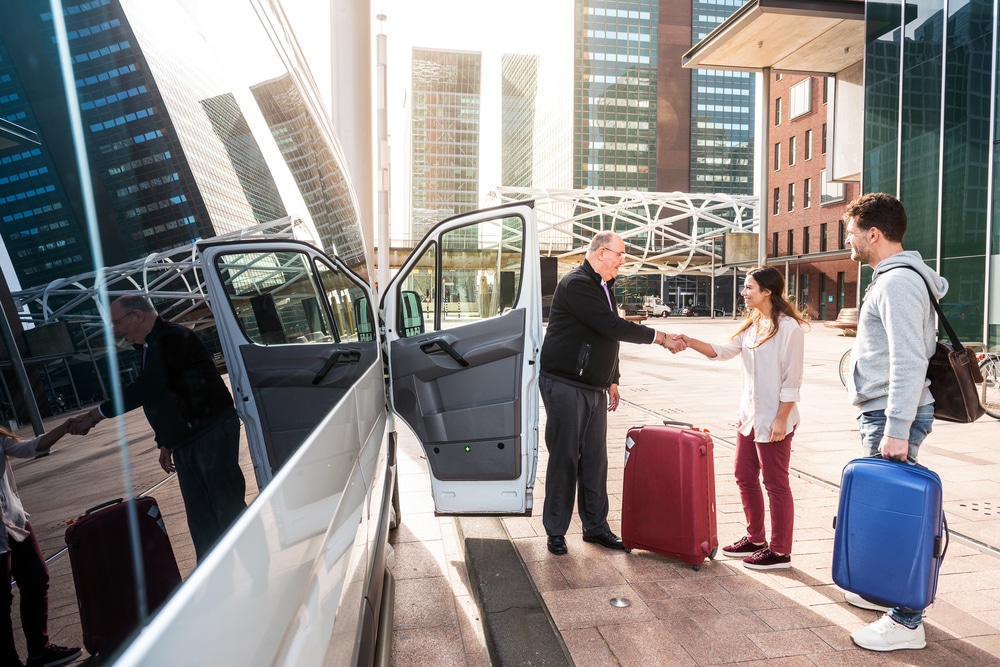
- Images, examples, video examples, and tips
- Covering all the tricky edge cases, eg.: phrases, idioms, collocations, and separable verbs
- No reliance on volunteers or open source dictionaries
- 100,000+ hours spent by FluentU's team to create and maintain

This vocabulary will help you a lot when you are working in the tourism industry or searching for jobs.
- Bellhop / baggage handler — the person who will open the front door for guests and carry their bags to their rooms
- Concierge / receptionist — the person at the front desk who welcomes the guests, gives out room keys, helps guests make reservations and takes payments for reservations
- Maid / housekeeper — the person who cleans the hotel rooms ( see English vocabulary for housekeeping here )
- Janitor — the person responsible for cleaning everything outside of hotel rooms, such as the lobby and other common areas
- Groundskeeper — the person who takes care of all the plants outside the hotel
- Maintenance worker — the person who fixes anything that stops working in the hotel
- Manager / supervisor — the person who makes sure everything goes well at the hotel, hires employees, teaches new employees how to do their jobs and makes sure that guests are happy
- Event planner — the person who makes sure the hotel is ready for big events such as business conventions (meetings) or weddings
Here are a couple of vocabulary guides for working in hotels:
Practicing English for receptionists can help you greet and assist hotel guests with ease. By studying the right phrases, you can prepare yourself to handle common…

Knowing hotel vocabulary in English is essential if you want to work in the hospitality industry. Check out our list of 100+ vocabulary words and phrases on everything…
These jobs might exist at a hotel if it has a bar and/or restaurant.
- Bartender — the person who makes and serves drinks at the bar
- Host / hostess — the person who stands at the entrance to the restaurant and welcomes guests, brings them to a table and takes reservations on the phone and in person
- Server / waiter / waitress — the person who serves customers who are eating at the restaurant (“waiter” refers to a male, “waitress” refers to a female and “server” can refer to any gender)
- Busboy / busser — the person who makes sure that tables are clean and ready for customers
- Chef / cook — the person who prepares food at the restaurant
If you work or want to work in a bar or restaurant, check out this vocabulary guide next:
Click here to learn English for restaurant staff! Here, we have information about six essential restaurant positions, the common phrases used by each one and study…
There are entire companies that exist just to help travelers book their trips. If you work for one of these companies, you will either work in an office or outside the office helping travelers enjoy their time in your city or country.
- Secretary / administrative assistant — someone who takes care of the whole office by organizing paperwork, making and receiving phone calls, organizing the office schedule and taking reservations for tours and trips
- Travel agent — someone who helps people find the most affordable flights, hotels, etc. and helps them buy tickets and make reservations before they travel
- Tour guide — someone who goes out with tourists and takes them on adventures to explore towns, cities, farms, mountains, jungles and more
- Taxi driver / private driver — someone who drives tourists in a taxi or private car between different places, and sometimes on a tour around the area
- Shuttle driver — someone who drives a large vehicle (usually a small bus or large van) to transport groups of people between places, such as from the hotel to some popular tourist destinations or between the hotel and the airport
- Airline agent — someone who works at the desk of an airline (a company that owns airplanes and provides transportation services with them)
- Flight attendant — someone who takes care of passengers on airplanes by serving food and drinks and giving safety instructions ( see English vocabulary for flight attendants here )
- Cruise attendant — someone who takes care of people on boats and ships by doing the same things as flight attendants, providing services like food and drinks and giving safety instructions
- Translator — someone who translates between different languages in writing, such as for tourism guides or flyers
- Interpreter — someone who translates between two languages by listening and speaking, often to help tourists and visitors understand and speak with local people
- Recreational guide — someone who goes with tourists to do activities like yoga, surfing, cycling, running, hiking and climbing mountains
Here is a list of common tourism-related English words. You might be asked questions with these words or you might need to use them yourself. Make sure you’re familiar with them and can use them in full sentences.
- Tourist – someone who travels to different places for enjoyment or to see new things
- Attractions — places of interest that are often visited by tourists, such as museums or amusement parks
- Landmark – a special or famous place that people can easily recognize, often used for giving directions
- Destination – a place to which people travel for leisure, business or other purposes
- Guide – a person who helps tourists by showing them around and giving them information about a place
- Guidebook – a book that provides information for travelers about a particular destination, including attractions, hotels and restaurants
- Souvenir – a small item that people buy to remember a place they visited, like a keychain or a postcard
- Itinerary – a plan or schedule that shows the activities or places someone will visit during their trip
- Accommodation – a place where travelers can stay overnight, such as a hotel, hostel or campground
- Transportation – the way people travel from one place to another, such as by car, bus, train or airplane
- Passport – a document issued by a government that proves a person’s identity and nationality, allowing them to travel internationally
- Visa – a stamp or document given by a country’s government that allows someone to enter or stay in that country for a certain period of time, usually for tourism, work, or study
- Business district — also called the financial district, this is the center of the city where many offices, banks and companies are located
- Entertainment district — a part of a city where there are lots of restaurants, bars, theaters and other fun places
- Dining district — an area within a city with a lot of restaurants
- Custom — a traditional way of doing something that is common in a particular culture or society
- Highlight — the most interesting or exciting part of something, often the main attraction
- Scenery — the natural features of an area, such as mountains, rivers or forests, that people find beautiful to look at
- Surroundings — the area or environment around a particular place, including nearby buildings, landscapes and neighborhoods
- Depart — to leave from a place, especially when traveling
- Arrive — to reach or get to a place or destination, especially when traveling
- Recommend — to suggest or advise someone to do something because you think they will enjoy it
- Read the “English for International Tourism” textbooks. They are available in low-intermediate , intermediate and high-intermediate levels. As long as you have a foundation in English, this series is perfect for learning how to communicate with coworkers and tourists in different tourism-related scenarios. Here are some more English for Tourism books we recommend.
- Take an English for Tourism course. You can find some great courses on Udemy, such as this English for Business and Tourism course aimed at low-intermediate to intermediate students. Or take lessons with a tutor who specializes in tourism on Preply .
- Complete tourism English courses on Memrise. Focus on Memrise English courses for tourism. These lessons feature English vocabulary words and phrases that anyone in the tourism industry would use in their daily activities. Try spending at least 30 minutes a day using Memrise to brush up on your tourism vocabulary—you’ll notice a difference!
- Follow travel vloggers on YouTube. Look for channels or specific videos about the place where you will be working. Engage in discussions in the comments as well! Not only will that make using YouTube more fun , but it will also require you to learn and use new words during your chats back and forth with others.
- Participate in discussions on travel forums. Travel forums allow you to use your new tourism vocabulary with native speakers and practice written English . On TripAdvisor , you can talk with English speakers about traveling, hotels, restaurants, transportation and more. The /r/travel subreddit is a great place to talk about everything related to tourism.
- Give yourself daily homework. A great place to start is the tourism section of ESL Conversation Questions . You’ll find a variety of tourism-related topics that you can discuss with your friends and coworkers. If you’re a hospitality professional, check out Oxford University Press’ free online workbook series, English for Careers .
Bookmark this page so you can come back and view this tourism vocabulary whenever you have some free time.
Soon you will be able to communicate with any tourist who crosses your path!
If you like learning English through movies and online media, you should also check out FluentU. FluentU lets you learn English from popular talk shows, catchy music videos and funny commercials , as you can see here:

If you want to watch it, the FluentU app has probably got it.
The FluentU app and website makes it really easy to watch English videos. There are captions that are interactive. That means you can tap on any word to see an image, definition, and useful examples.

FluentU lets you learn engaging content with world famous celebrities.
For example, when you tap on the word "searching," you see this:

FluentU lets you tap to look up any word.
Learn all the vocabulary in any video with quizzes. Swipe left or right to see more examples for the word you’re learning.

FluentU helps you learn fast with useful questions and multiple examples. Learn more.
The best part? FluentU remembers the vocabulary that you’re learning. It gives you extra practice with difficult words—and reminds you when it’s time to review what you’ve learned. You have a truly personalized experience.
Start using the FluentU website on your computer or tablet or, better yet, download the FluentU app from the iTunes or Google Play store. Click here to take advantage of our current sale! (Expires at the end of this month.)
Enter your e-mail address to get your free PDF!
We hate SPAM and promise to keep your email address safe


Top Travel Words to Explore the Incredible World
By: Author ESLBUZZ
Posted on Last updated: September 7, 2023
Sharing is caring!
Are you planning a trip abroad? Knowing some essential travel words and phrases in English can make your journey smoother and more enjoyable. Whether you’re traveling by plane, train, or automobile, it’s important to have a basic understanding of the vocabulary and expressions related to travel.
In this article, we’ll cover a wide range of travel-related words and phrases that can help you communicate more effectively during your trip. From airport and hotel vocabulary to transportation and directions, we’ll provide you with the essential vocabulary you need to navigate your way around a new place. We’ll also include example sentences and tables to help you better understand the context in which these words and phrases are used. So, let’s get started.
Travel Words

Travel Words: Modes of Transportation
Travel words: air travel.
Air travel has become a popular mode of transportation due to its speed and comfort. Here are some words related to air travel:
Example sentences:
- I am flying to New York tomorrow.
- The plane takes off at 9 am.
Travel Words: Land Travel
Land travel refers to traveling on the ground. It includes various modes of transportation such as cars, buses, and trains. Here are some words related to land travel:
- I usually travel by car to work.
- The train station is located in the city center.
Travel Words: Sea Travel
Sea travel refers to traveling on water. It includes various modes of transportation such as ships, boats, and ferries. Here are some words related to sea travel:
- The ship is leaving from the port at 5 pm.
- We took a boat to the island.
Travel Words: Booking and Reservations
Travel words: ticketing.
When booking a trip, you will need to purchase a ticket. Here are some words related to ticketing:
- I need to book a ticket to New York.
- What’s the fare for a one-way ticket?
- I’ve already bought my ticket, so I just need to board the plane.
Travel Words: Accommodation
When traveling, you will also need to book a place to stay. Here are some words related to accommodation:
- I made a reservation at the hotel for next week.
- What time is check-in?
- I need a single room for tonight.
Travel Words: Car Rentals
If you need a car during your trip, you can rent one. Here are some words related to car rentals:
- I need to reserve a car for next weekend.
- How many passengers can fit in the car?
- My departure time is at 10 am, so I need to return the car before then.
- What time is your arrival?
Travel Words: Navigating Your Journey
Travel words: maps and directions.
When travelling to a new place, it is essential to have a map and know how to read it. Here are some words and phrases related to maps and directions:
- Can you show me the route to the airport on the map?
- Please give me directions to the nearest train station.
- Be careful when crossing the road, watch out for traffic.
Travel Words: Signage and Symbols
Signs and symbols are essential when travelling in a foreign country. Here are some words and phrases related to signage and symbols:
- Follow the arrows to find the baggage claim area.
- The entrance to the museum is on the left.
- The warning sign indicates that the road is closed ahead.
Travel Words: At the Airport
Travel words: check-in process.
The check-in process is the first step in any air travel journey. Here are some words and phrases you might encounter during this process:
- I need to go to the check-in counter to get my boarding pass.
- I prefer to sit in an aisle seat because I like to stretch my legs.
Travel Words: Departure Lounge
The departure lounge is the area of the airport where you wait for your flight. Here are some words and phrases you might encounter during this process:
- My gate is number 12. I need to find it.
- The flight attendant was very friendly and helped me with my luggage.
- The take off was a bit bumpy, but we made it safely into the air.
Travel Words: Arrival and Baggage Claim
After your flight, you will arrive at your destination airport. Here are some words and phrases you might encounter during this process:
- I need to go through customs before I can leave the airport.
- My luggage should be at the baggage claim area. I hope it arrives soon!
Travel Words: On the Plane
Travel words: seating arrangements.
- I prefer to sit in the window seat because I like to look out at the view.
- Excuse me, can you help me find my seat? I think I’m in the middle seat.
- The overhead bins are full, so you’ll have to check your luggage.
Travel Words: In-flight Services
- Can I have a blanket and pillow, please? I’m feeling cold.
- We’re experiencing some turbulence, so please remain seated with your seatbelt fastened.
- The pilot has announced that we will be landing in approximately 10 minutes.
- I need to go to the baggage claim to pick up my suitcase.
Travel Words: Accommodations
Travel words: hotels.
Hotels are the most popular type of accommodation for travelers. They offer a range of amenities and services, from basic to luxurious, depending on the budget and preferences of the traveler. Here are some common words and phrases related to hotels:
- I’m looking for a budget hotel near the city center.
- We arrived at the hotel late at night and had to check-in quickly.
- I need to book a room at the hotel for next week.
- We checked out of the hotel early in the morning to catch our flight.
Travel Words: Hostels
Hostels are a popular accommodation option for budget travelers, especially backpackers. They offer basic amenities and shared facilities, such as kitchens and bathrooms, at a lower cost than hotels. Here are some common words and phrases related to hostels:
- I’m planning to stay at a hostel during my backpacking trip.
- I booked a dormitory bed at the hostel to save money.
- We upgraded to a private room at the hostel for more privacy.
- The common area at the hostel was a great place to meet other travelers.
Travel Words: Exploring the Destination
When traveling to a new place, exploring the destination is one of the most exciting parts of the trip. Here are some essential words and phrases to help you make the most of your sightseeing, local cuisine, and shopping experiences.
Travel Words: Sightseeing
When visiting a new place, it’s essential to explore the local landmarks and attractions. Here are some words and phrases to help you navigate your way around:
- “I want to visit all the tourist attractions in the city.”
- “Can you show me on the map where the landmark is located?”
- “I’m planning to visit the museum tomorrow.”
Travel Words: Local Cuisine
Trying local cuisine is an essential part of exploring a new destination. Here are some words and phrases to help you order food and understand the menu:
- “I want to try the local cuisine. Can you recommend a good restaurant?”
- “Do you have a menu in English?”
- “What is the specialty of this restaurant?”
Travel Words: Shopping
Shopping is a fun way to explore the local culture and pick up souvenirs. Here are some words and phrases to help you navigate the shopping scene:
- “I want to go shopping for souvenirs.”
- “Where is the nearest market?”
- “Can you give me a bargain on this item?”
Travel Words: Travel Challenges
Travel words: delays and cancellations.
One of the biggest challenges of traveling is dealing with delays and cancellations. Whether it’s due to weather, mechanical issues, or other unforeseen circumstances, delays and cancellations can be frustrating and stressful. Here are some words and phrases you may encounter when dealing with delays and cancellations:
- My flight was delayed by two hours due to bad weather.
- The airline announced the cancellation of my flight, and I had to book another one.
- I need to return to the baggage compartment to get my suitcase.
- The airline provided excellent service during the delay.
- The train arrived at platform 3.
Travel Words: Lost Baggage
Another common travel challenge is lost baggage. It can be frustrating and stressful to arrive at your destination without your luggage. Here are some words and phrases related to lost baggage:
- My baggage was lost during my flight, and I had to fill out a claim form.
- I need to find the baggage compartment to get my suitcase.
- The airline provided excellent service when my baggage was lost.
- I need to find a currency exchange to exchange my money.
- The bus stop is just around the corner.
Travel Words: Language Barriers
Finally, language barriers can be a challenge when traveling to a foreign country. Here are some words and phrases related to language barriers:
- I had trouble communicating with the locals due to the language barrier.
- I need to find a translation app to help me communicate.
- The interpreter helped me communicate with the locals.
- I brought a phrasebook to help me communicate in a foreign language.
- The locals had a strong accent, and I had trouble understanding them.
Frequently Asked Questions
What are some common phrases used when traveling?
- Excuse me, where is the restroom?
- Can you help me find my gate?
- How much does it cost?
- Can I have a menu, please?
- Is there a taxi stand nearby?
- Do you speak English?
- Could you take a photo of us, please?
- What time is the next train/bus/flight?
- Could you recommend a good restaurant?
- I’m lost, can you point me in the right direction?
What are some essential travel vocabulary words?
What are some words to describe different types of vacations?
What are some travel-related idioms?
- Catch some rays (to get some sun)
- Hit the road (to start a trip)
- Live out of a suitcase (to travel frequently)
- On the go (constantly moving or traveling)
- See the sights (to visit tourist attractions)
- Take a hike (to go for a walk or hike)
- Travel light (to pack lightly)
- Wanderlust (a strong desire to travel)
What are some English words for describing tourist attractions?
- I'm lost, can you point me in the right direction?
"}},{"@type":"Question","name":"What are some essential travel vocabulary words?","acceptedAnswer":{"@type":"Answer","text":"
"}},{"@type":"Question","name":"What are some synonyms for the word 'travel'?","acceptedAnswer":{"@type":"Answer","text":"
"}},{"@type":"Question","name":"What are some words to describe different types of vacations?","acceptedAnswer":{"@type":"Answer","text":"
"}},{"@type":"Question","name":"What are some travel-related idioms?","acceptedAnswer":{"@type":"Answer","text":"
"}},{"@type":"Question","name":"What are some English words for describing tourist attractions?","acceptedAnswer":{"@type":"Answer","text":"
- Recent Posts
- Ed Words: Expand Your Vocabulary and Improve Your Writing! - April 15, 2024
- List of Ethnicities and Their Cultures from Around the World - April 2, 2024
- Mastering English Writing: Essential Transitional Words for Body Paragraphs - March 25, 2024
Related posts:
- Boost Your Writing Skills with These SAT Words: Learn English Vocabulary Easily!
- Tone Words List to Boost Your English Vocabulary and Writing Skills!
- 25 Heartwarming Words to Describe Someone You Love – Expand Your English Vocabulary Now!
- Discover the Top List of Endangered Species: A Comprehensive List for English Learners

TRAVEL ENGLISH/ENGLISH FOR TOURISTS
Learn/practice common english phrases used by travelers.


- All Lessons
- business english
- comprehension
- culture & tips
- expressions
- pronunciation
Learn English – Travel Vocabulary
Test your understanding of this English lesson
284 comments.
Thanks alot
thank you?James
James ..Nice green sweater.Where have You bought it?
LEARNING A LOT WITH YOU JAMES THANK YOU
James, Is there anything missing on your class? travel document should include Visa.
yep, you’re right, this is also a kind of very important document we need to visit another country.
Hi I’m prashant and as you can see im an Indian and i really want to make a Chinese friend I don’t care whether you are a girl or a boy. so, please reply me and be my international friends and you know I love Chinese food, song and actor especially jaky. who is your favorite indian actor and which indian food you like most reply me humm.
Thanks you James. Better knowing these things before going :) I learned “domestic” when I went from Paris to Edinburgh by Birmingham. I was searching for an “internal flights” stuff out there, as it was the french translation. Didn’t find any. And then i felt lost. I had to show someone my itinerary to know where to go ! “Domestics” I was told, showing me the sign. And then I discovered the fantastic Scotland :)
THANK YOU JAMES
It was a nice lesson. Thank you, James.
thx! a good lesson that I learned 2day! =D
what is the difference between ‘baggage’ and ‘luggage’
Luggage (AmE)=Baggage(BrE), these two words are synonyms i.e. they both have the same meaning.
God bless you Mr. James
Thank you for your interesting lesson, James :)
Hi Sophie, baggage has two meanings: one meaning is it’s a synonym of luggage and it’s especially used in the USA and the other is to refer to the emotional stuff (feelings). I hope it helps
Great lesson James!!! Thank you so much.
Hi Brian I didn’t now the word baggage had to do with emotional issues. Could you please give us a couple of sample sentence to make the meaning even clearer? Thanks
Hi the beliefs and attitudes that somebody has as a result of their past experiences
She was carrying a lot of emotional baggage.
The party has now jettisoned its traditional ideological baggage.
http://oald8.oxfordlearnersdictionaries.com/dictionary/baggage
It’s lovely lesson, thanks James.
It,s usefully lesson , Thanks a lot my beloved teacher.
Thanks a lot James for this useful lesson, as I travel a lot, it will help me but I have to avoid tourist trap hihihihi.
thanks alot James
You are amazing
nice! thank you!
A couple of comments on the introductory paragraph and multiple choice items (only 7): On the second line the word “whever” should be “while/when” or rather “whenever”, I think. As to item 7 from the quiz, the word “currency” should be replaced by “country” since it refers to a place.
James, I do really enjoy watching your videos. Your sense of humour makes a big difference in the learning experience. Thanks for everything.
I really like it, it’s very useful for me and everybody. You’re very interesting and your lesson is extremely attractive, too. Thank you very much :3!
Thanks, James, your lesson is good and clarified many things that I don’t know if I would travel anywhere in the world. so thanks and God bless you. Happy christmass.
really thanks bro :) ♥
James, I enjoyed your lesson. Your sense of humor is very important specially because it makes easier it to understand. I found this very interesting, however I’d like you to explain me the difference between carry-on-baggage and cabin baggage? Isn’t it the same?
Great explanation! Thank you!
ONE OF THE MOST USEFUL VIDEO-LESSONS ON ENGVID.
THANK YOU VERY-VERY MUCH FOR ALL THAT EFFORTS YOU DID TO MAKE THIS VIDEO LESSON USEFUL.
OF COURSE TO DEAR JAMES SIR.
ANYBODY CAN HAVE ALL THE BASIC INFORMATION WHICH ARE NECESSARY FOR TRAVELLING TO OTHER COUNTRIES THROUGH JAMES’S THIS MAGIC VIDEO-LESSON.
WISH YOU A VERY-VERY GOOD DAY OR NIGHT![DEPENDING ON WHEN YOU GET THIS.]
WELL, I’VE SOME QUERIES. HOPE YOU’LL ANSWER THEM. THAT’S BELLOW—-
1- IS IT CORRECT “THROUGH JAMES’S THIS MAGIC LESSON”? AND “THAT’S BELLOW” [CAN I USE ‘THAT’ FOR 4 ITEMS?]
2- WHICH IS MOST TOURIST ATTRACTED PLACE OR PLACES IN CANADA?
I HOPE I’LL BE ANSWERED!
SO THANK YOU IN ADVANCE AND OF COURSE
WISH YOU A VERY VERY GOOD AND FRUITFUL CHRISTMAS!
HH HH A P PPPP P PPPP YY YY HH HH A A P PP P PP YY YY HHHHHHH A A P PPPP P PPPP YY YY HH HH A A A A P P YY YY HH HH A A P P YY P P YY YY YY YY
NEW NEW NEW EEE EEEEE WWW WWW NEW NEW NEW EEE WWW W WWW NEW NEW NEW EEE EEEEE WWW WWW WWW NEW NEW NEW EEE WWW WWW WWW WWW NEW NEW NEW EEE EEEEE WWW W W WWW
YY YY EE EEEEE A R RRR YY YY EE EEEEE A A R RRR YY YY EE A A R R YY YY EE EEEEE A A R RRR YY YY EE EEEEE A A R RRR YY EE A AAAAAA A R RR YY YY EE A A R RR YY YY EE EEEEE A A R RR YY EE EEEEE A A R R
22222222 00000 1111 44 44 22222 00 00 1111 1111 44 44 2222 00 00 1111 1111 44 44 22 00 00 1111 44 44 22 00 00 1111 44 44 22 00 00 1111 44 44444444 444 22 00 00 1111 44 22 00 00 1111 44 22222222 00000 1111111111 44
THANK YOU ALL ENGVID TEAM TO CREATE SUCH A WONDERFUL SITE.
I’M REALLY THANKFUL TO ALL TEACHERS ON ENGVID WHO MAKE SUCH A HARD WORK TO PRESENT SO-MUCH USEFUL VIDEO LESSONS 3 TIMES IN A WEEK!
WISH YOU A VERY LONG-LIFE TO ALL OF YOU!
I learned a new word today.Thank you!Now I know I need a itinerary or guidebook when traveling.
OH NO IT WAS NOT SUCCESSFUL!, I MADE A FANTASTIC NEW YEAR WISH ON MY COMPUTER SCREEN BUT IT WAS NOT SUCCESSFUL ON ENGVID SITE.
I’M VERY UPSET FOR THIS .
IT TOOK ME ABOUT MORE THAN A HALF HOUR.
You are so funny, sonu…:) Happy New Year!
Wish you a very-very happy and fruitful new-year 2014,Janilza.
Well my real name is ‘Suraj Rai’ and i’m from India.
Well, could i ask you that you are he or she?
I MEAN, TO ME YOUR NAME SUGGESTS THAT YOU’RE A GIRL SO WHAT I WANNA KNOW IS THAT IF MY GUESS IS WRITE OR NOT.
WELL, WHATEVER, HAVE A VERY-VERY VERY-VERY HAPPY UPCOMING NEW YEAR 2014, MS. JANILZA .
PLEASE DO REPLY IF YOU READ THIS!
Yes, I’m a girl…And about you? Your name is really difficult to me to know if its for man or woman…Anyway, thank you for the greetings,my EngVid mate!
Well i’m a boy.
AND MY NAME IS VERY EASY.
‘SURAJ’ MEANS ‘SUN’ IN HINDI LANGUAGE.
AND ‘RAI’ IS MY surname[YOU KNOW THIS IS GOOD surname IN INDIA]WELL I RESPECT ALL PEOPLE I DON’T CARE ABOUT surname AND BACKGROUND. I HOPE YOU KNOW WHAT DOES surname AND BACKGROUND MEAN!
SO …… ‘SURAJ RAI’
MY MOM TELLS ME THAT MY GRANDMA SUGGESTED THIS NAME WHEN I WAS BORN.
I HOPE YOU’VE WELL UNDERSTOOD MY NAME AND ITS MEANING.
WELL, I TOO WANNA KNOW YOUR NAME MEAN.
AND OF COURSE HAVE A GOOD ONE!
AND SO ‘SONU’ MEAN THEN…….. I HAVE TO ASK SOMEONE. WELL THIS IS NOT MY OFFICIAL NAME.
WELL HERE IT IS 10:39 P.M. SO HAVE A VERY GOOD NIGHT!
what was your wish first i thought you were angry cause your using caps lock
i feel sorry about you janilza didn’t reply you this time oooooo
hahaha it was great.. you made me smile :D
Hi Janka…
this is fun!
that’s very useful vocabulary for every learning the people.
Thanks and appreciate to you.
Thank you~~~ 감사합니다.
To say honestly I could`t decide what I would have to show at the airport..junk or gun ) The question about girlfriend is also very funny ))) Thank you so much!!!!
I recommend to show the gun at first and then junk. That’s more safe I think. Especially if your gun is loaded. ^_^
I like the way you do your presentations. Actually, it’s neither mind-numbing nor leaden. I would like to invite you to Poland (but take a lot of money because it’s pretty expensive ;))) Thanks Motormouth ;)
Hi James! It’s a pity that I can´t travel in these holidays but I hope you do it. Have a good Christmas!
Hi Regino! Here you have some examples: 1) We all carry a lot of emotional baggage around with us. 2) When we married, I didn’t realize how much emotional baggage she would be bringing to the relationship. 3) The 6.0 mark caused a lot of emotional scars in the past. It brought with it emotional baggage.
(Definition of baggage noun (FEELINGS) from the Cambridge Advanced Learner’s Dictionary & Thesaurus © Cambridge University Press)
Hope these help… Kind regards
Hoho~ A very funny and enjoyable lesson about traveling.
wow that was very good
Hahaha James, you have forgotten the heel of Italy, Regione Puglia! Thanks for this very useful lesson. I wish you a happy Xmas and a great New Year.
Thank James…
Thanks James it is easy because your way of explaining
Just another nice lesson James iv got 10/10
i really learn a lot from your lessons
i hope to you the best wishes
thanks for your support
thanks but can u simplly the lisson or start with teaching how to speak think you
Thanks alot james, this is a first lesson I was watching for you Really you are excellent teacher :)
Thanks, James. You are Interesting and amusing.
Great! I’m just planning a trip to London next week! Even though I will take the Eurostar (train under the Channel), your lesson is great!
Thanks for your teaching, you are the best :)
Hi. I´m new here. This web is super. Your lessons are simple and understandable. Keep it up. Thank you James.
Thank you very much
Hy james…I am from england.in england we dont have a word “LUGGAGE”.but maybe luggage well known in north american.
Really? I’m shocked. ^_^ Teachers in our country always say that British people call this stuff “luggage” and American people use the word “baggage”. ^_^ So do you use a word “baggage” too? Thank you for useful information!
Hy medusa I am from london.great i wish you will like your journey in london.how long u will be in london?
Thank you very much James, but Spain is a country in Europe and the currency is Euro not Pesos like Mexico.
Happy Christmas.
I think he has confused pesos and pesetas (previous currency of Spain).
thanks for your nice class.
It was a very useful lesson, thanks James, it remind me a lot of some travels I did, and now I have more english vocabulary.
My favorite teacher, always waiting for your helpful lessons!
You have done it again James you have yet made another excellent video!
GOOD AFTERNOON!JAMES!I AM ENGLISH STUDENT.COULD YOU PLEASE HELP ME MAKE A VIDEO FOR PRONUNCIATION?BECAUSE WHEN I SEE SOMEBODY NAME OR SOMETHING NAME THAT I CAN NOT PRONOUNCE CORRECTLY.ESPECIALLY CHINESE,JAPANESE,KOREAN AND ANY OTHER NATIONALITY NAME.THANK YOU MANY MUCH.HAVE A NICE DAY AND MERRY CHRISTMAS TO YOU.
That’s a good idea, although it might not be in engVid’s scope! Also, please turn off caps lock, it sounds like you’re shouting :)
Ok. Thank you for remind me. I will turn off caps lock next time. Thank you very much again.
Thank you James , you’re a great teacher
thanks a lot
it’s very interesting thank you!
Merry Christmas, James :)
thank u, this site is perfect to learn english
nice one wishing u all happy chrismast
Thanks James, this video really helped to understand the meaning of different vocabulary, such as baggage, carry on, sight seeing, tourist trap and I also learned a new word itinerary, So Thanks again.
It really helps me. It really does. Thanks a million!
How nice to see my country on the whiteboard! My best wishes! Merry Christmas …even if it’s passed! Happy New Year!!! …& thank you! THANK YOU!! T H A N K Y O U!!!! :)
Thanks a lot and Merry Christmas! :)
LoVe you mee teatcher
very useful
you are so funny jacques, i can say right now i think you are my favorite teacher…it’s doesn’t mean all the others are bad nononno, but i prefere learning joyfully english i remember fastly and easily…so go on…thank you sir
Thank you James
very good explain and good teacher
Thanks a lot your lesson, James! I’ve decided to improve my English, and I find this web-site very useful and interesting.
whoaaa!! i got 10 of 10 :) thanks teacher james! It helps me a lot. your the nicest teacher in English lessons that have studied (as well a ma’am ronnie :D totally she’s good too.)
cool~beautiful !!! thanks teacher
i am really excited about learning english cause of you
Thank you James!
Thanks, james.
thanks anyways
Well, thanks James it wasn’t so difficult. I’ve just came back from my vacation…. ehehehhe
one of the best lessons
thanks James it was so interesting .
Nice lesson..thanks a lot :)
thanks for your lesson. It’s so useful, but can you speak more slowly ? It’s a little bit difficult to understand for a beginner like me :D
Thanks I got 90%.
Thank you, James, your lesson is so funny and useful for me, got a lot information from you, wish you happy everyday.
I can now travel out from Portugal! :)
Great! Got 100%
many words that was the difficulty but the lesson was great. thanks
wow.. its agreat site ilove it
how funny you are “james” and good lesson but i need it more intensive
i need to improve english speaking like english man
Hi James. Happy New Year for you ;) I just want to say it was full of useful information lesson:) I like the way you are because you are very enthusiastic and funny guy. Thank you very much for that lesson and I can’t wait to learn more english with your lessons on EngVid;) Have a nice day :)
Thank you James. I long to visit another country
You are a fantastic teacher // I hope I can travel to Canada to continue my education with you
I got 10 :9 Thanks James!!
this has been the best of the best
Thanks a lot James!! It’s a really helpful lesson.
Hello Mr James There is a mistake in question number 7. I think you have to replace the word (currency) to (country)
thank you very much very useful lesson. To get on the plane you need a GIRLFRIEND )))))
Thank you JAMES
Thanks it´s a good lesson
thank you teacher this is a important lesson
Thanks James :D. You look so cute ^_^
this is fun , thank you James
JazaakALLAH (THANKS) Mr james for such a valuable stuff……………
A very funny and useful video. Thanks a lot.
In Spain we don’t use ‘pesos’, we use euros :P
Nice video!
And the previous currency was the ‘peseta’ not ‘peso’ :)
thank you so much
How a great teacher! The system made a mistake. I’have do the quiz: 9 out of 10 but the system says 8 out of 10 :( sob sob. Thank you, this’s a amazing site!
That are really to useful lessons to me!!!
thank you james
thanks alot james
Excellent! Thank you!
Thanks, James. Good lesson!
Thank u.Your lesson is funny.
Thanks , this is the best lessons about traveling, all is so easy to understand !
Skype ID ‘Huseynov.17′ ..—->If you want to improve your speaking level like me ,you can add me at skype for talking.
Yahoo….I got 10 correct out of 10 in this quiz..hahaha….thanks James
The best teacher ever seen.
yippie!! i got 100 score. thanks sir for your lesson
thanks allot teacher
Thank you James for this lesson
thank u james
Hi James, you are my favorite. Tnk for lesson.
It is really helpful . I am not native speaker in English but I want to learn English so needs conversation. Please any one add skype : nizamjg12
thank you !!!James
Hi James,Thanks for this lesson.
Thanks a lot.
Hi James, Thanks for your lesson thanks in advance
what a great english teacher! I like James lesson!
Thank you James, it’s a pleasure to learn English with your nice videos :)
well almost 8/10. great lesson, thank you james!.!
thank you so much james you are a very good teacher
Just super lesson! :-) Finally I have found out what “boarding pas” means!
I got 10 correct out of 10. :D
Thanks a bunch! I really learned some important things in this class :)
i just love it
It’s great!!! Thank you very much!!!
its nice.. i love the topic.. i just remember the first and last time i go to see macau.
thank you~^0<
Thank you so much
very well, thank you
thanks james =)
Thank you teacher! This lesson is very helpful ^^
Thank you. You’re so cool.
thank you very much .it was a wonderful lesson
Nice lesson but “question 9” is incorrect for me. At airport you always have to show your passport. Customs may sometimes ask you to open your bag specially when you arrive to another country or come back to your country.
James, simply excellent.
I think It’s the best site. I can’t understand why it’s free????
Thanks very much James! Now, I Can travel without scare.
i got 9/10. Anyway, thanks a lot :)
I love travel. I like this lesson so much. Thank you.
In Spain Don’t use pesos, it use EURO, and Spain isn’t Mexico.
Thanks a lot! it’s cool lesson
Thanks!!! i got 10 correct out of 10. :D
hi James….long time not see Good lesson for me to today Thanks so much so long
Thank you James!It’s cool;)
Thank you James. Very good!!!
Thanks Mr james and Mr E , I got full mark yaay:D verey interesting lesson I enjoyed it thanks again
I have an idea, why dont you put an application for iPhone or samsung mobiles it’s really better for us to use than these website but anyway website is enjoyable too <3 thanks for your hardworking
Thank you for this lesson, James! Clear, logical and fun!
thank you I get 100%
100% yahoo :-)
Thanks James.
thanks james
Thank you teacher !
Thanks a lot James…Your class was so cool.
Your awesome dear teacher.
many thanks
I hate Mr E a lot
Tnx alot :)
I want to practice with someone :D
You are funny James. That makes you a special teacher. Thanks for the lesson
It is really nice and have lots of fun, thanks!
thank James.You’re good teacher.
Thanks James,I have learned lots of lessons from your web since 2011,I really enjoy the way you teach us as well as your expression of your face,you use body language while you explain I think that helps for students.Keep it up!!!!!!!!!!!!
Hi James,I would like to ask you that what is the difference between Luggage and Baggage?
i got 100 thx it was very good now my english going good
I love your way of teaching English. It helps. :) Thank you so much.
Google tradutor says that luggage means baggage, but baggage in portuguese language it is more than luggage. Maybe because in differents countries adquire another meanings. Thanks.
Thank you so much James.
Sorry James, here in Spain we don´t use PESOS, we use Euro, because we are in the European Unión. Previously our currency was PESETAS, not PESOS. Thanks.
He may have mixed up Spain and Mexico. We regret the error…also, this is why it’s not called GeographyVid :P
100 …
Thank you, James! Your lessons are wonderful. I like your sense of humor. ^_^ I’ve got 10 correct out of 10. Yeah! P.S. By the way could anyone explain me please who Mr. E is? Is it a character imagined by James or someone else? He is very cute. ^_^
ohhhh james i still love you, you are the best but in spain we had pesetas no pesos!!!!hahhahaha
You’re great!
I found a mistake in your quiz:
9. At the airport, you will probably have to show your ___________.
passport baggage
I think passport is not correct answer, because showing passport can not be probable, it wil be definitely, mandotary. So, in this case right answer is baggage. Because baggage showing can be only in case when your baggag is beeping in control mahcine.
Thanks James. I wish someday i could Travel to CANADA and maybe visit you !
thank you for this nice English learning material
Thank you, James! I think this lesson help me in my nearest trip :)
thanks alot =d
Thanks for the lesson! this was a great journey ;)
Thank you for your lessons. You have to visit my country! Poland is watching you!!! :)
Thanks James .today I sign up engvid.its very helpfuk
Thank you very immensely
Thank you very much James, the lesson was really helpful :)
I want to come there , tell me how to come? its more important :)) just kidding ;) perfect.
cool lesson alike yourself. thanks a ton.
Super! Thanks.
The best explanation!Thanks James!
Wooowww.. i’m very very enjoy your explanation dan your joke gesture hehe very nice !
James you are amazing, I love your way to teach. thank you.
Thanks for this lesson.
thanks so much
Thanks for this lesson
James in questionnaire, itinerary is missing. I would like you to visit India. There are many tourist destination here like The Taj Mahal , Kazranga Rhino heritage park etc..
amazing lesson and great quiz
Thank you so much James. This is a helpful lesson. Traveling is one of my hobbies.
Thank u James for this wonderful lesson!
Good job man,World needs these great lessons.Never give up helping humanity.We expect more!
Thank you very much.
You are a great teacher. I’ve remembered every words you taught in this course. Thank you so much.
Great lesson. Thank you.
Thank you so so much for your constructive tutorial videos. Even though i’ve gotten a C2 level certification in English (It is called Profficiency ECPE according to the Greek foreign languages system) i am still working on it in order to enhance my skills. Thanks again James. You are amazing! xx
Very interesting,i learnt a lot from this, hope it can improve my english.. Thanks a lot sir!
Quiz James:
1 What is the current currency of Spain? a) Pesos b) Pesetas c) Euros d) Maravedies Suerte
Thanks alot. You are very fanny and it’s great…
It’s a helpful lesson. Thanks.
Thank you so much. It’s very helpfull video for me.
Thanks James! When you come to Italy next time you could take a chance to see Lake Como! We have lots of tourist attractions (and unfortunately tourist traps) you could see and I could be your personal guide ;)
See you soon!
Thanks a lot)
Thanks you for your lesson, I am new here, this is my first lesson and I am so excited in improve my english!!!
I’m a new one, this is my first class:) very useful, thanks teacher James.
You got 8 correct out of 10.
excellent ! ;)
Thanks James
thanks i got 100 it was a really informative lecture
thank you friend, I’m learning with you
Thanks a lot for your lesson, Mr.James. I’m really want to go to another country but so afraid to practice my english :(
Thanks a lot Mr. James: a really good lesson!
the second hundred
Thant you a lot, James! Great!
james man why you didn´t tidy up all the steps
however great lesson
thank a lot!
To travel this is the best lesson!! Thanks a lot, a lot!!
Thanks. Mr. James. I’ d like to go on vacation with you!!!
Thanks for amaizing lesson))
good vocabulary, i learn new vocabulary and now i can practice
Thank you James. God bless you.??
100 points ! James thank you for lesson
about engVid
Learn English for free with 2064 video lessons by experienced teachers. Classes cover English grammar, vocabulary, pronunciation, IELTS, TOEFL, and more. Join millions of English learners worldwide who are improving every day with engVid.
- 2-Intermediate
- Privacy Policy
© 2024 LearnVid Inc.
100 Unique and Creative Travel Words with Beautiful Meanings
Disclaimer: This article includes affiliate links to the products we earnestly love and recommend, meaning at no extra cost to you, we might make a teeny-weeny commission if you click on the link and decide to buy something. The money will be used to sustain this little cozy blog we call our virtual home.
Everyone (who knows me) knows how I love words. I hoard words . Everyone also knows how I love to travel. I eat, drink, and sleep travel 🙂 Here, in this post, I’ve blended two of my passions – words and travel. The post rounds up the creative travel words that describe wanderlust perfectly. You’ll never be at a loss for words while narrating your travel experiences once you equip yourself with these unique words about travel.
Unusual Travel Words with Beautiful Meanings
Wanderlust (n.).
Origin: German Pronunciation: vawn-duh-luhst Meaning: a strong desire to travel
Resfeber (n.)
Origin: Swedish Pronunciation: race-fay-ber Meaning: the restless race of the traveler’s heart before the journey begins, when anxiety and anticipation are tangled together; the nervous feeling before undertaking a journey
Related Read: 27 Cool Swedish Words You Must Know
Strikhedonia (n.)
Origin: Greek Pronunciation: strik-he-don-e-a Meaning: the joy of being able to say “to hell with it”
Eleutheromania (n.)
Origin: Greek Pronunciation: eleuthero-ma-nia Meaning: an intense and irresistible desire for freedom
Origin: Hawaiian Pronunciation: ak-i-hi Meaning: listening to directions and then walking off and promptly forgetting them

Exulansis (n.)
Origin: The Dictionary of Obscure Sorrows Pronunciation: exu-lan-sis Meaning: the tendency to give up trying to talk about an experience because people are unable to relate to it — whether through envy or pity or simple foreignness—which allows it to drift away from the rest of your life story, until the memory itself feels out of place, almost mythical, wandering restlessly in the fog, no longer even looking for a place to land.
Hodophile (n.)
Origin: Greek Pronunciation: hodo-phile Meaning: a lover of roads; one who loves to travel
Saudade (n.)
Origin: Portuguese Pronunciation: sau-da-de Meaning: a nostalgic longing for something or someone that was loved and then lost, with the knowledge that it or they might never return; “the love that remains”
Fernweh (n.)
Origin: German Pronunciation: feirn-veyh Meaning: an ache for distant places; a longing for far-off places; an urge to travel even stronger than wanderlust; being homesick for a place you’ve never been
Selcouth (adj.)
Origin: Old English Pronunciation: sel-kooth Meaning: unfamiliar, rare, strange, and yet marvelous

Serendipity (n.)
Origin: English Pronunciation: seh-ruhn-di-puh-tee Meaning: finding something good without looking for it
Pilgrimage (n.)
Origin: Latin Pronunciation: pil-gruh-mij Meaning: a journey, especially a long one, made to some sacred place as an act of religious devotion
Gökotta (n.)
Origin: Swedish Pronunciation: yo-kot-ah Meaning: literally translates to the early cuckoo morning or dawn picnic to hear the first birdsong; the act of rising early in the morning to hear the birds sing at sunrise and appreciate nature
Schwellenangst (n.)
Origin: German Pronunciation: shwel-en-ahngst Meaning: fear of embarking on something new; fear of crossing a threshold
Voyage (n.)
Origin: Latin Pronunciation: voy-ij Meaning: a long journey involving travel by sea or in space

Origin: Japanese Pronunciation: yoo-gehn Meaning: a profound awareness of the universe that triggers emotional responses too deep, powerful, and mysterious for words
Origin: Danish Pronunciation: hue-gah Meaning: the Danish practice of creating warmth, connection, and well-being; a complete absence of anything annoying or emotionally overwhelming; taking pleasure from the presence of gentle, soothing things; celebrating the everyday
You Might Like: Cool Danish Words We Need in English Now
Vagary (n.)
Origin: Latin Pronunciation: va-ga-re Meaning: an unpredictable instance, a wandering journey; a whimsical, wild, and unusual idea, desire, or action
Origin: Dictionary of Obscure Sorrows Pronunciation: mo-rii Meaning: the desire to capture a fleeting experience
“With every click of the shutter, you’re trying to press pause on your life. If only so you can feel a little more comfortable moving on living in a world stuck on the play.”
Musafir (n.)
Origin: Arabic Pronunciation: mu-sa-fir Meaning: traveler
Musafir remains one of my most favorite words associated with travel.

Odyssey (n.)
Origin: Greek Pronunciation: aw-duh-see Meaning: a long and eventful or adventurous journey or experience
Sonder (n.)
Origin: The Dictionary of Obscure Sorrows Pronunciation: sohn-dehrr Meaning: the realization that each random passerby is living a life as vivid and complex as your own—populated with their own ambitions, friends, routines, worries and inherited craziness—an epic story that continues invisibly around you like an anthill sprawling deep underground, with elaborate passageways to thousands of other lives that you’ll never know existed, in which you might appear only once, as an extra sipping coffee in the background, as a blur of traffic passing on the highway, as a lighted window at dusk.
Gadabout (n.)
Origin: Middle English Pronunciation: gad-uh-bout Meaning: a habitual pleasure-seeker; a person who moves about restlessly and aimlessly, especially from one social activity to another; a person who travels often or to many different places, especially for pleasure
Acatalepsy (n.)
Origin: Greek Pronunciation: ey-kat-l-ep-see Meaning: incomprehensibleness; the impossibility of comprehending the universe; the belief that human knowledge can never have true certainty

Origin: Greek Pronunciation: noh-mad Meaning: a person who does not stay long in the same place; a wanderer
Cockaigne (n.)
Origin: Middle English Pronunciation: ko-keyn Meaning: an imaginary or fabled land of luxury and idleness
Origin: The Dictionary of Obscure Sorrows Pronunciation: o-ni-sm Meaning: the awareness of how little of the world you’ll experience
“The frustration of being stuck in just one body, that inhabits only one place at a time, which is like standing in front of the departures screen at an airport, flickering over with strange place names like other people’s passwords, each representing one more thing you’ll never get to see before you die—and all because, as the arrow on the map helpfully points out, you are here.”
Nemophilist (n.)
Origin: Greek Pronunciation: ni-mo-fi-list Meaning: a haunter of the woods; one who loves the forest for its beauty and solitude
Trouvaille (n.)
Origin: French Pronunciation: troo-vee Meaning: a lucky find; a chance encounter with something wonderful and valuable

Safarnama (n.)
Origin: Persian Pronunciation: su-fur-nama Meaning: travelogue; an account of the travels
Smultronställe (n.)
Origin: Swedish Pronunciation: smool-tron-stall-uh Meaning: literally translates to place of wild strawberries; a special place discovered, treasured, returned to for solace and relaxation; a personal idyll free from stress or sadness
Livsnjutare (n.)
Origin: Swedish Pronunciation: livs-noo-tuhreh Meaning: literally translates to enjoyer of life; someone who loves life deeply and lives it to the extreme
Wayfarer (n.)
Origin: Old English Pronunciation: wey-fair-er Meaning: someone who travels, especially on foot
Kopfkino (n.)
Origin: German Pronunciation: kof-kino Meaning: literally translates to head cinema; the act of playing out an entire scenario in your mind

Hireath (n.)
Origin: Welsh Pronunciation: her-rith Meaning: a homesickness for a home to which you cannot return, a home which maybe never was; the nostalgia, the yearning, the grief for the lost places of your past
Peripatetic (n.)
Origin: Greek Pronunciation: per-uh-puh-tet-ik Meaning: a person who travels from place to place
Luftmensch (n.)
Origin: Yiddish Pronunciation: looft-mensh Meaning: literally translates to an air person; an impractical dreamer with improbable plans and no business sense; one with their head in the clouds
Solivagant (adj.)
Origin: Latin Pronunciation: soh-lih-va-ghent Meaning: wandering alone
Waldeinsamkeit (n.)
Origin: German Pronunciation: vahyd-ahyn-zahm-kahyt Meaning: literally translates to woodland solitude; the feeling of being alone in the woods

Ecophobia (n.)
Origin: English Pronunciation: eco-phobia Meaning: a fear or dislike of one’s home
Origin: Japanese Pronunciation: u-key-yo Meaning: literally translates to the floating world; living in the moment, detached from the bothers of life
Meraki (n.)
Origin: Greek Pronunciation: may-rah-kee Meaning: to do something with soul, creativity, and love; when you leave a piece of yourself in your work
Wabi-sabi (n.)
Origin: Japanese Pronunciation: wabe-sabe Meaning: finding beauty in imperfections; an acceptance of things as they are
Vorfreude (n.)
Origin: German Pronunciation: vor-froy-dah Meaning: the joyful, intense anticipation that comes from imagining future pleasures

Cosmopolitan (n.)
Origin: English Pronunciation: koz-muh-pahl-i-ten Meaning: belonging to all the world; not limited to just one part of the world; someone who has traveled a lot and feels at home in any part of the world
Peregrinate (v.)
Origin: Middle English Pronunciation: per-i-gruh-neyt Meaning: to travel or wander from place to place
Sojourn (n.)
Origin: Latin Pronunciation: soh-jurn Meaning: a temporary stay
Shinrin-yoku (n.)
Origin: Japanese Pronunciation: shin-rin-yo-ku Meaning: literally translates to forest bathing; a leisurely trip to the forest for recreation, relaxation, meditation, and therapy
Origin: Thai Pronunciation: ti-eow Meaning: to wander or roam around in a carefree way

Origin: Serbian Pronunciation: mir-ak Meaning: enjoyment of the simple things in life; the feeling of bliss and sense of oneness with the universe that comes from the simplest of pleasures; the pursuit of small, daily pleasures that all add up to a great sense of happiness and fulfillment
Dépaysement (n.)
Origin: French Pronunciation: de-pe-iz-ma Meaning: the feeling that comes from not being in one’s home country; disorientation due to experience of unfamiliar surroundings; being out of your element like a fish out of water
Itinerant (n.)
Origin: Latin Pronunciation: ai-ti-nr-uhnt Meaning: one who travels from place to place
Numinous (adj.)
Origin: Latin Pronunciation: noo-muh-nuhs Meaning: having a strong religious or spiritual or supernatural quality; indicating or suggesting the presence of divinity; describing an experience that makes you fearful yet fascinated, wed yet attracted – the powerful, personal feeling of being overwhelmed and inspired
Heimweh (n.)
Origin: German Pronunciation: haim-ve Meaning: homesickness; nostalgia; a longing for home

Sprachgefühl (n.)
Origin: German Pronunciation: shprahkh-guh-fyl Meaning: the character and spirit of a language; an intuitive sense of the rule and rhythm of language
Mångata (n.)
Origin: Swedish Pronunciation: mo-an-gaa-tah Meaning: the glimmering, roadlike reflection of the moonlight on water
Dromomania (n.)
Origin: Greek Pronunciation: dro-mo-ma-nia Meaning: an uncontrollable impulse or desire to wander or travel
Sehnsucht (n.)
Origin: German Pronunciation: zen-zukt Meaning: the inconsolable longing in the human heart for we know not what; a yearning for a far, familiar, non-earthly land one can identify as one’s home
Dérive (v.)
Origin: French Pronunciation: de-rive Meaning: literally translates to drift; a spontaneous and unplanned journey where the traveler leaves their life behind for a time to let the spirit of the landscape and architecture attract and move them

Absquatulate (v.)
Origin: English Pronunciation: ab-skwoch-uh-leyt Meaning: to leave abruptly without saying goodbye

Thalassophile (n.)
Origin: Greek Pronunciation: thal-as-o-fahyl Meaning: a lover of the sea; someone who loves the sea or ocean
Yoko meshi (n.)
Origin: Japanese Pronunciation: yoh-koh-mesh-ee Meaning: literally translates to a meal eaten sideways; refers to the peculiar stress of speaking a foreign language
Forelsket (v.)
Origin: Norwegian Pronunciation: phor-rel-sket Meaning: the euphoria you experience when you are first falling in love
Read More: 14 Beautiful Norwegian Words We Need in English Now
Rückkehrunruhe (n.)
Origin: The Dictionary of Obscure Sorrows Pronunciation: rukee-ren-ruhee Meaning: the feeling of returning home after an immersive trip only to find it fading rapidly from your awareness—to the extent you have to keep reminding yourself that it happened at all, even though it felt so vivid just days ago—which makes you wish you could smoothly cross-dissolve back into everyday life, or just hold the shutter open indefinitely and let one scene become superimposed on the next, so all your days would run together and you’d never have to call cut.

Eudaimonia (n.)
Origin: Greek Pronunciation: u-de-mon-e-a Meaning: literally translates to human flourishing; a contented state of being happy, healthy, and prosperous
Sturmfrei (adj.)
Origin: German Pronunciation: stirm-fra Meaning: literally translates to storm-free; the freedom of not being watched by a parent or superior; being alone in a place and having the ability to do what you want
Origin: Mandarin Chinese Pronunciation: yu-yi Meaning: the desire to see with fresh eyes, and feel things just as powerfully as you did when you were younger-before expectations, before memory, before words
Photophile (n.)
Origin: English Pronunciation: pho-to-phile Meaning: Derived from the biological term “photophilic” for an organism that thrives in full light, it means a person who loves photography and light
Traipse (v.)
Origin: Unknown Pronunciation: trayps Meaning: to walk or go aimlessly or idly or without finding or reaching one’s goal

Neophile (n.)
Origin: Greek Pronunciation: neo-phile Meaning: one who loves or has a strong affinity for anything new or novel
Ballagàrraidh (n.)
Origin: The Dictionary of Obscure Sorrows Pronunciation: bal-la-ga-rye Meaning: the awareness that you are not at home in the wilderness
Vacilando (v.)
Origin: Spanish Pronunciation: vah-see-lan-doh Meaning: to wander or travel with the knowledge that the journey is more important than the destination
Quaquaversal (adj.)
Origin: Latin Pronunciation: kwey-kwuh-vur-sul Meaning: moving or happening in every direction instantaneously
Coddiwomple (v.)
Origin: English Pronunciation: kod-ee-wom-pul Meaning: to travel in a purposeful manner towards a vague destination

Vemödalen (n.)
Origin: The Dictionary of Obscure Sorrows Pronunciation: ve-mo-da-len Meaning: the fear that everything has already been done
“The frustration of photographing something amazing when thousands of identical photos already exist—the same sunset, the same waterfall, the same curve of a hip, the same closeup of an eye—which can turn a unique subject into something hollow and pulpy and cheap, like a mass-produced piece of furniture you happen to have assembled yourself.”
Commuovere (v.)
Origin: Italian Pronunciation: com-muo-ve-re Meaning: a story that touches or stirs you and moves you to tears
Natsukashii (adj.)
Origin: Japanese Pronunciation: nat-soo-kash-ee Meaning: of some small thing that brings you suddenly, joyously back to fond memories, not with a wistful longing for what’s past, but with an appreciation of the good times
Querencia (n.)
Origin: Spanish Pronunciation: keh-rehn-syah Meaning: a place from which one’s strength is drawn, where one feels at home; the place where you are your most authentic self
Novaturient (adj.)
Origin: Latin Pronunciation: no-vah-ter-y-ent Meaning: desiring or seeking powerful change in one’s life, behavior, or situation

Komorebi (n.)
Origin: Japanese Pronunciation: koh-moh-ray-bee Meaning: sunlight that filters through the leaves of trees
Flâneur (n.)
Origin: French Pronunciation: flah-nœr Meaning: one who strolls around aimlessly but enjoyably, observing life and his surroundings
Hanyauku (v.)
Origin: Kwangali Pronunciation: ha-ahn-yoh-kuu Meaning: to walk on tiptoes across the warm sand
Dès Vu (n.)
Origin: Dictionary of Obscure Sorrows Pronunciation: des-vu Meaning: the awareness that this will become a memory
Gallivant (v.)
Origin: English Pronunciation: gal-uh-vant Meaning: go around from one place to another in the pursuit of pleasure or entertainment

Nefelibata (n.)
Origin: Portuguese Pronunciation: ne-fe-le-ba-ta Meaning: literally translates to cloud-walker; one who lives in the clouds of their own imagination or dreams, or one who does not obey the conventions of society, literature, or art; an unconventional or unorthodox person
Petrichor (n.)
Origin: English Pronunciation: pet-ri-kawr Meaning: a distinctive scent, usually described as earthy, pleasant, or sweet, produced by rainfall on very dry ground; the smell of earth after rain
Circumnavigate (v.)
Origin: Latin Pronunciation: suh-kuhm-na-vuh-gayt Meaning: to sail or travel all the way around the world
Hitoritabi (n.)
Origin: Japanese Pronunciation: hitori-tabi Meaning: traveling alone; a solitary journey
Torschlusspanik (n.)
Origin: German Pronunciation: tursh-luss-pan-ik Meaning: literally translates to gate-closing panic; a sense of anxiety or fear caused by the feeling that life’s opportunities are passing by and diminishing as one ages

Globetrotter (n.)
Origin: English Pronunciation: globe-trawt-uh Meaning: a person who travels widely
Menggonceng (v.)
Origin: Indonesian Pronunciation: menggon-ceng Meaning: to travel by getting a free ride, usually on the back of a friend’s bicycle
Vagabond (n.)
Origin : Old French Pronunciation: va-guh-baand Meaning: a person who wanders from place to place without a home or job
Gemütlichkeit (n.)
Origin: German Pronunciation: guh-myt-likh-kahyt Meaning: a feeling of cozy warmth, friendliness, and good cheer with a sense of belonging
Erlebnisse (n.)
Origin: German Pronunciation: ayr-leeb-nis-eh Meaning: an experience that one feels most deeply, and, in a sense, ‘lives through’ – not just mere life experience, but something memorable which happens to someone

Livslogga (v.)
Origin: Swedish Pronunciation: Meaning: literally translates to life log; continually capturing and documenting one’s life through pictures
Poudrerie (n.)
Origin: French Pronunciation: pu-dre-ri Meaning: fallen snow blown by the wind from the ground, appearing like fine powdery particles across the streets and highways
Yeoubi (n.)
Origin: Korean Pronunciation: yu-bi Meaning: literally translates to fox rain; a sunshower – the event of having a light rain while the sun is still shining
Morriña (n.)
Origin: Galician Pronunciation: mo-rina Meaning: a very deep, nostalgic, and melancholic homesickness experienced as one intensely longs to return home; “a ‘saudade’ so strong it can even kill”
Víðsýni (adj.)
Origin: Icelandic Pronunciation: vith-see-nee Meaning: a panoramic view
Xenophilia (n.)
Origin: Greek Pronunciation: zen-uh-fil-ee-uh Meaning: love for, attraction to, or appreciation of foreign people, manners, customs, or cultures

Do you have other words that describe travel? Send them over! We’d be happy to add them to our list of words for travel lovers.
Save the Rare Words Related to Travel to Pinterest

Sharing is nice 🙂 If you have liked our post please share it with your friends and family and feel free to subscribe to our mailing list or you can also follow our stories on Facebook , Instagram , Pinterest , and Twitter .
Anjali Chawla
Leave a Comment Cancel reply
© 2024 Travel Melodies. All Rights Reserved.
As an Amazon Associate, we earn from qualifying purchases.

Unusual & Creative Travel Words that you must know in 2019
Blogging Tips & SEO
Last Updated on: Apr 11, 2019
About this blog: This contains 38 unique and creative travel words that you can use in your travel vocabulary. Use them in your travel captions or use them for naming your blog .
Oh, yes! We love to travel. And we love to get amazed at new experiences. We love to look over in awe at the jaw-dropping scenery before us. At times, words fail. The feeling, the emotions that we encounter after scaling a summit, or after having a scuba diving experience cannot often be described with words. I am sure all of us have these moments when we fall short of words. But there are some beautiful and creative travel words that describe these various feelings very well. Some of these words might not have English equivalents.
As a traveller and writer, I often keep looking for words to describe my feelings. The more I look into these words, the more I fall in love with them. These words have such powerful emotions and feelings! So we decided to share some of our favourite unusual and creative travel words with you.
UNUSUAL AND CREATIVE TRAVEL WORDS
Peregrinate (v.).
Origin: Latin
Definition: To travel or wander around from place to place
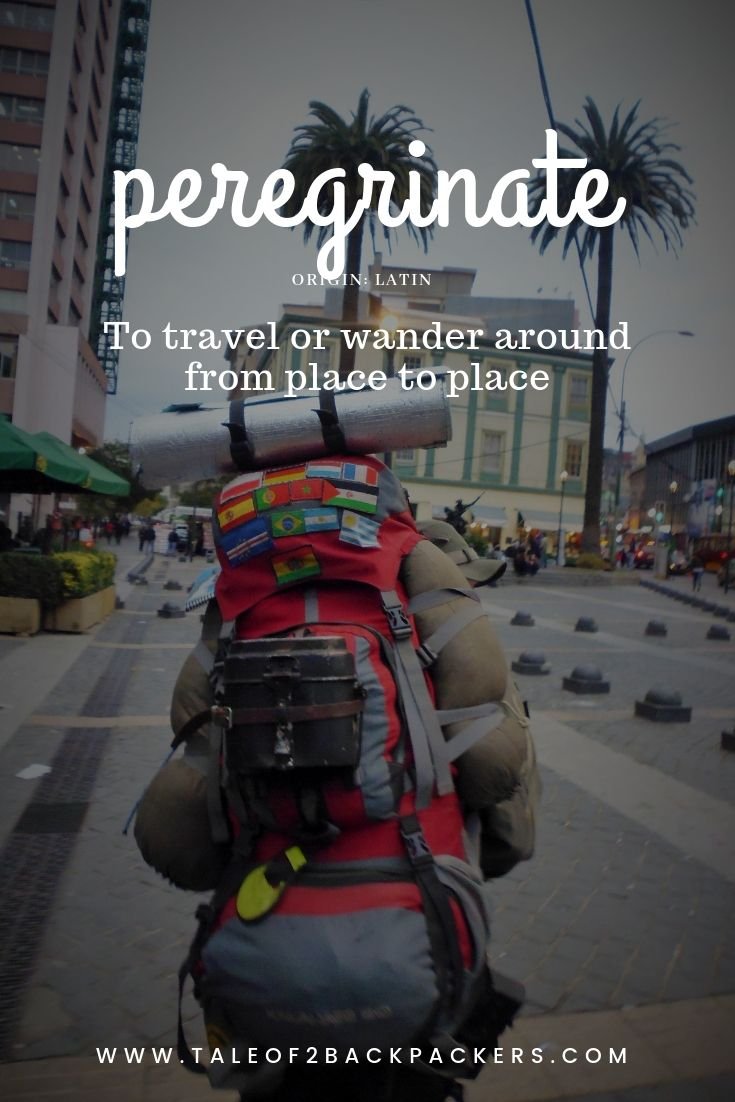
The feeling we have whenever we are visiting any new place. We love to wander around and discover the hidden and not so hidden gems. And Darjeeling happens to be one of our favourite places to wander around. What’s yours?
Nemophilist (n.)
Origin: English
Definition: One who is fond of the forest
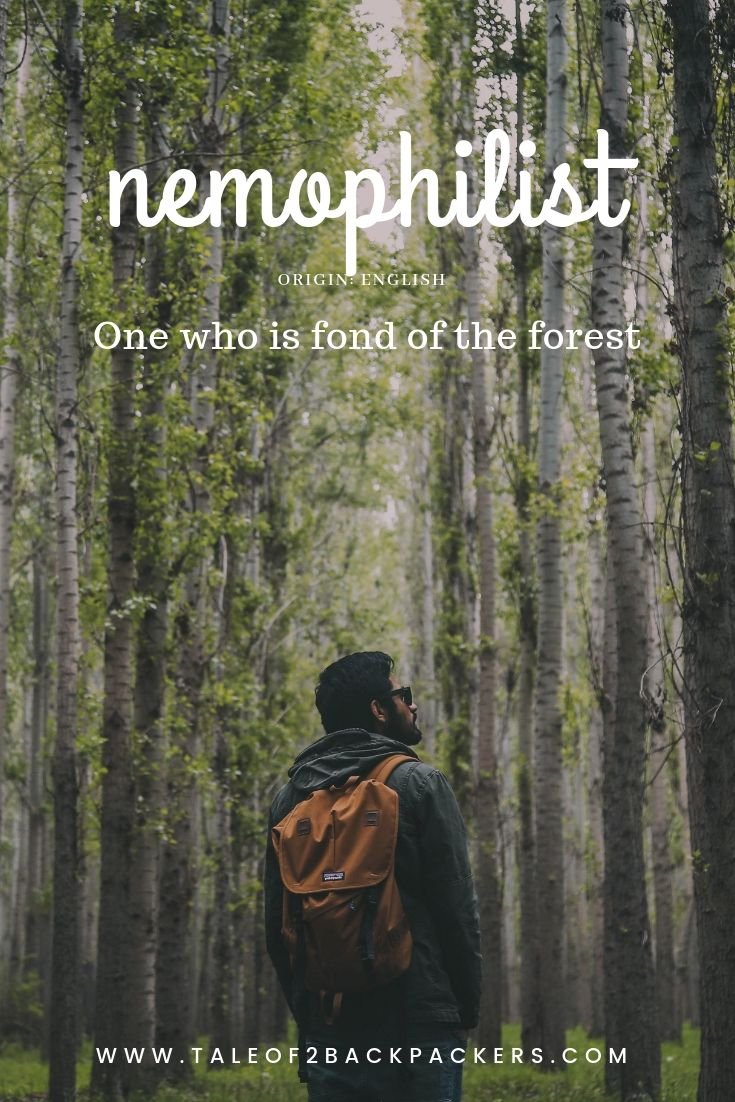
Serendipity (n.)
Definition: The fact of finding interesting or valuable by chance

Trouvaille (n.)
Origin: French
Definition: Something lovely discovered by chance
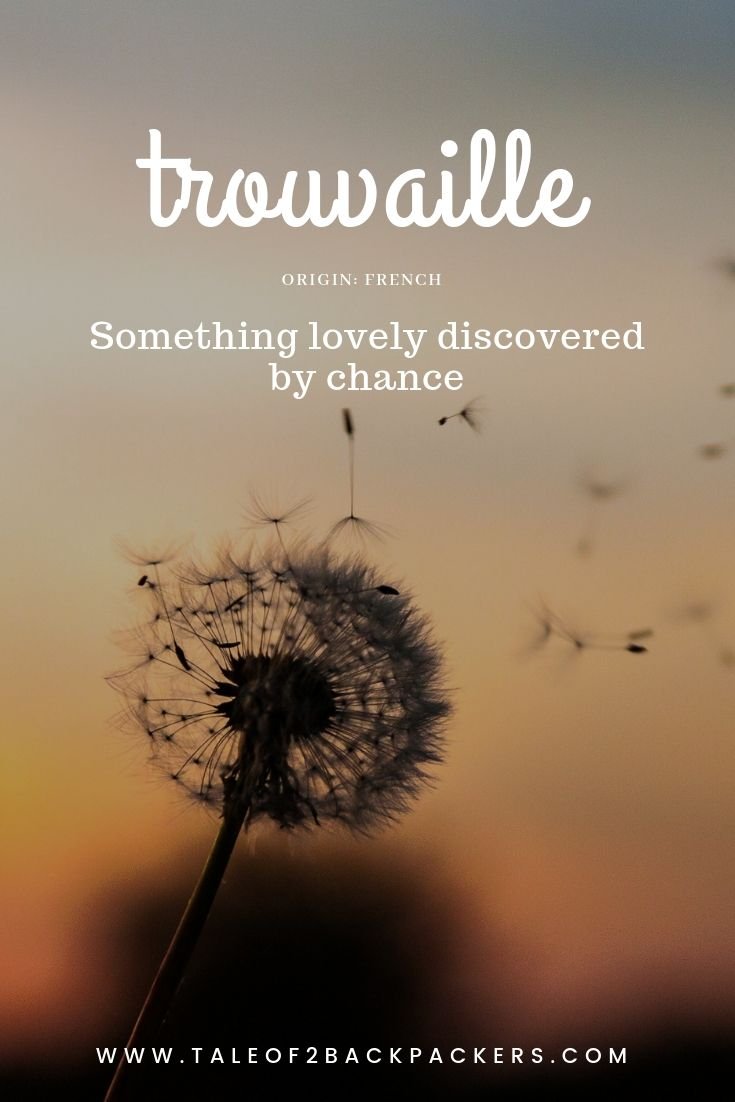
These two words are so close to our hearts. That we would be together was destiny, but our meeting was definitely serendipity! We had been travelling together for a long time, but it was only after our Amarnath Yatra , that we truly realized what travel means to us and what we actually want of our life.
Eudaimonia (n.)
Origin: Greek
Definition: The contented happy state when you travel
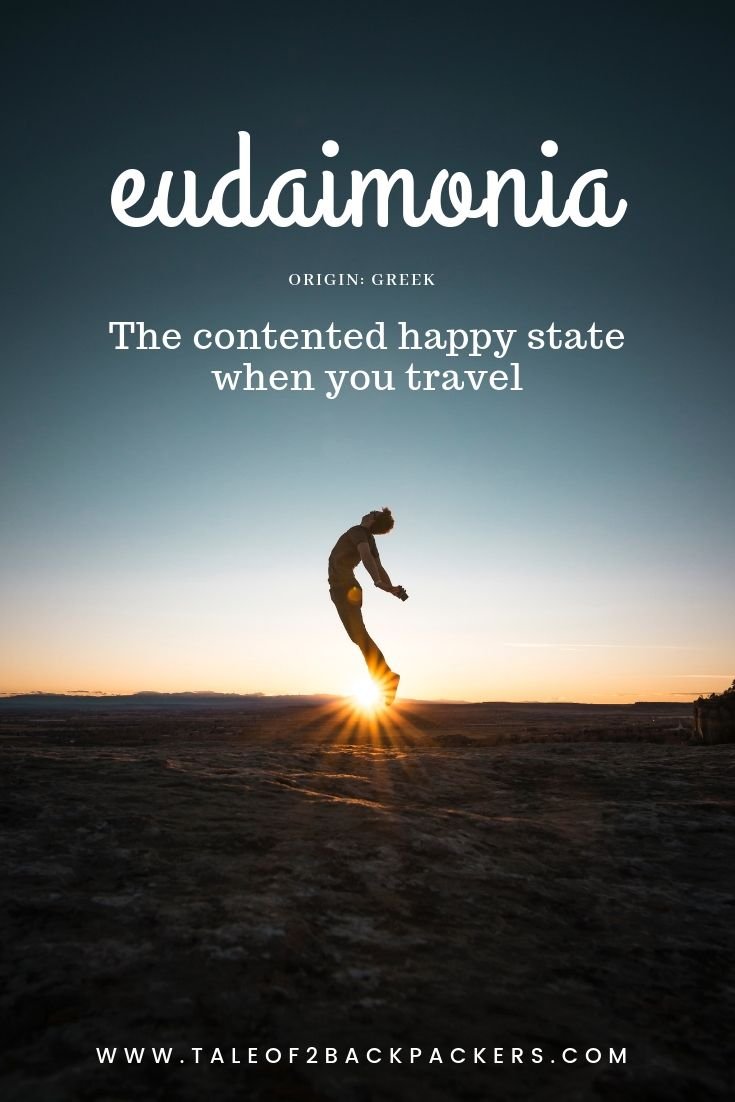
Eleutheromania (n.)
Definition: The intense desire for freedom
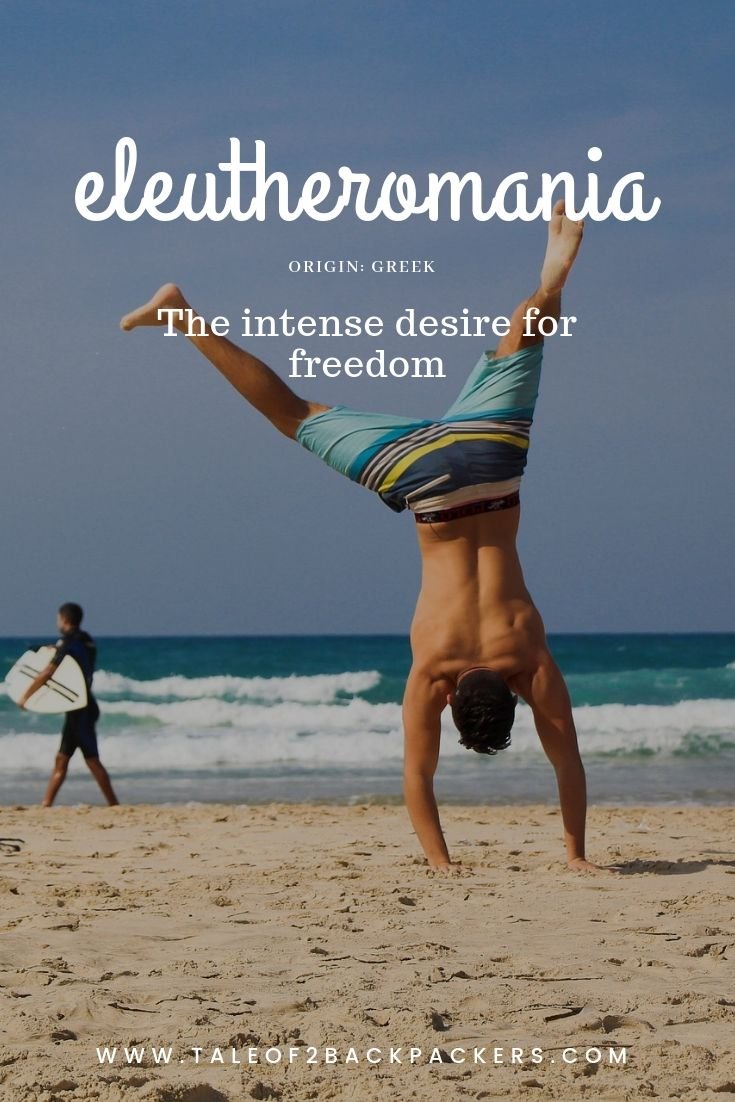
These two Greek words so wonderfully summarize our feeling when we travel. Travelling makes us contented and happy.
Sonder (n.)
Origin: Unknown
Definition: The realization that each random passerby is living a life as vivid and complex as your own

Resfeber (n.)
Origin: Swedish
Definition: The tangled feelings of fear and excitement before a journey

This always happens before a journey. There is a perpetual state of excitement as well as nervousness before I start any journey. And I enjoy both the state.
Before our trip to Uzbekistan, I had a bad case of travel anxiety after I read about Airbnb scams. It was only after I found out methods to detect Airbnb scam , I caught a break.
Fernweh (n.)
Origin: German
Definition: An urge to travel even stronger than wanderlust ; farsickness

Dérive (n.)
Definition: To drift unplanned, only led by the landscape and architect around you.

Have you done this? Have you travelled without any fixed plan? Often it is the unexpectedness of a journey that makes it even better. When we went to Majuli , we did not know where we would visit next. It was an impromptu decision to next visit Meghalaya . And this time we decided to give Shillong and Cherrapunji a miss and visit the offbeat places in Meghalaya . It was surely a memorable trip!
Solivagant (adj.)
Definition: Wandering alone. A solitary adventurer who travels and wanders the globe.

Strikhedonia (n.)
Definition: The joy of being able to say “to hell with it”

The feeling we had when we visited Ladakh !
Numinous (n.)
Definition: The powerful, personal feeling of being overwhelmed and inspired
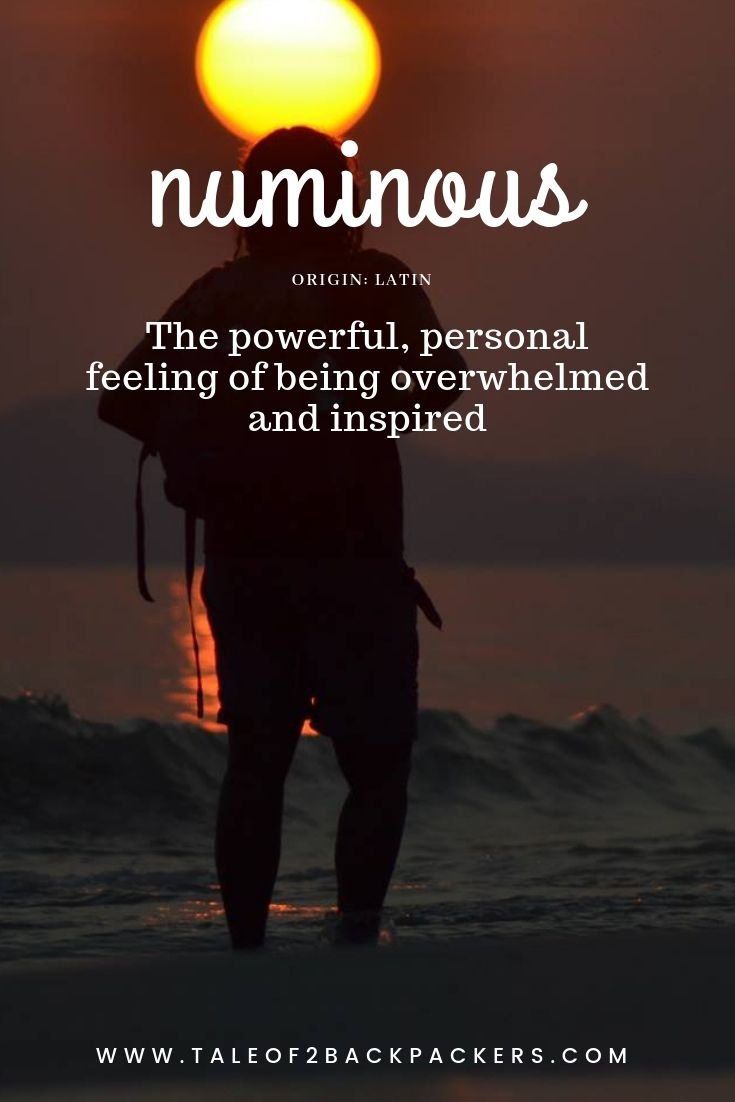
I had this feeling when I trekked the Rupin Pass summit . It was an overwhelming experience to stand there and look at the Kinner-Kailash range before me.
Forelsket (n.)
Origin: Norwegian
Definition: The euphoria you experience when you are first falling in love
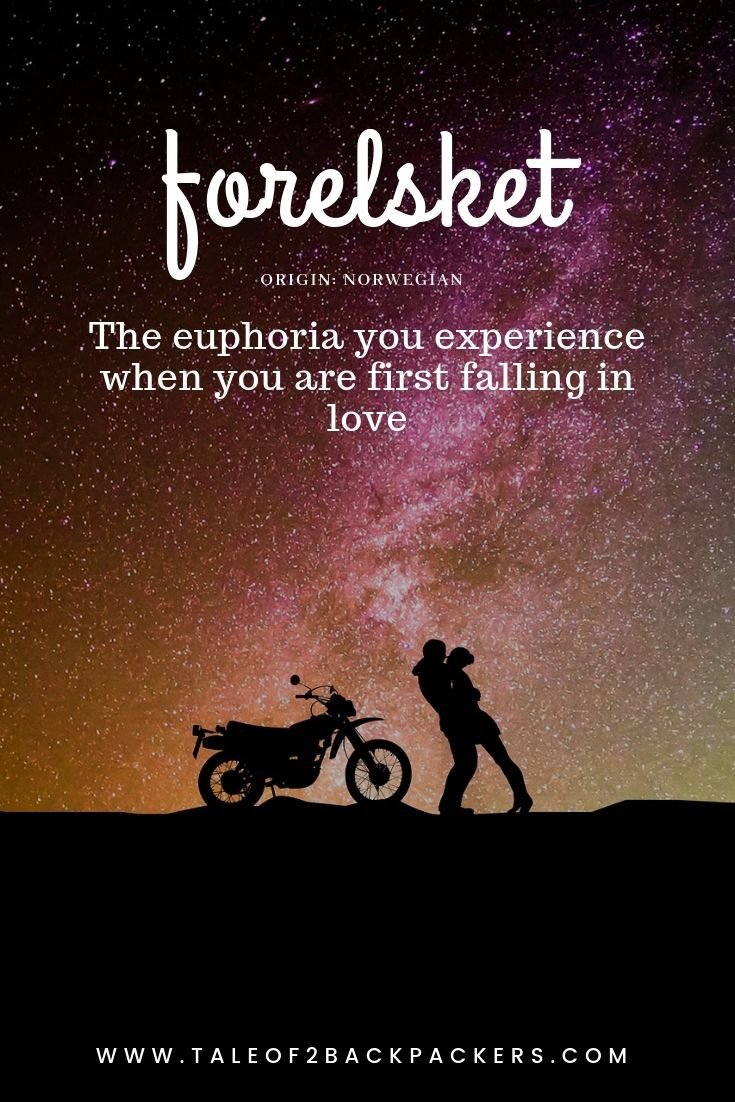
This is such a beautiful and creative travel word. The first time we fell in love with each other, it was confusing. But the tangled emotion that I was feeling at that time was probably known as “forelsket”! And I think it is the same feeling when we fall in love with each other after completing every trek or doing something that we never thought we would do.
Hireath (n.)
Origin: Welsh
Definition: A homesickness for a home which you cannot return, a home which maybe never was.

Sehnsucht (n.)
Definition: A wistful longing and yearning in the heart for travels that have been and travels to come.
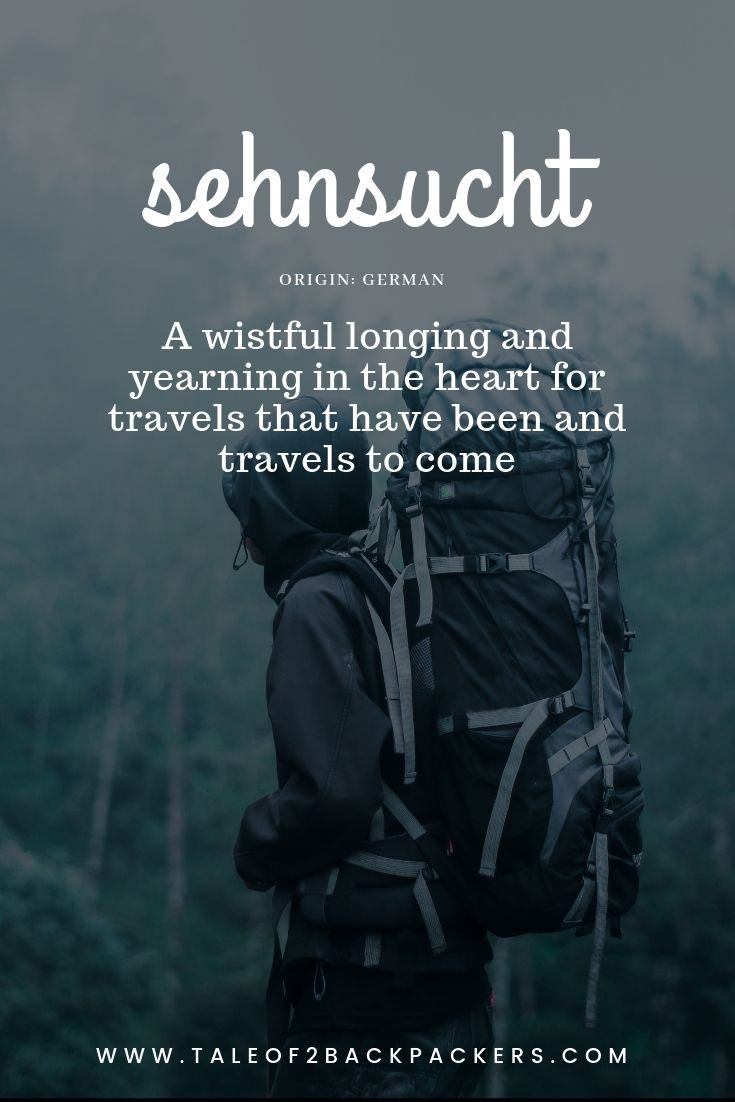
Livsnjutare (n.)
Definition: Someone who loves life deeply and enjoys life
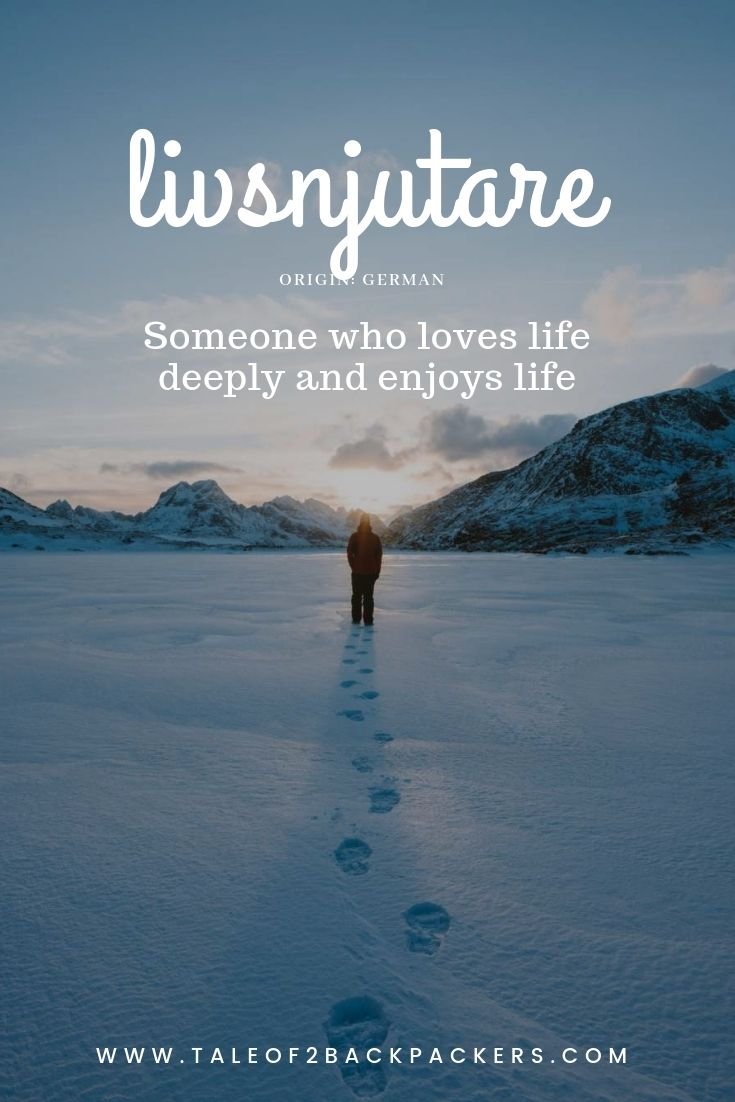
Sturmfrei (n.)
Definition: The freedom of being alone and having the ability to do whatever you want.

Sometimes, being alone is the best thing that we can gift ourselves.
Coddiwomple (v.)
Definition: To travel in a purposeful manner towards a vague destination
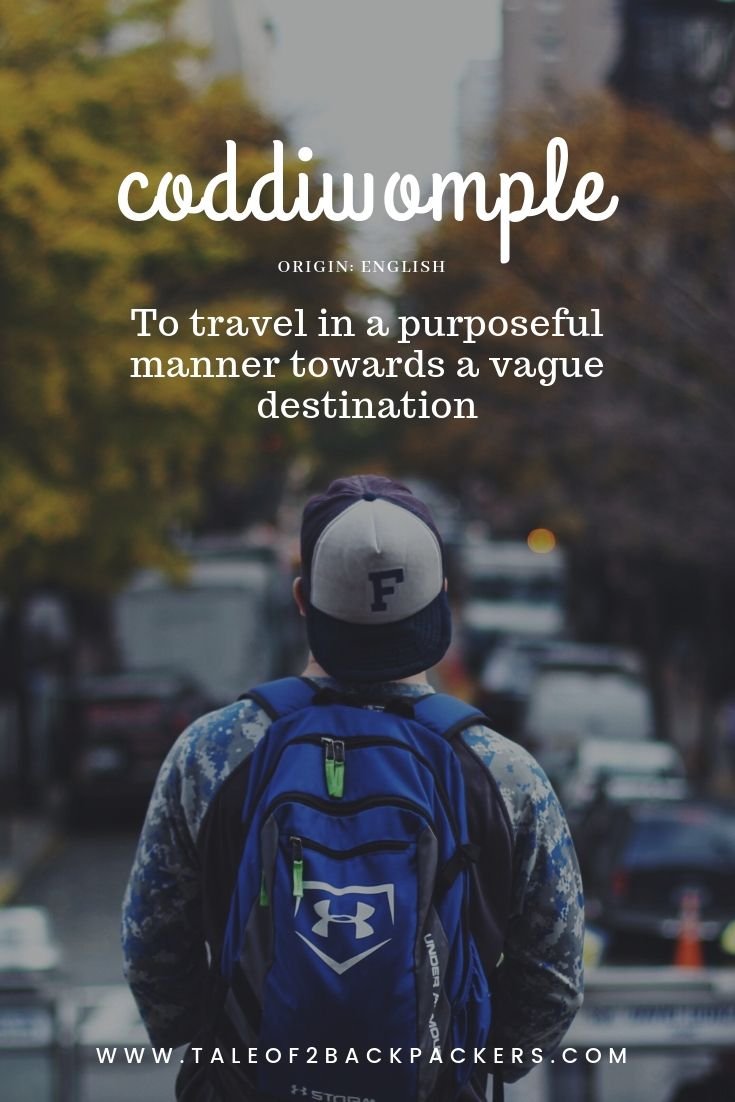
Nefelibata (n.)
Origin: Portugese
Definition: One who lives in the cloud of their own imagination; an unconventional person

This word so describes me. I love to live in my own imagination.
Hodophile (adj.)
Definition: A lover of roads. One who loves to travel.

Schwellenangst (n.)
Definition: Fear of crossing a threshold to embark on something new.

Don’t we all have the fear while starting anything new? It might be a new job, or a new life at a different city, or even changing our lifestyle. I was always very complacent with my life with a high paying job. But there was a void somewhere. Even after I knew that I have to take the leap, the fear hold me back. The fear of uncertainty was keeping me back from doing what I loved.
Today, I have crossed that threshold. And let me tell you the joy that it brings is totally worth all the difficulties and problems and hard work that went. What is the fear that is holding you back?
Vagary (v.)
Definition: A wandering or roaming journey
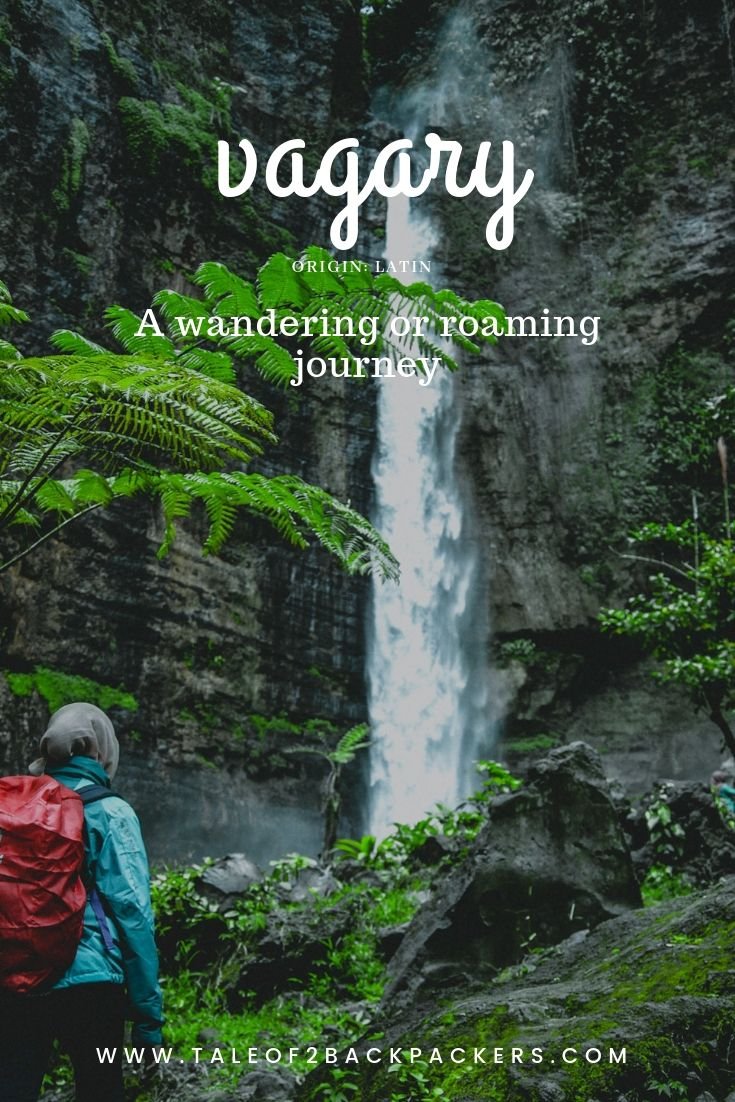
Saudade (n.)
Definition: A nostalgic longing to be near something or someone who is distant.
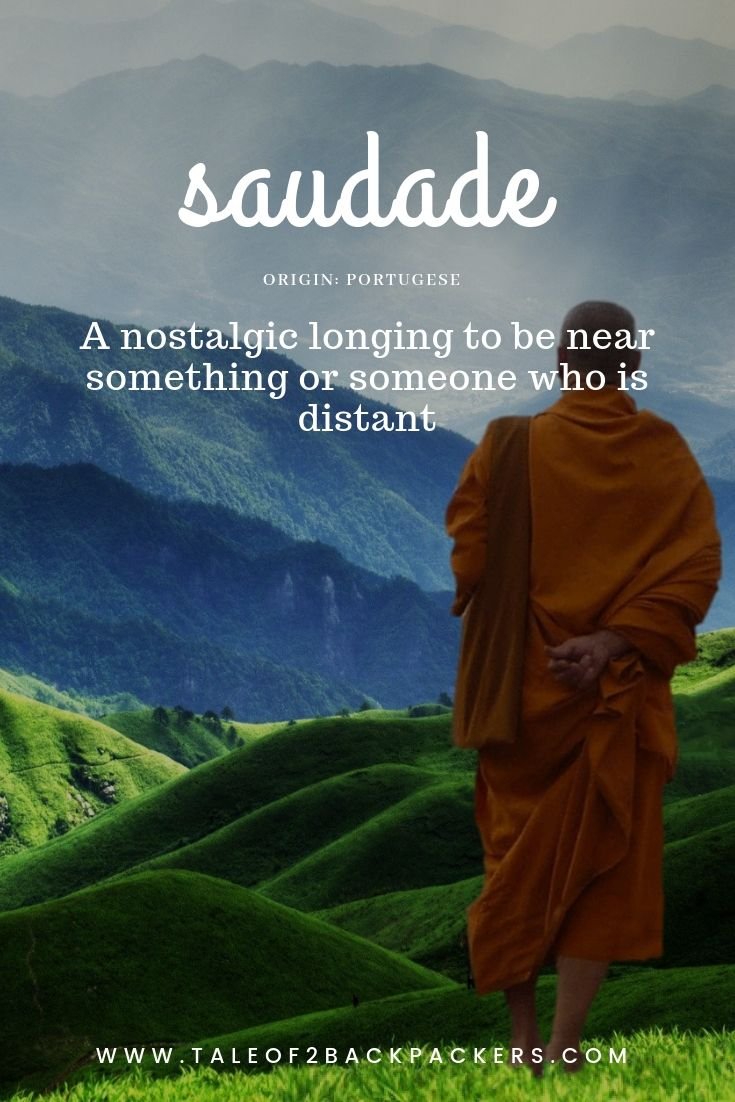
Origin: Danish
Definition: The cosy feeling you get when you are enjoying the good things in life with friends

Commuovere (v.)
Origin: Italian
Definition: To stir, to touch, to move to tears

The feeling we had after completing the Chadar Frozen River Trek .
Origin: Japanese
Definition: A profound and mysterious sense of the beauty of the universe
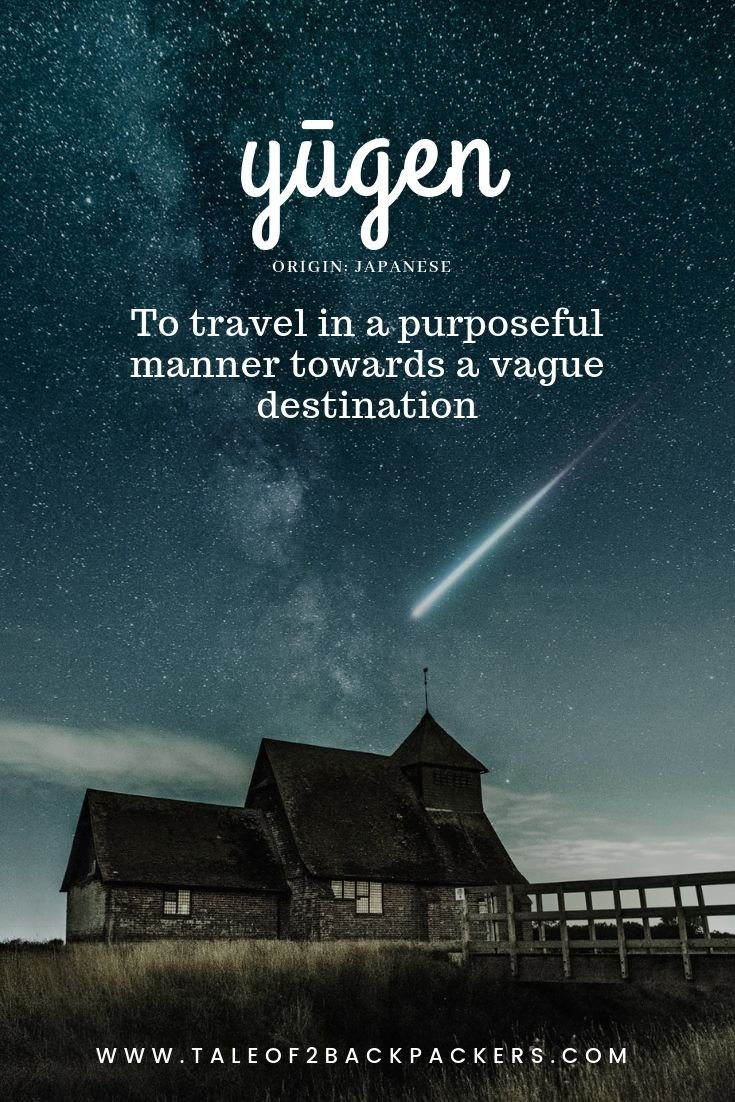
Definition: Awareness of how little of the world you will experience
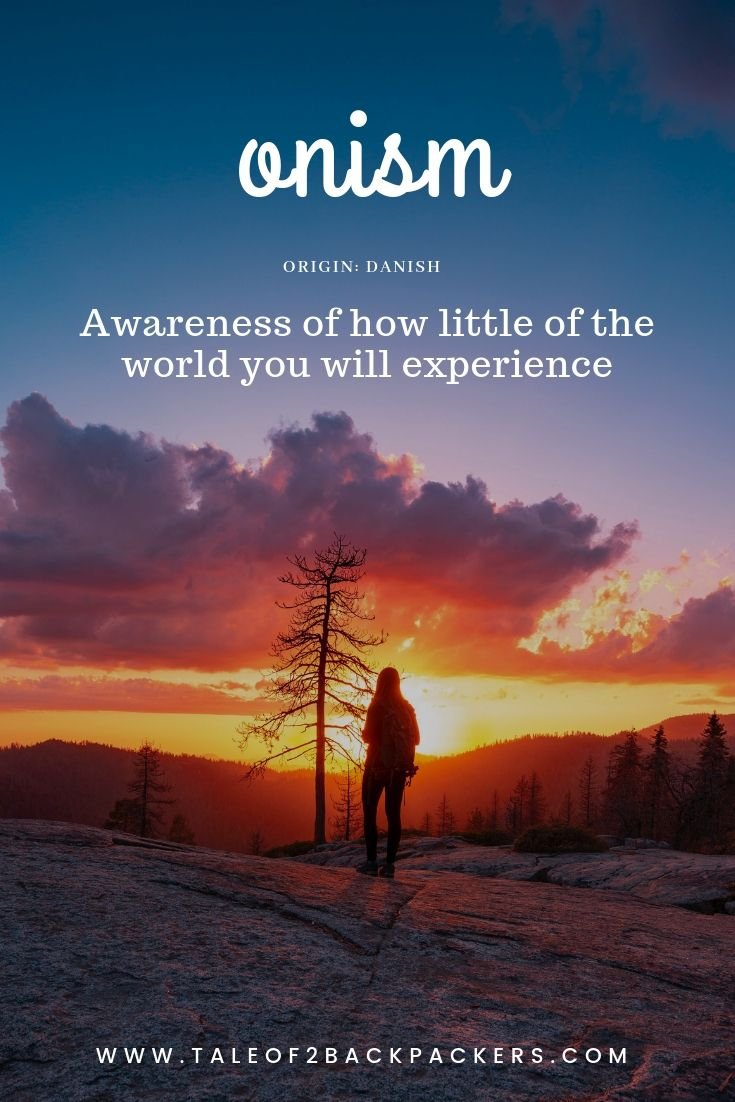
These two words sum it all. The universe, the world is so mysteriously beautiful. We can feel and experience only a part of this beauty!
Petrichor (n.)
Definition: The smell of earth after rain
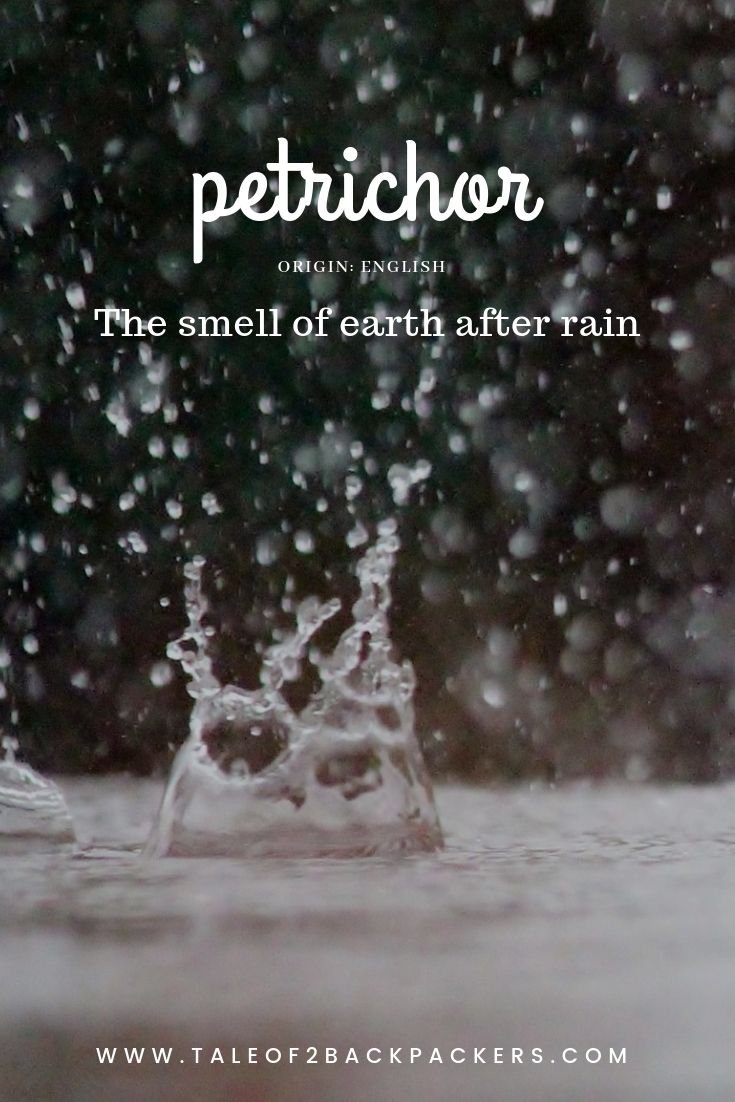
Flâuner (n.)
Definition: A person of leisure, deliberately aimless, simply wandering the streets, soaking in the city
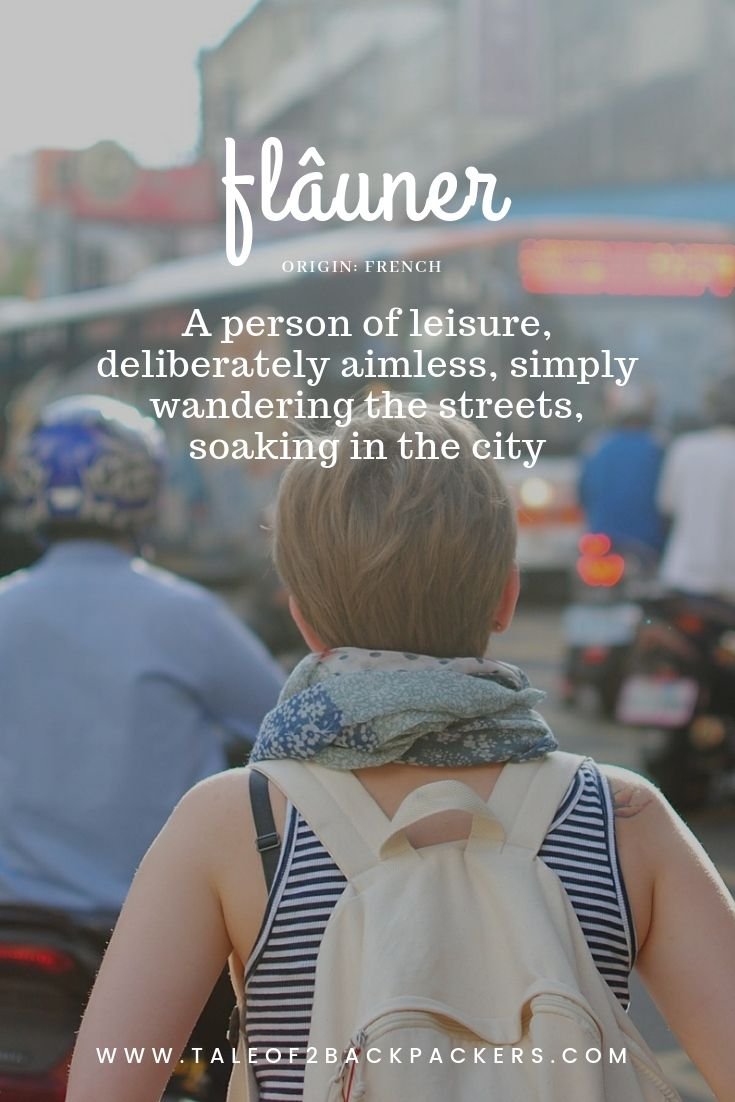
Whenever we visit any city, we love to walk around. It is the best way to discover the charm of a city. We loved to roam around Yangon and explore the city on foot discovering its gems, hidden or otherwise!
Sometimes Kolkata , our hometown does this to us. We simply wander around, soaking in the little delights, wandering around the lanes and bye lanes and falling in love over and over again with the city. And so does Delhi !
Jijivisha (n.)
Origin: Sanskrit
Definition: The strong eternal desire to live and continue living

Rasasvada (n.)
Definition: The taste of bliss in the absence of all thoughts
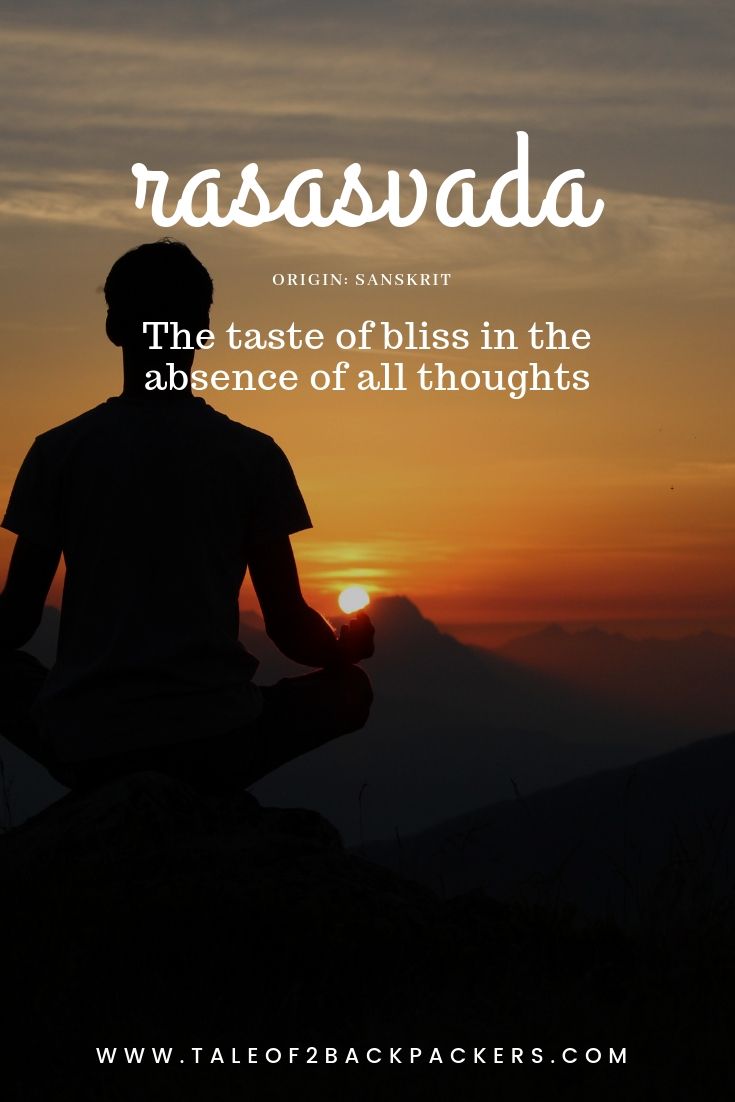
Exactly what we felt after seeing the Everest and Kanchenjunga ranges in front of us from the Phalut. The Sandakphu-Phalut Trek is a great experience.
Smultronställe(n.)
Definition: Lit. “ Place of wild strawberries ”; a special place discovered, treasured, returned to for solace and relaxation; a personal idyll free from stress and sadness.
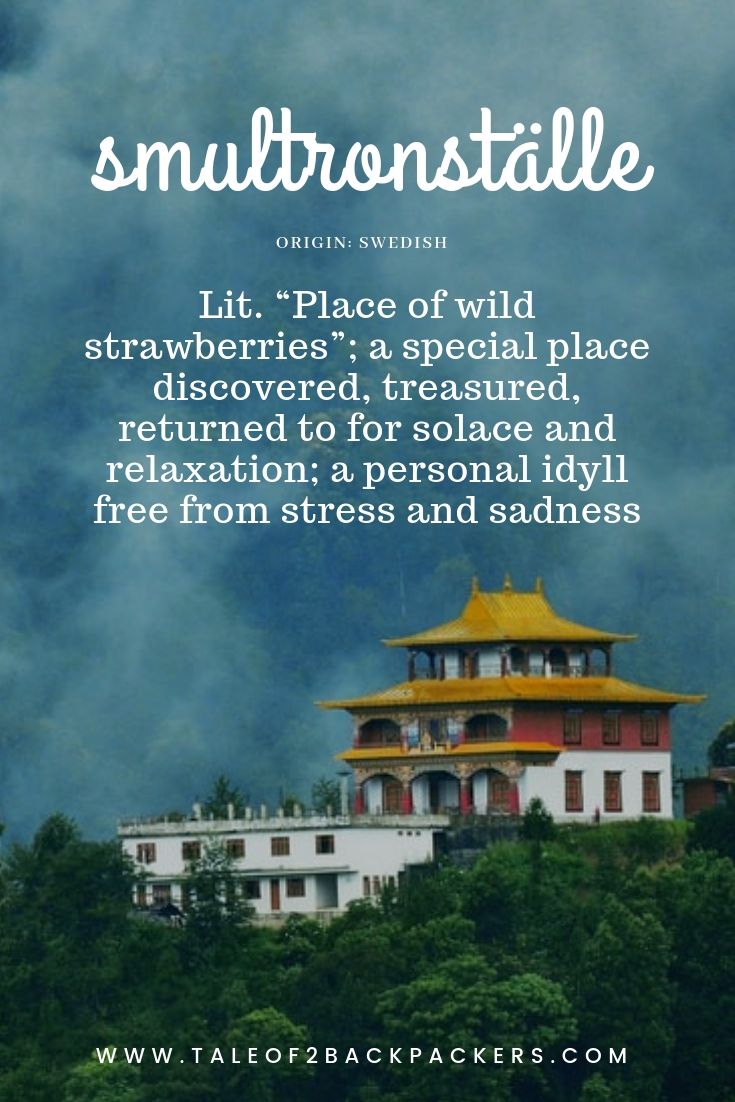
Darjeeling and Sikkim is our “place of wild strawberries”. What is yours?
Querencia (adj.)
Origin: Spanish
Definition: A place where one feels safe, A place where one feels at home
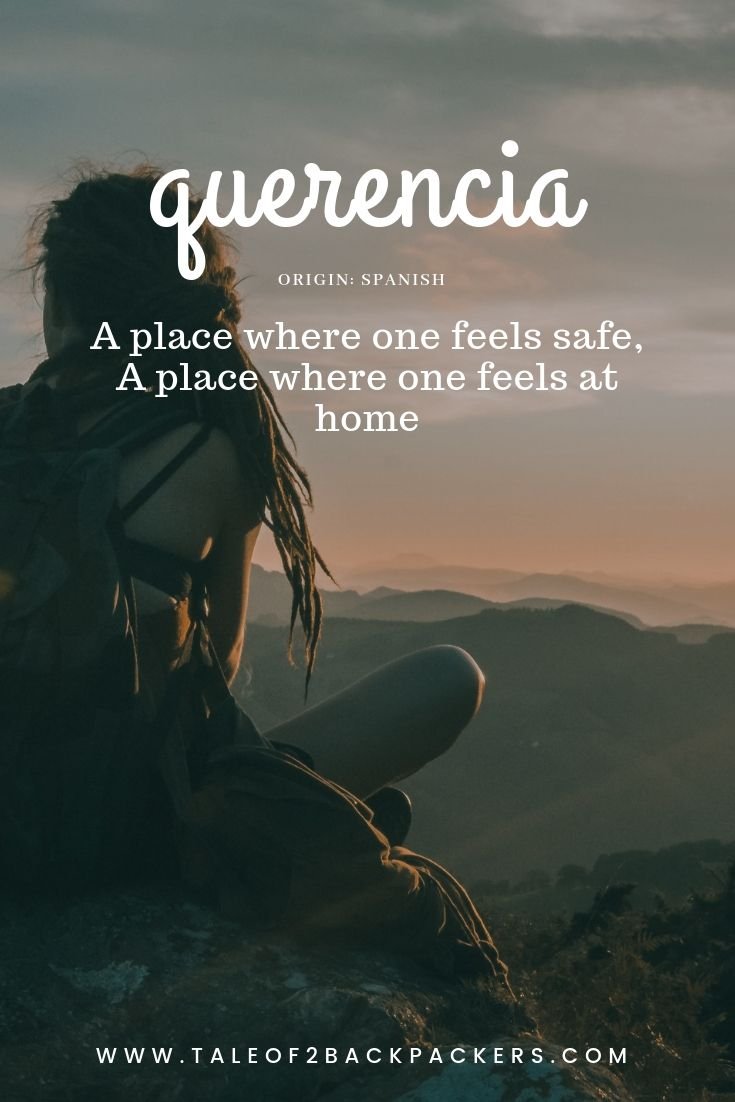
Musafir (n.)
Origin: Urdu
Definition: Traveller

Vuslat (n.)
Origin: Turkish
Definition: A union or reunion after being apart for a long time with one’s beloved
This is one of my favourite creative travel words.

Thalassophile (n.)
Definition: A lover of ocean

Waldeinsamkeit (n.)
Definition: The feeling of being alone in the woods

So did you find your travel inspiration from these beautiful and unusual travel words? What is your favourite? Let us know in comments.
Pin this post for a later dose of inspiration!
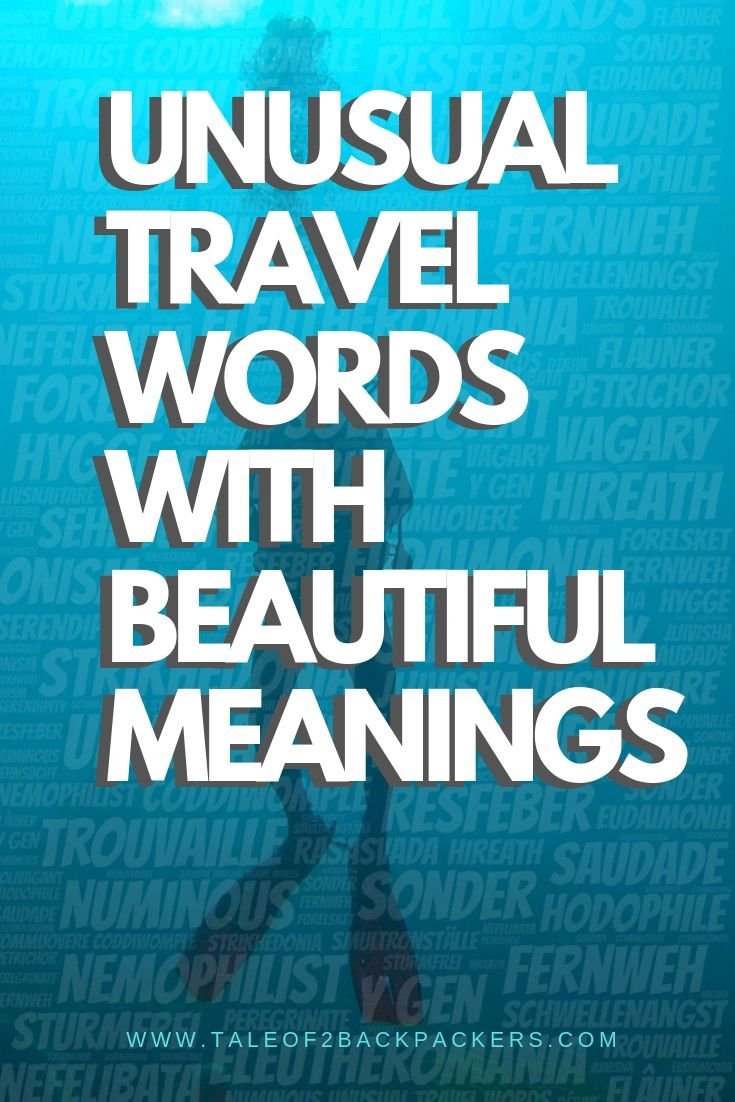
Reproduction of the content, including the photographs without prior consent/permission of the writer and photographer, is not encouraged at all and a violation of the same will attract legal action. If you need anything, Contact Us .

Hey! we’re Agni & Amrita.
We have been travelling together since the last 15 years and writing independent and personal travel content since 2014. Travel is one of the best teachers and through this blog, we aim to share our experiences and travel tips. We encourage you to travel more and see the world through your eyes and not through filtered templates.
Find more about us.
RELATED POSTS

Travel Blog SEO for 2023 – Tips on How to Increase Your Traffic?
If you have found this page, then in all probability you already have a travel blog and now looking forward towards growing your blog. The most important aspect of growing your website and attracting traffic is Search Engine Optimization or SEO. Whether you are a...
Travel Blog Name Ideas – How to choose awesome Travel Blog Names?
So you are thinking of starting a travel blog? I would say that it is a great decision. Starting a travel blog and continuing it through 5 years has been one of the best decisions of our life. And we always encourage others to start a travel blog. This article is all...
How to Start a Travel Blog in 2023? Things We Wish We Had Known
We love travelling and we have been doing it for more than a decade. Earlier the travel stories used to find a place in the pages of my diary. But honestly, starting a travel blog was one of the best decisions we had made almost 6 years back. Travel blogging has...
26 Comments
If you love to travel and excited to know different places in world then pack your bag and travel to India. India the birth place of yoga. Good for peace your mind and relaxing body.
Brilliant post, some of these descriptive words I read for the first time. Bookmarked for future reference. Thanks for Sharing.
Thank you Anahita. Glad that you liked the post.
These are indeed words that provide full expression to the meaning of travel. Thanks for adding to my vocabulary. this is indeed the serendipity of reading travel blogs.
Thank you Sandy and Vyjay!
This post was such a treat! I love travel and I love words, and it was nice to recognise a few that I knew, and learn new ones that I didn’t!
Thank you so much! So glad that you liked the post.
I am not just inspired but so well educated too now. Y next travel will now be so well-informed.
Thank you Sanjay!
Thanks for sharing this, great to know these word and their meaning. And yes I can say now I am Nemophilist. 🙂
Thank you Sundeep!
That is a very unique topic for a blog. Though I would want to identify myself with all the term, but I find myself closest to be a Nemophilist and Trouvaille. I also identify with Resfeber. No matter how much I have travelled, I still get a little nervous (and excited) before a foreign trip.
Thanks Abhinav. I can understand that nervous and excited feeling before a foreign trip!
Such words , very useful must say. I love to read and learn new things. These will definitely help me to increase my vocab.
Thank you Pamela!
Woow so many beautiful, unique travel words i am unaware off. Love it
Thank you Gurjeet!
Wow that made for an interesting read. Adding them to my dictionary right away!
Thanks so much.
Thanks for enhancing my vocabulary.. none them was familiar to me so far.
Thank you Sapna! I did not know a few before writing this.
Always admire your writting skills and this time thanks for introducing new words in my dictionary. Great way to increase ones vocabulary with pictures origin and all.
Thank you Pallavi. So glad that you liked the post.
Excellent post..very informative!!
Amazing list! This should keep me busy for a while. I would like to add French noun Flânerie – Aimless strolling or sauntering without a set plan or defined destination; walking at a leisurely pace, simply observing as you’re being taken along. Sometimes I write about similar topics. Here is an example post I wrote in case you or any of your readers find it interesting. Our content complements each other nicely, perhaps we can collab in some way in the future. Keep up the good work. Can’t wait to see something new from you! Cheers!
Thank you so much for the comment and another beautiful word. You blog is amazing too. Maybe we can connect over for a collab in some way. Looking forward.
Submit a Comment Cancel reply
Your email address will not be published. Required fields are marked *
Save my name, email, and website in this browser for the next time I comment.
Submit Comment
This site uses Akismet to reduce spam. Learn how your comment data is processed .
- How it works
- Programmes and Methodology
- Schoolchildren

English for travel – useful phrases and travel expressions in English
The holiday season is in full swing, so the only thing that you and your children think about is holidays, rest, relaxation by the water, in the mountains or in the allotment garden. Any form of outdoor entertainment that you offer to children will give them satisfaction, but when it comes to special holiday plans and trips, it is worth preparing something extra for the whole family.
In recent years, trips and excursions abroad have become extremely accessible, and what is more, competitively priced. For this reason, we more and more often decide to book a flight ticket for a flight abroad: to Croatia, Spain, Italy, Malta, Turkey or Greece. These are just a few of the most popular holiday destinations among the British people. You can also use the holiday time to visit European capitals, London, Paris, Prague or Copenhagen.
All these holiday trips have a common denominator – they require at least a basic knowledge of English so that both children and parents can communicate safely abroad. English phrases for travelling are useful to communicate in a shop or hotel, ask for directions, learn something about local attractions and monuments, or simply not to get lost at the airport in the maze of English-language information.
Knowledge of the English language in today’s world is really a necessity. Even 3 4-year-olds are learning English now, and many parents bravely follow in their footsteps. If you do not know English well, and your child is only on a beginner level – no problem! Here you will find useful travel English phrases that will come in handy when traveling .
All you need to do is master a few basic phrases, and you’ll be fine on your next family vacation abroad! English for travel and vacation is easy – try yourself! In this article you’ll find plenty of English travel terms and phrases.
English phrases for traveling – why you should learn English for travelers?
Learning travel phrases in English can open up a world of possibilities for both you and your children. Here are five compelling reasons why you should prioritize English language skills for your next travel experiences:
- Easy Communication: English is widely spoken across the globe, making it the go-to language for international communication. By learning English, you and your kids can confidently navigate through different countries, interact with locals, ask for directions, order food, and fully immerse yourselves in new cultures.
- Safety and Security: When traveling, it’s crucial to be able to express yourself and understand important safety instructions. Knowing English provides an added layer of security, allowing you to ask for help when needed, communicate with authorities, and ensure the well-being of your family in unfamiliar surroundings.
- Enhanced Cultural Experiences: Language is a gateway to culture. By learning English, your children can engage in meaningful conversations with locals, learn about traditions, and gain a deeper understanding of the places they visit. This enriching experience will create lasting memories and broaden their global perspective.
- Educational Opportunities: English is the language of academic excellence. By mastering English, your children can seize educational opportunities while traveling. They can attend summer schools, participate in language exchange programs, and even consider studying abroad in the future. Learning English opens doors to a world of educational possibilities.
- Independence and Confidence: As your children develop their English language skills, they become more independent and self-assured travelers. Being able to communicate in English empowers them to explore new destinations, interact with fellow travelers, and navigate transportation systems, fostering a sense of confidence and resilience.
Don’t miss out on the chance to equip your children with essential English language skills for their travel adventures. With the flexibility and convenience of an online English class for kids , such as the one offered by Novakid, your kids can continue learning throughout the summer from any location. All they need is a computer with internet access to participate in engaging lessons led by experienced, native-speaker teachers. Make this summer a time of growth and discovery for your children with the gift of English language proficiency with Novakid!

English for travellers: The airport
Here are some useful English phrases for travel at the airport or on the plane . It is good to know what is the meaning of popular airport signs, which you should pay attention to. You should also know and how to search for lost luggage in English, which, of course, we do not wish anyone!
Vocabulary:
- Departure: The act of leaving or the point of leaving from the airport.
- Arrival: The act of arriving or the point of arriving at the airport.
- Boarding pass: A document that allows you to board the airplane.
- Check-in: The process of registering and obtaining your boarding pass at the airport.
- Security check: The procedure of going through security screening before entering the departure area.
- Baggage claim: The area where you collect your checked-in luggage after arriving.
- Gate: The designated area where passengers board the aircraft.
- Customs: The area where your luggage may be inspected and you may have to declare items.
- Immigration: The process of clearing passport control to enter or exit a country.
- Duty-free: Shops that sell goods without taxes or duties.
- Delay: A situation in which a flight is postponed or held up.
- Terminal: The building at the airport where passengers board and disembark from flights.
- Announcement: A public statement made over the airport’s PA system.
- Baggage allowance: The maximum weight or number of bags allowed on a flight without extra charges.
- Security checkpoint: The area where passengers are screened for prohibited items before entering the departure area.
Expressions and phrases used at the airport
- Can you tell me where the check-in counter is?
- Excuse me, which gate is my flight departing from?
- Where can I find the baggage claim area?
- Is there a currency exchange desk in the airport?
- Could you please direct me to the nearest restroom?
- I need to declare some items at customs. Where should I go?
- Is there a designated smoking area in the airport?
- Can you recommend a good place to grab a quick bite to eat?
- What time should I arrive at the security checkpoint?
- Could you help me find a taxi or transportation to my hotel?
English for travellers: The airplane
English is also useful on the plane, when you want to find your place, ask the flight attendant for water, or when you want to be up-to-date with the messages displayed on the screen.
- Seat: The place where you sit during the flight.
- Seat belt: A safety device worn around the waist to secure passengers during takeoff, landing, or turbulence.
- Tray table: A small table that folds down from the seat in front of you.
- Overhead bin: Storage compartments above the seats for carry-on luggage.
- Cabin crew: The flight attendants responsible for passenger safety and comfort.
- Lavatory: The restroom facilities on board the airplane.
- Emergency exit: A designated door for evacuating the airplane in case of an emergency.
- Call button: A button to summon a flight attendant for assistance.
- In-flight entertainment: Entertainment options available on board, such as movies, music, or games.
- Beverage cart: A trolley that serves drinks and snacks during the flight.
- Window seat: A seat located next to the aircraft window.
- Aisle seat: A seat located on the side of the aircraft’s aisle.
- Oxygen mask: A mask that provides oxygen during an emergency situation.
- Seat recline: Adjusting the angle of the seat back for added comfort.
- Fasten seat belt sign: The illuminated sign indicating passengers should fasten their seat belts due to turbulence or approaching landing.
Expressions and phrases for traveling on the airplane
- Excuse me, is this seat taken?
- Can I have a blanket and pillow, please?
- How long is the flight expected to be?
- Do you have any vegetarian meal options available?
- May I have a glass of water, please?
- Could you assist me in stowing my carry-on luggage?
- Is there a power outlet or USB port near my seat?
- Are there any in-flight entertainment options on this flight?
- What is the current altitude and cruising speed of the aircraft?
- Excuse me, could you please lower the window shade?

English for travellers: The train
During summer vacation, many families travel by train to their destinations. Here are some common phrases, that may come in handy while travelling via rail.
- Train station: The location where trains arrive and depart.
- Platform: The raised area where passengers wait for trains.
- Ticket: A document that allows you to travel on the train.
- Ticket office: The place where you can purchase or collect your train tickets.
- Timetable: A schedule that shows the departure and arrival times of trains.
- Departure: The act of leaving or the scheduled time for a train to leave.
- Arrival: The act of arriving or the scheduled time for a train to arrive.
- Platform number: The assigned number indicating where your train will arrive or depart.
- Train carriages/cars: The individual sections of the train where passengers sit.
- Seat reservation: A pre-booked seat on a specific train.
- Luggage rack: The area above the seats where you can store your bags.
- Train conductor: The person who checks tickets and assists passengers on the train.
- Boarding: The act of getting on the train.
- Announcements: Public messages or announcements made at the train station.
- Connection: The transfer from one train to another at a specific station.
- Compartment: A separate area in a train carriage with a group of seats facing each other.
- Dining car: A designated carriage where passengers can purchase meals and drinks.
- Intercom: A communication system used for announcements or emergencies on the train.
- Ticket inspector: A person who checks tickets and ensures passengers have valid tickets.
- Platform sign: Signs indicating the platform number, train schedules, and destinations.
Expressions and phrases for traveling on a train
- What platform does the train to [destination] depart from?
- Excuse me, is this seat reserved?
- How long is the journey from here to [destination]?
- Does this train have Wi-Fi onboard?
- Is there a dining car or food service available on this train?
- Can you help me with my luggage?
- Are there power outlets on the train to charge electronic devices?
- Is there a restroom on board the train?
- Is there a designated quiet or silent zone on the train?
- Excuse me, what time is the next stop?
- Can I buy a ticket on board the train?
- Is there a conductor on the train who can assist me?
- Are there any stops or transfers along the route?
- How often do trains run on this route?
- Can I see the train schedule or timetable?
- My ticket is already paid.
- Is the internet connection working?

English for travel: Hotels and hostels
After arriving at the holiday destination, English will also be useful for checking in at the hotel , asking for the room number and its amenities.
- Reservation: The act of booking a room in advance.
- Reception: The front desk or area where you check in and out of the hotel or hostel.
- Check-in: The process of registering and receiving your room key or key card.
- Check-out: The process of settling your bill and returning your room key or key card.
- Room key: A card or key that grants you access to your room.
- Single room: A room with a single bed for one person.
- Double room: A room with a double bed for two people.
- Twin room: A room with two single beds for two people.
- Suite: A larger, more luxurious room with additional living or sleeping space.
- Amenities: The facilities and services available at the hotel or hostel, such as a gym, pool, or spa.
- Breakfast included: The provision of breakfast as part of the room rate.
- Wi-Fi: Wireless internet access provided in the hotel or hostel.
- Room service: The service of delivering food and beverages to your room.
- Housekeeping: The staff responsible for cleaning and maintaining the rooms.
- Late check-out: The option to stay in the room past the regular check-out time for an additional fee.
- Key card: A card with a magnetic strip or chip used to access your room.
- Reservation number: The unique identifier for your booking.
- Front desk: The area at the reception where guests are attended to.
- Bellboy/Porter: A staff member who assists with luggage and escorts guests to their rooms.
- Invoice/Bill: A document detailing the charges for your stay, including room rate and any additional services.
Expressions and phrases for stayin in hotels / hostels
- Do you have any available rooms for tonight?
- How much is a room for one night?
- Can I see the room before I make a decision?
- Is breakfast included in the room rate?
- What time is check-in and check-out?
- Could you please bring extra towels to my room?
- Is there free Wi-Fi available in the rooms?
- Can you recommend any good restaurants nearby?
- Could you arrange a taxi for me tomorrow morning?
- Is there a safe deposit box where I can store my valuables?
- Can I have a wake-up call at [desired time] tomorrow?
- I’m having trouble with the air conditioning/heating in my room. Can you assist?
- Are there any laundry facilities or services available?
- Is there a gym or fitness center in the hotel/hostel?
- Could you please provide a map of the local area?

English for travel: Asking about directions
When you reach your holiday destination, you can start blissful relaxation or intensive sightseeing – it depends on your preferences and the will of your children. In each of the vacation situations, however, a few basic phrases will be useful. This will make it easier to navigate around a new place, ask local residents for specific information or find interesting attractions.
- Excuse me: A polite phrase used to get someone’s attention.
- Can you help me?: A question asking for assistance or directions.
- Where is…?: A question asking for the location of a specific place.
- How do I get to…?: A question asking for directions to a specific destination.
- Go straight: Proceed in a direct or linear path without turning.
- Turn left: Change direction by moving to the left.
- Turn right: Change direction by moving to the right.
- Cross the street: Move from one side of the road to the other.
- It’s on the left/right: Indicating that the destination is located to the left or right side.
- Is it far? Is it close?: Questions to inquire about the distance of the destination.
- Is there a bus/train station nearby? : Inquiring about the proximity of public transportation.
- Can you show it on the map?: Asking someone to mark or indicate the location on a map.
- Excuse me, I’m lost: Informing someone that you are unable to find your way.
- Landmark: A prominent or recognizable feature used as a point of reference.
- Can you repeat that, please?: Asking someone to repeat or clarify the directions given.
Expressions and phrases you need to know to get to your destination
- Excuse me, could you tell me how to get to [destination]?
- Can you please give me directions to [location]?
- Which way is [landmark]?
- I’m a bit lost. Can you help me find my way back to [point of reference]?
- Is it far from here?
- Could you point me in the right direction for [place]?
- Can you recommend the quickest route to [destination]?
- Is there a bus/train station nearby?
- How long does it take to walk/drive to [location] from here?
- Excuse me, but I seem to have taken a wrong turn. How can I get back on track?

English for travel: Food and restaurants
Getting to know the local culture and culinary delicacies is also an essential element of holidays abroad. On holidays, we often eat in restaurants , go out for ice cream with the children or buy souvenirs . In all these situations, in a restaurant or in a store, you will also need a handful of English words and phrases, which will help you get along with the waiter or seller.
- Menu: A list of food and beverage options available at a restaurant.
- Appetizer/Starter: A small dish served before the main course.
- Main course/Entrée: The primary dish of a meal, typically larger than an appetizer.
- Dessert: A sweet dish or course served at the end of a meal.
- Beverage/Drink: A liquid consumed with a meal, such as water, soda, juice, or wine.
- Vegetarian: A person who does not eat meat. Vegetarian dishes are prepared without meat.
- Vegan: A person who does not consume any animal products. Vegan dishes are free from meat, dairy, eggs, and other animal-derived ingredients.
- Special of the day: A dish or menu item that is unique or highlighted for that particular day.
- Reservation: The act of booking a table at a restaurant in advance.
- Waiter/Waitress: A server who takes orders and serves food and beverages at a restaurant.
- Chef: The professional cook responsible for preparing and overseeing the kitchen.
- Bill/Check: The statement of charges for the meal that needs to be paid.
- Tip/Gratuity: An additional amount of money given to the server as appreciation for good service.
- To-go/Takeaway: Food ordered to be packaged and taken away instead of dining in the restaurant.
- Table for [number]: Requesting a table for a specific number of people.
- Gluten-free: Food items that do not contain gluten, a protein found in wheat, barley, and rye.
- Condiments: Sauces, dressings, or spices used to enhance the flavor of food.
- Allergies: Dietary restrictions or adverse reactions to specific ingredients.
- Non-alcoholic: Beverages that do not contain alcohol.
- Self-service/Buffet: A style of dining where customers serve themselves from a selection of food.
Travel expressions to use at the restaurant
- Could we have a table for [number] people, please?
- What do you recommend from the menu?
- Is the [dish] spicy/mild?
- Can I see the wine/beer list, please?
- Are there any vegetarian/vegan options available?
- Can I have the bill/check, please?
- Is service included in the bill/check?
- Can we split the bill/check, please?
- Excuse me, could I get some extra napkins, please?
- I’d like to order the [dish], please.
- Could I have a glass of water, please?
- Can I make a reservation for [time] tonight?
- Is it possible to customize the [dish] to my dietary preferences?
- What are the daily specials or chef’s recommendations?
- Excuse me, I have a food allergy. Can you accommodate special dietary needs?

Travel English phrases: Shopping
While travelling, we often see colorful souvenir shops around every corner. Buing souvenirs from travels is something families with kids often do. Let’s find out how to buy a souvenir in English and how to communicate with shop owner.
- Grocery store/Supermarket: A large retail store where you can purchase food and household items.
- Shopping cart/Trolley: A wheeled basket used for carrying items while shopping.
- Aisle: A pathway between shelves or displays in a store.
- Brand: A specific company or manufacturer of a product.
- Price: The cost of a product or item.
- Sale: A discounted price or special promotion on a product.
- Cashier/Till: The person or area where you pay for your purchases.
- Receipt: A document that serves as proof of purchase and itemizes your purchases.
- Cash: Physical money used for making purchases.
- Credit card/Debit card: Plastic cards used for making electronic payments.
- Discount: A reduction in price for a product or item.
- Checkout: The area or process of paying for your purchases.
- Shopping bag: A bag provided by the store to carry your purchases.
- Souvenir shop/Gift shop: A store that sells mementos and unique items related to a specific location or event.
- Souvenir: An item purchased to remember a place or experience.
- Local specialty: A product or food item that is unique to a particular region.
- Size: The measurement or dimensions of a product, particularly for clothing or shoes.
- Shelf: A flat surface where products are displayed and stored in a store.
- Salesperson/Shop assistant: An employee who assists customers and provides information in a store.
Travel questions you might need to ask while shopping
- How much does this cost?
- Do you have this in a different size/color?
- Is there a discount on this item?
- Can I try this on, please?
- Do you accept credit cards?
- Could you gift-wrap this for me?
- Is there a return/exchange policy?
- Can I get a receipt, please?
- Do you have any other similar items?
- Is there a warranty for this product?
- Can I see some more options in that category?
- What material is this made of?
- Can I get a discount if I buy multiple items?
- Are there any sales or promotions happening?
- Do you offer international shipping?
- Do you accept foreign currency?
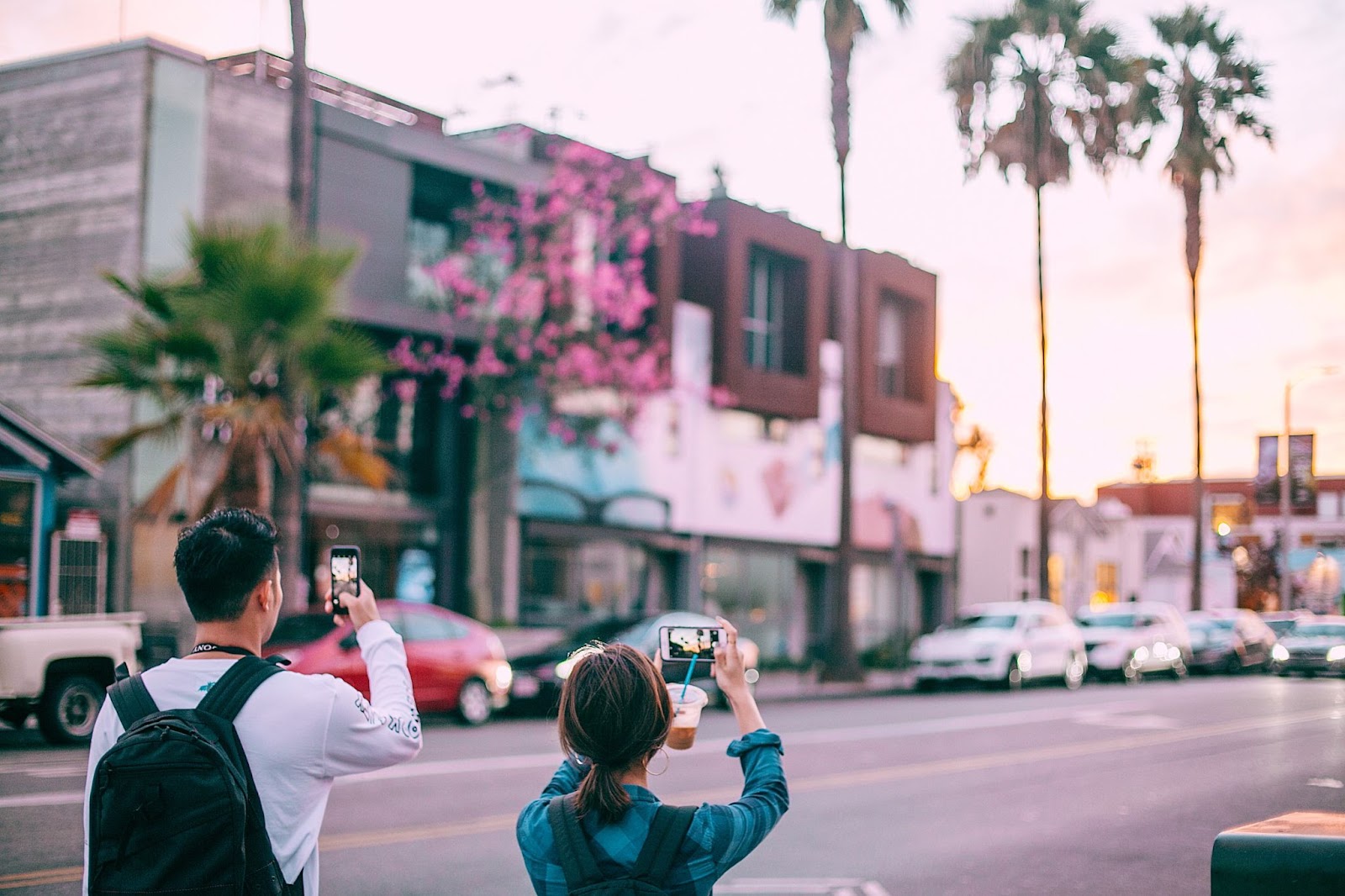
Travel English: Sightseeing
Here are some other useful phrases to help you communicate in English during sightseeing in an English speaking country.
- Tourist attraction: A popular place or site that is visited by tourists.
- Landmark: A well-known feature or structure that is easily recognizable and often of historical or cultural significance.
- Guidebook: A book or publication that provides information about tourist attractions, maps, and recommendations.
- Map: A visual representation of an area, showing roads, landmarks, and points of interest.
- Tour: A guided visit or journey to explore and learn about a place or attraction.
- Sightseeing: The activity of visiting and observing interesting places and attractions.
- Museum: A place that exhibits collections of historical, artistic, or cultural artifacts for public viewing.
- Gallery: An establishment that displays and sells works of art.
- Monument: A structure or statue built to commemorate a person, event, or historical significance.
- Cathedral: A large and important church, usually the seat of a bishop.
- Historical site: A place that holds historical significance and provides insights into the past.
- Architecture: The art and science of designing and constructing buildings.
- Sculpture: Three-dimensional artwork created by carving, molding, or casting.
- Plaza/Square: An open public space in a city, often surrounded by buildings and used for gatherings or events.
- Fountain : A decorative structure that releases water into a basin or jets it into the air.
Useful English expressions for sightseeing
- Can you recommend any must-see attractions in this city?
- How do I get to [landmark/attraction] from here?
- Is there a guided tour available for [landmark]?
- What time does [museum/attraction] open/close?
- Are there any entrance fees for [landmark/attraction]?
- Can you provide a map or brochure of the local sights?
- Is photography allowed inside [museum/attraction]?
- Are there any discounts available for students/seniors?
- Is there an audio guide or guided tour available in English?
- Can you tell me a bit about the history of this [monument/landmark]?
- Are there any nearby viewpoints for panoramic views of the city?
- Are there any specific guidelines or restrictions for visiting [attraction]?
- Can you recommend any good walking routes or scenic trails in the area?
- Is it possible to book tickets for [attraction] in advance?
- Are there any special events or exhibitions happening at [museum/attraction]?

Travel phrases in English: Emergencies / Health
We do not wish anyone any problems with health or emergencies during their vacation, but once they happen, it’s good to know some English phrases useful during communication with doctors or other authorities.
- Emergency: A serious or unexpected situation requiring immediate action.
- Help/Assistance: Requesting aid or support in a difficult situation.
- Hospital: A medical facility where people receive treatment for illnesses and injuries.
- Doctor/Physician: A medical professional who diagnoses and treats illnesses and injuries.
- Ambulance: A vehicle equipped for transporting people who are ill or injured to the hospital.
- Injury: Physical harm or damage to the body.
- Illness/Sickness: A state of poor health or a specific medical condition.
- First Aid: Initial medical treatment provided to an injured or ill person before professional medical help arrives.
- Medication: Prescribed or over-the-counter drugs used for treating or preventing illnesses.
- Allergy: A negative reaction of the body’s immune system to a specific substance.
- Pain: Unpleasant physical sensation or discomfort.
- Emergency contact: A person to be notified in case of an emergency.
- Insurance: Coverage that provides financial protection in case of unexpected events, including health emergencies.
- Pharmacy/Drugstore: A store where medications and medical supplies are sold.
- CPR (Cardiopulmonary Resuscitation): A life-saving technique used to revive a person whose heart has stopped beating.
Useful English expressions for emergency situations and at the hospital
- Help! There’s an emergency!
- Call an ambulance, please!
- I need urgent medical attention.
- Is there a hospital/clinic nearby?
- I’ve been injured. Can you please get me some help?
- I’m feeling unwell. Is there a doctor available?
- Where is the nearest pharmacy?
- I’ve lost my medication. Can you help me replace it?
- Is there an emergency contact I can reach out to?
- I need to go to the emergency room immediately.
- I’m allergic to [specific substance]. Please be cautious.
- I’m feeling dizzy/nauseous. Can you provide any assistance?
- Can you please notify my family/friends about the situation?
- I’ve been involved in an accident. Is there someone who can assist with the paperwork?
- Is there a translator available? I don’t speak English fluently.
- Where I’ll be able to get help?
Useful English idioms for traveling
- Hit the road: To begin a journey or start traveling.
- On the go: Constantly moving or traveling from one place to another.
- Catch some rays: To sunbathe or enjoy the sunshine.
- Break the ice: To initiate or start a conversation with strangers or in a new environment.
- Off the beaten path: Away from the usual tourist routes or popular destinations.
- Take a rain check: To postpone or reschedule a planned activity or event.
- Travel light: To pack only essential items and avoid carrying excessive luggage.
- Get lost: To explore without a specific destination in mind or to become disoriented in a new place.
- Breathe-taking view: An extremely beautiful or stunning sight.
- Itchy feet: A strong desire to travel or move from one place to another.
- Jet lag: The fatigue and disorientation experienced after traveling across different time zones.
- Home away from home: A place where you feel comfortable and at ease, as if it were your own home.
- Go the extra mile: To make additional effort or go beyond what is expected.
- Live out of a suitcase: To constantly travel or move around, often with limited possessions.
- Have a whale of a time: To have a great or enjoyable experience.
As you can see, memorizing useful phrases for travelling in English is not so complicated. We hope, that with all the examples, you’ll be able to travel comfortably on your next family vacation. Remember to encourage your kids to speak English on vacation abroad as much as possible, since it’s always best to practice English travelling phrases and other vocabulary in real life situations. Now you shouldn’t be afraid to ask questions regarding directions in English, ask about your hotel stay and check out from which platform your bus or train departures. Transportation, attractions and getting around in any English-speaking country and other EU countries will be much easier now!
Did you find this article helpful?
Good information for travelling, It is interesting. Thanks so much!
Well done. I found it very useful and in fact I was rather impressed to find a website with complete different vocabularies and expressions for all traveling necessities one could think of. Thanks very much.
Thanks for this wonderful article. It is so very helpful!
Leave a comment Cancel reply
Your email address will not be published. Required fields are marked *
Your message *
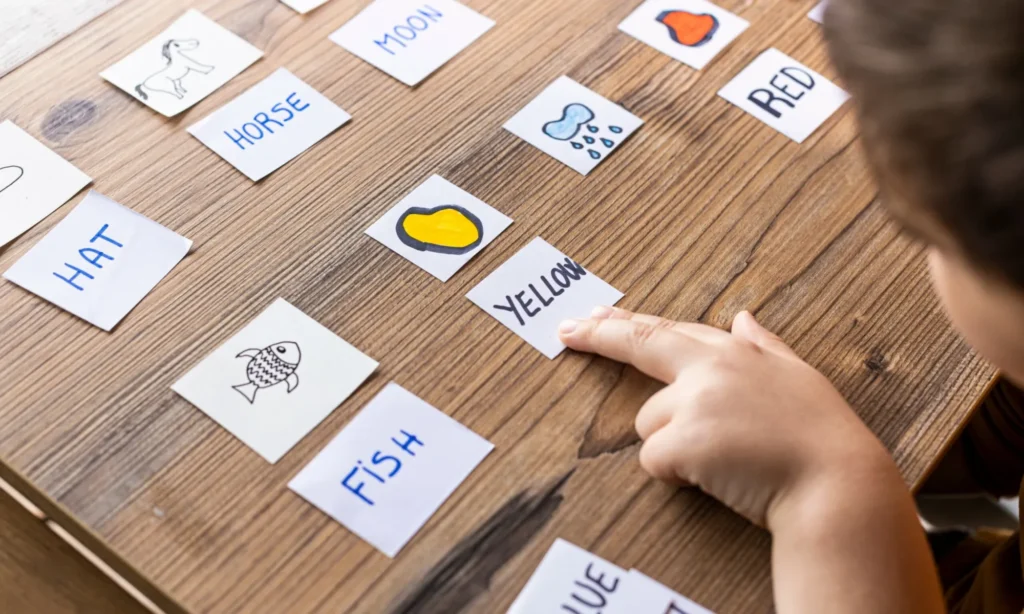
- Work With Us
- Blogging Resources
- Trip Planning

- Destinations
- Solo Travel
- Couples Travel
- Family Travel
- Expat Tips + Stories
- Expat Interview Series
- Inspiration + Musings
Get Inspired
42 inspiring & unusual travel words (besides wanderlust).
We’ve all tried to find words to describe a travel experience, and sometimes nothing seems to quite explain it right.
I love discovering new ways to express myself, and over the years I’ve slowly collected the below list of creative travel words that are either not commonly used in English or are from another language or are words that describe travel emotions we go through much better.

If you’re a bit of a Pinterest addict like me you might have heard some of these alternative words for travel before, but hopefully, some are new.
After all, we could all use some other words for wanderlust!
These are just a few of my favourite words associated with travel.
As someone who writes about travel all the time, I love finding new words for travel and to describe travel experiences.

Everyone knows wanderlust, but are there words for wanderlust in other languages, or even just another word for travel too?
I first wrote this post back in 2015 with just 24 new travel words that I had found over the course of the year while I was living abroad in Spain .
Since then I’ve come across many more so I’ve updated it to include the new ones!
Each travel word definition has been written in my own words, with a photo of my own, and examples from my own experiences.
I hope that you’re able to learn some new words for travel (that aren’t wanderlust but are other words for wanderlust!) and be a bit inspired by them like I have been!
The unusual travel words you need to know:
Resfeber (n), origin – swedish.
The tangled feelings of fear and excitement before a journey begins.
This is one of the most popular words associated with travel and all over Pinterest!
We’ve all felt this. That jolt in your heart when you book your flights, or when you tell your family and friends what you’re about to do.
Now that feeling has a word you can use!
This feeling is for new travellers and old alike. I still feel it when I embark on new journeys, especially before I moved to Spain to teach English .

Fernweh (n)
Origin: german.
Farsickness. An urge to travel even stronger than wanderlust.
That feeling you get when you’ve been home too long and you ache to be out into the world again.
Sometimes you don’t know where you want to be, but you know that it’s away. Sometimes you know where, and you want to get there as quickly as possible. This is that feeling.
I’ve had a serious case of the post travel blues , and felt this to the extreme!
It’s one of my favourite words related to travel, since it really does describe how I’ve felt on so many different occasions.

Origin: French
To drift unplanned, led only by the landscape and architecture around you.
The idea that even if you drift you will end up falling into a path that is lined out for you by your surroundings. This could describe life overall, but it also describes small journeys.
When you’re wandering through a new city and you just happen to wander on a path that takes you to great discoveries.
This happened to me in Stockholm, when I went to the archipelago and saw absolutely nothing of the city, and again in Lisbon where we made no plans and just let the city show us where to go.
This is a travel word I’ve seen less often, probably because many of us love to plan our trips, tick things off a bucket list and not miss out, but sometimes if you just allow yourself to wander you’ll find the most unexpected and best things of your trip.

Numinous (adj)
Origin: latin.
Feeling both fearful and awed by what is before you.
I don’t know why but there’s something intriguing about finding Latin words for travel. Maybe it’s because it’s not a language we really use anymore, but it forms the basis for so much of ours now.
There are quite a lot of words for travelling that are Latin based, or that we can turn into a word associated with travel.
Firstly referring to divinity, but I think it is a wonderful way to describe how you feel when you see things that are so amazing you’re not sure whether to be amazed or realise your own insignificance in the world. It’s the magical feeling when you see something truly awe-inspiring, be it the scenery before you, or just something amazing falls into place when you’re travelling.
Visiting the rice terraces of China was that moment for me.

Schwellenangst (n)
Fear of crossing a threshold to embark on something new.
Ok so this German word isn’t traditionally a word related to travel but it could be used as one of those words to describe a travel experience now.
Maybe referring literally to a door, but a great way to explain that feeling you might have before deciding to set out on a new journey.
Did you make the right decision? Those questioning feelings now have a name. I thought I might have made a mistake in moving to Spain but really, it was just this feeling of fearing something new.

Strikhedonia (n)
Origin: greek.
The joy of being able to say “to hell with it”.
A popular Greek word associated with travel!
This is what you can do when you decide to quit everything, stop making excuses , and explore the world.
Something you say when you book your flights or you decide to do something on your journey that you wouldn’t normally do. You’re travelling, who cares right?!
Now you have a word related to travel for that awesome feeling.

A wandering or roaming journey.
An unpredictable idea, desire or action.
Travelling without knowing the destination, and it doesn’t matter.
I got completely lost with friends in the Alpujarras in southern Spain , and it didn’t matter one bit. This is another Latin word for travel that we should definitely bring back into our vocabulary!

Sehnsucht (n)
A wistful longing and yearning in the heart for travels that have been and travels to come.
When you’re not travelling this can be an overwhelming feeling, or when you think about the travel you’ve done and you wish you could relive it all over again.
This feeling is why you need to make the most of every moment! It’s why the more you travel, the harder it gets .
This is one of those other words for wanderlust that we could use instead, although not as easy to say I admit!

Eleutheromania (n)
The intense desire for freedom.
This is probably one of the closest words to explaining wanderlust in different languages. People often say that travelling makes them feel free, and eleutheromania is the desire for this feeling.
We seem to find freedom in other cultures, or just in being outside the norm, and when you stop travelling, you crave it again.
I think this is what led me to make the crazy decision to move abroad for the first time at 16 !
Definitely one of my favourite other words for wanderlust and a firm favourite on Pinterest when you look for travel words.

Livsnjutare (n)
Origin: swedish.
Someone who loves life deeply and lives it to the extreme.
Someone I try to be. One that takes chances, takes risks, and always chooses the adventure .
This other word for travel could be used in place for wanderluster, nomad or traveller. We could all stand to appreciate what we have and make the most of life, and so this is an inspirational travel word!

Sturmfrei (adj)
The freedom of being alone and having the ability to do what you want.
Travelling solo can be especially rewarding because it’s all up to you. You can make your travel journey exactly how you want it to be. No compromises, no one else to please. Just you and the road.
You might meet amazing people when you travel , but being on your own is real freedom.
This isn’t traditionally a word associated with travel either, but instead with being in a place alone or without supervision from your parents, so like when they leave you at home for the weekend as a teenager.
But isn’t that slightly giddy feeling of being able to do whatever we want similar to how we feel when we travel? No one’s watching, so you can be who you want and let go!

Solivagant (adj)
Wandering alone.
The kind of traveller many of us are. Solo travel has exploded so much that it is no longer out of the ordinary.
As most solo travellers know, you’re not alone for long as you make your friends on the road . But sometimes, it’s the wandering journey you take alone that is the most rewarding.
This is a word for someone that travels a lot or someone on a solo journey.
It’s definitely a popular description amongst travel bloggers too!

Saudade (n)
Origin: portuguese.
Nostalgia and the love that remains. A desire to be near to something or someone distant.
This is a travel word for after your journey ends and you just want to be back where you were, or with the people you met on the way. It’s the feeling that’s left after it all ends.
It’s what makes you want to return to your favourite place , even if you know it might not be the same. Part of the definition of this travel word is also about looking forward positively to the future!

Origin: Japanese
An awareness of the universe that triggers emotional responses too deep and mysterious for words.
That feeling when it’s dark and you look at the stars and your wonder for all the things in the world wells up inside of you.
I felt like this when I saw the northern lights in Iceland during the wintertime . It was the most amazing experience and if I had any word to describe it then this would be it!

Acatalepsy (n)
The idea that it is impossible to truly comprehend anything.
Acatalepsy is a word that we can associate with travel.
Can you truly understand your travels, the things you see, and how they affect you?
Sometimes it takes time to process how travel might have changed your life, and sometimes we never truly know why we take the journeys we do and what they’ll mean for us until afterward.
We can reflect on amazing travel moments , but never fully know their impact until much later!

Origin: In doubt
The realisation every person is living their own vivid life.
I stumbled across this word and fell in love with the meaning, as it’s something I sometimes think about. How each person’s life is as full of different connections, memories, and possibilities as my own.
Although research tells me Sonder may not be a real word, the concept is beautiful and I think it can be a word closely associated with travel.
When we’re travelling we realise how everyone is living their own different and vivid life, sometimes close to our own and sometimes on a completely other level!

Trouvaille (n)
Something lovely found by chance.
A street, cafe, an experience stumbled upon by luck.
I love when this happens in my travels. A moment drinking coffee under a lemon tree in the south of Spain , a garden or a lake or a swimming hole discovered with no one else around.
I love finding alternative words to describe a travel experience, and this is a great one! It’s so important to appreciate the little things, especially when we come across them in an unexpected way.

Origin: Danish
The cosy feeling you get while you’re enjoying the good things in life with friends.
When you’re out for a meal with people you met during your travels , and you feel content and right.
That feeling that you’re right where you’re meant to be.
This isn’t traditionally associated with travel and has become much more popular in recent years as a word describing a Danish way of living.
This word is now much more popular and well known than when I first wrote this post when I was an expat ! When I first came across it in 2015 I’d never heard of it before at all!
And I love that.
To me, it sounded like a word to describe the experiences I’d had while travelling, when I’d met an amazing group of people and we were enjoying a shared meal together at the end of an awesome day of exploring.

Origin: The Dictionary of Obscure Sorrows – John Koenig
Awareness of how little of the world you’ll experience.
When you’re staring at the departures board and wishing you could go to all of those places at once.
It’s possible that the more you travel the harder it gets , and this is one of the reasons why. You can live abroad to try and travel more, but there’s still only so much to be seen.
This travel word is a little different in that it isn’t from another language but instead from a book.
However, it is another word that describes travel in that you’ll never reach the end of your exploration.
Travelling just makes you realise how much of the world there is still to see, and fuels your wanderlust even more!

Novaturient (adj)
A desire to change and alter your life.
This word for travel lovers describes the feeling that pushes you to travel.
When you know you’re not living the life you could be and there must be more out there for you.
It’s time to go and find it . I’ve never regretted travelling or moving abroad , even alone . It’s this knowledge and this feeling that makes me keep doing it!

Yoko meshi (n)
The stress of speaking a foreign language.
Literally translates to, “a meal eaten sideways”, and how I felt about speaking Spanish when I moved to Spain!
When people would tell me to “just start speaking” and it’s really not that easy.
Can you really learn a language just by moving abroad ? Maybe not, but you can try. Just be prepared for this feeling that you now have a travel word to describe!

Selcouth (adj)
Origin: old english.
Strange and uncommon, the way you see things when you travel.
Everything seems different and foreign, and it’s a good thing. We travel to seek out the things we don’t have at home .
This is another word that we can make into a word for travel, even though it doesn’t traditionally mean that.
It is one I could kind of see myself using to describe the odd things I’ve come across while travelling!

Eudaimonia (n)
The contented happy state.
That bursting feeling in your chest when you travel when it all feels right. The constant change in travel often puts our senses in overdrive and the highs are higher than ever.
Learning to dive on the Great Barrier Reef was one of the best experiences of my life, and I won’t soon forget this feeling.
This Greek word is actually related to a philosophy that has been translated as meaning happiness or well-being, but I think that it’s the way we often feel when we travel, so it’s a word for travel lovers too!

Coddiwomple (v)
Origin: english slang.
To travel purposefully towards a vague destination.
When you have an idea of where you’re going, but it doesn’t matter how long it takes to get there.
The road doesn’t have to be a straight one. In fact, sometimes it’s better when it’s not .
I love this travel word because I can imagine an old English gentleman discussing his latest “coddiwomple”!

Flâneur (n)
Someone who strolls aimlessly but enjoyably, observing life and the surroundings.
This is what I love to do when I get to a new city, or through the countryside .
When we travel we seem to have fewer worries in general, allowing us to place ourselves more IN the moment.
Plus walking a city and people watching is a great way to learn about a new culture! It’s also a lovely way to spend a romantic date !

Nefelibata (n)
“Cloud-Walker”. One who lives in the clouds of their own imagination, or who does not obey the conventions of society, literature or art. An unconventional person.
Probably the way people have described me on occasion!
For those who don’t travel, or don’t know how to begin, the idea can seem fantastical and unconventional.
But these days there are so many people breaking free of “cubicle” life and working as digital nomads with the world as their office, working different travel jobs , saving to move abroad , or taking a year off to travel. Phil and I now work for ourselves and travel as we like (with kids!).
It may be unconventional to some, but for the rest of us, it’s life.

Brumous (adj.)
Origin: english.
Of gray skies and winter days, filled with heavy clouds or fog.
This may be a travel word you only use if you travel to the United Kingdom, especially in Scotland (it’s not the weather though, you just need the right clothes !)
It’s well known as the land of rainy days and fog, and I’ve experienced first hand.
However, I visited the Isle of Skye , one of the beautiful places in the UK, in the wind and rain and it was no less amazing. So really, I don’t mind if I have to describe some of my travels this way.

Vorfreude (n)
The joyful, intense anticipation that comes from imagining future pleasures.
When we book a new trip and in the time before we go, this is the way we often feel.
We can think about the people we’ll meet , and all the exciting things we’re going to experience.
I love watching movies about places I want to go and then imagining myself there too, which is basically this feeling!

Commuovere (v)
Origin: italian.
Heartwarming, something that stirs and moves you.
I love finding new words that don’t translate into English. This one is a prime example of a word that is difficult to explain, but the best I can do is heartwarming, something that moves you to tears in a good way.
Maybe you’re wondering how this relates to travel… crying?!
Well, I’ve definitely shed a few tears over travel, from the good to the bad, and I’ve definitely been moved and awed by the things that I’ve seen.

Peregrinate (v)
Travel or wander around from place to place.
A pretty simple word that we could use to describe our travels and yet it seems to have fallen out of favour. “We peregrinated around the Scottish Highlands .” It works right?!

Nemophilist (n)
Origin: english.
A haunter of woods, one who loves the forest and it’s beauty and solitude.
There’s something magical about walking through the woods, and even more so in a foreign country.
When I lived in Canada on a study abroad one of my favourite things to do was wander through the huge forests there. So much so my new friends and I once got lost for 8 hours…

Querencia (n)
Origin: spanish.
The place where you are your most authentic self, from where strength is drawn, where you feel at home.
I’m so excited to have a Spanish word, after learning Spanish while giving in Spain.
This word comes is related to the verb querer , which is to want or desire.
It can be associated with bullfighting, as it is also the name for the area of the bullring where the bull takes its stand, but I like to think of it more as a travel word, of course.

Komorebi (n)
The sunlight that filters through the leaves of trees.
If you’re on those forest walks when you’re travelling like above, then this is hopefully what you’ll see!
Another unusual word that doesn’t translate directly into an English word, but one that describes a beautiful sight.

Hireath (n)
Origin: welsh.
A homesickness for a home to which you cannot return, a home which maybe never was. The nostalgia, the yearning, the grief for the lost places of your past.
Homesickness isn’t quite the right translation for this beautiful Welsh word, it’s more than that. It’s one of my favourites though as I often reminisce about my previous travels and times in my life.
It’s strange to think back to times like our babymoon in France , and how we had no idea what was ahead of us. As much as I love our life now I sometimes wish to live those times again!

Smultronställe (n)
Literally “place of wild strawberries” a special place discovered, treasured, returned to for solace and relaxation; a personal idyll free from stress or sadness.
When I went to Luleå in the north of Sweden in summer we discovered wild strawberries growing on an island in the middle of the archipelago.
That’s what I think of when I see this word because what better place to be? These are often the kind of places we discover when we travel.

Mångata (n)
The reflection of the moon on the water.
Something I only seem to see or see the most when I’m travelling.
It reminds me of being by the sea, of the Full Moon Party in Thailand and of the early darkness when I lived in the Gold Coast, Australia, where this photo was taken!

Photophile (n)
Origin: possibly english or greek.
A person who loves photography and light.
This one is a little in dispute. It could originate from the word for organisms that love light, “photophilic”, but have been adjusted to fit with photographers too.
Or, it could come from the same origins as “hodophile” in that “phos” means light and “philos” means friends. I can’t find concrete evidence either way, but that’s the beauty of finding new words!
Photophiles carry their camera wherever they go, and many travellers now do the same.
I used to have an old point and shoot camera, and then I stuck to mostly iPhone before finally getting a “proper” camera. I’ve been testing it out in Spain at places like the Alhambra , and in Portugal around the streets of Lisbon .
But there was nothing quite like the midnight sun in Luleå last summer.

Dépaysement (adj.)
Feeling that comes from not being in one’s own country. Being out of your element, a fish out of water.
Living abroad has often made me feel like this , especially in the early days.
Sometimes we can idealise moving abroad and not realise how it will affect us , but eventually, a place will feel like home, even if it’s a different concept of home than before.

Hodophile (adj.)
“Lover of roads”. One who loves to travel.
Does this travel word really need an explanation?
There’s something magical about setting out on a trip with the open road before you. My absolute favourite was driving across the Nullabor in Australia! It’s one of the longest straight roads in the world.

Cockaigne (n)
Origin: an english word with french origin.
Imaginary land of luxury and idleness; the land of plenty.
This word originates from a medieval myth, a land of plenty where society’s restrictions are defined and the harshness of life in medieval times does not exist.
Although we’re not in this time anymore, we could use this word to describe our ideal land of plenty now. One where people are not persecuted for their religion or race, one where equality reigns supreme, maybe one we will all be able to travel to one day?

Wayfarer (n)
Someone who travels, especially on foot.
Maybe not as unusual a word as some on this list, and one that you may already know. I considered making this my blog name when I started blogging !
It’s a word that makes me think of older times when people travelled in a more whimsical way that had nothing to do with social media. You went wherever the wind took you!

Absquatulate (v)
Origin: north american english.
To leave without saying goodbye.
Invented in the US in the 1830s as a word that sounded vaguely Latin, to make it seem older.
It means to make off with someone or something without announcing you’re going! The way many of us might feel we want to leave for our travels. No fuss, please!

Have you heard of these travel words and would you use them? Do you think they explain things better than we usually can?
If you liked them, pin them!
Sonja - Migrating Miss
Sonja is from New Zealand but now lives in Scotland with her husband and two little boys, after having lived in 5 other countries along the way including the USA, Australia, Canada, and Spain. Travelling has always been her passion and she has now made it her full-time job and worked in the industry for the last 8 years. She shares her living abroad experiences and best tips to make your travel experiences the best they can be!
55 thoughts on “ 42 Inspiring & Unusual Travel Words (Besides Wanderlust) ”
Amazing list! Looking to impress a number of my fellow travelers with this list now!
I swear some of them can be worked in to normal conversation! Others may be a little different but it’s so nice to have words that describe those travel feelings.
Sonja, that’s a great one!! Sharing it all over now:) love all the words and the idea of such a post:)
Thanks so much Monika! I have been sitting on all of these for a long time. They are saved all over my phone and written in personal journals, so I thought it was time to share!
I’d add: ecdemomania <3
That’s a good one I didn’t have! I’ll have to add it to the next list 🙂
I absolutely love these! I so often find myself having a hard time describing my deep seeded need to get away, always be moving, or travel solo. The long pause and struggle I have to express the answer to “why” when asked about my journeys can feel very awkwardly isolating, and not in the good way of standing alone on a mountain top or wandering an empty desert. I like to feel all alone in the world sometimes but other times, I want to be a part of something, a community, and understood. Seeing words like you have dug up to share in this post do just that. The fact that there are words in so many languages to describe exactly how I feel, means that I am not really alone, even when I have been on a road with no signs of humans for days!
Thanks Bethany! You are definitely not alone! I too loved discovering that there are words that actually describe how I feel when I can’t even really describe it myself. It means that there are other’s that have felt like this, and so much so that whole words have been created for it. I hope you find a way to explain how you feel and why you want travel and movement in your life. All the best x
Wow, I love these, thank-you!
Thanks! I’ve been collecting them for awhile, I love finding out about different words that we can use to explain our feelings, not that I would end up actually saying most of these!
Your list of words is awesome! But Germans actually don’t use “sturmfrei” in the context of traveling. It’s being said when your parents have left home for one or more nights so you can invite friends and party. 😉 it’s not a description about how we feel, it’s more a description of the situation itself. I definitely like your interpretation – hopefully it’ll become a part of travelers diaries.
Thanks Josi! It’s good to know the real meaning behind the word. I like the idea of trying to adapt it as a travel word too, so fingers crossed others see it like you too! 🙂
Thank you Sonja, This was a fun list. I doubt I will be able to work them into my vocabulary. I don’t think I can even pronounce most of them. Perhaps it would be fun to have a follow up post that included the pronunciation of each. You clearly have comfort with many languages. I envy that. Happy Trails to You, Michelle
Haha no they are not exactly everyday words! I think a few may be easier than others, but anyone actually understanding them is the problem! I love the idea that sometimes other languages can explain things better than English though, and I do find it fascinating in learning Spanish that things are not always a direct translation. The use of words can be so different! Happy travels to you too!
I loved reading these words! Thanks for finding them and creating the pin for them! What an excellent way to express our traveling emotions!
Thanks so much! You’re most welcome :). I have to admit I don’t use them a whole lot in my blog writing, but I just love them!
I love your words. Thank you.
Thanks for your comment!
This is a great list, I enjoyed it! Thanks. However, I just want to correct a minor detail. While I was reading along, I got surprised by the word “onism” as I am Danish and has never in my life heard of this word before, whereas “hygge”, the other Danish word on your list, is very commonly used. I looked up “onism” on the internet and found that it comes from The Dictionary of Obscure Sorrows which is a compendium of invented words written by John Koenig. I suppose it is made as a combination between the words “monism” (Greek?) and “onanism” (English?), so there is nothing Danish about its origin (at least not that I could find) x
Thanks Ida! I tried to research everything as much as I could (hours in fact haha) and I’m not sure how I ended up with that one! I’ll take another look but I suspect I’ll find the same as you and change it! Thanks again 🙂 x
I loved reading this post and found myself relating to almost every one! ? Thought the accompanying photos were perfect too. It’s given me inspiration for a new travel/art journal …
Thanks so much! It makes me really happy to hear I’ve given someone else inspiration 🙂 🙂
Wow !! Love them.. I was actually looking for a new word which would describe my travel agency. I think I should be able to come up with something using the list of words, u’ve mentioned in this post.
That’s great I’m glad they’re able to help you! Best of luck.
Thnx a lot for giving this sort of knowledge about the words who r completely new to me. Keep posting these words along with their meaning it helps a lot.
Thanks dea… It perfectely helped me to explain my inner feelings , but some words have difficulty in pronouncing . I wrote down every word in ma notebook for future description pf my Travel Thanks alot yaar <3
Hi, I would like to know if there is a word for this feeling describes below,
‘I feel at home when I’m travelling, but when I’m actually at home, I feel weird.
I don’t think wanderlust is the word, can you please help me?
I’m sorry I’m not sure! I only know these words and the other post I did about unusual travel words. It’s possible something exists though and I’ll keep an eye out since I love finding unusual words 🙂
Was looking for travel words from Greek origin, and have found it, thanks so much. Love your page as well, maybe we see each other on the road sometime 🙂
Thanks so much! I’m glad they’re useful 🙂
So who copied who? 🙂 https://www.theintrepidguide.com/travel-words-that-describe-wanderlust-perfectly/#.WjWJFCPMwmo
Great list!
OMG!!!! Thanks for bringing this to my attention!!! I can’t believe how similar some of the wording of this is!!! 🙁 🙁 🙁 I first published this in early 2016.
Thank you for compiling such a great list! I may be incorrect, but shouldn’t ‘Vagary’ be listed as a noun rather than a verb?
It appears it’s listed as a noun now to mean something unpredictable but it came from the verb to wander!
So great to see Eleutheromania included in the list, passionate about freedom!
One of my favourites!
This is a very impressive, creative and original list. Will revisit many times. Thanks for sharing 🙂
42? How did anyone even get to this comment section? I had to scroll for 2 days just to get to leave this comment. This is really outrageous. 7 would have been plenty. We are internet users here, not book readers.
Two days well spent I’m sure 😉
When one is confined within the four corners of the home, because of the pandemic, this list is very encouraging! Thank you Sonja, many of the words here describes various emotions I have already experienced. Two more weeks of lockdown, I have time to do a project, finding my travel photos that match the words :).
Love this post! I’m feeling so much fernweh at the moment <3
Same here!!
Thank you so much for these! At this time of great challenges in the world, it is comforting to know that I can read the wonderful words you have compiled to capture all the positive feelings travel evokes. Slainte!
I couldn’t find all of these travel words anywhere else. You know, I am gonna bookmark it right away. Thanks for sharing these travel phrases. I love it. Looking forward to reading more of these informative articles 🙂
Amazing read. Needed these for getting a travel domain name. Bookmarked this post already. It’s very useful. Looking forward to reading more of these awesome travel blogs.
Ha ha what a random post! Learned so many new words from this, excited to casually *drop* them into my conversations
Haha so many! I mean, half I think I’ve never said but it’s fun to learn their meaning and find words that can describe the things we feel and think when we travel x
Wonderful article, it must have taken a lot of work to put together so many words 🙂
Thanks! I collected them over a few years and then reworded in my own words :).
Nice article. Thanks for sharing these travel phrases. Looking forward to reading more of these informative articles .
Stunning article, loved to read. will read more for sure…
Was very helpful article
I love this list of inspiring words for travel! I’m always looking for new ways to explore new places and this list has given me some great ideas.
Leave a Reply Cancel reply
Your email address will not be published. Required fields are marked *
Save my name, email, and website in this browser for the next time I comment.
Sign up for tips, info, and travel antics delivered once a month to your inbox. Go on.
- Cambridge Dictionary +Plus
SMART Vocabulary: related words and phrases
The SMART Vocabulary cloud shows the related words and phrases you can find in the Cambridge Dictionary that make up this topic. Click on a word to go to the definition.

Word of the Day
Your browser doesn't support HTML5 audio
a large amount of ice, snow, and rock falling quickly down the side of a mountain

Keeping up appearances (Talking about how things seem)
Learn more with +Plus
- Recent and Recommended {{#preferredDictionaries}} {{name}} {{/preferredDictionaries}}
- Definitions Clear explanations of natural written and spoken English English Learner’s Dictionary Essential British English Essential American English
- Grammar and thesaurus Usage explanations of natural written and spoken English Grammar Thesaurus
- Pronunciation British and American pronunciations with audio English Pronunciation
- English–Chinese (Simplified) Chinese (Simplified)–English
- English–Chinese (Traditional) Chinese (Traditional)–English
- English–Dutch Dutch–English
- English–French French–English
- English–German German–English
- English–Indonesian Indonesian–English
- English–Italian Italian–English
- English–Japanese Japanese–English
- English–Norwegian Norwegian–English
- English–Polish Polish–English
- English–Portuguese Portuguese–English
- English–Spanish Spanish–English
- English–Swedish Swedish–English
- Dictionary +Plus Word Lists
Is it ‘traveling’ or ‘travelling’?
What to Know When it comes to spelling the forms of the verb travel , traveled and traveling are more common in the U.S., and travelled and travelling are dominant everywhere else.
Spelling is typically clear-cut in modern English: forty unfailingly betrays four ; the sweet treat after dinner is spelled dessert , not desert .
But some words have two forms that appear often enough in edited text to make it clear that something else is going on. And so it is with forms of the verb travel : traveled and travelled , and traveling and travelling .
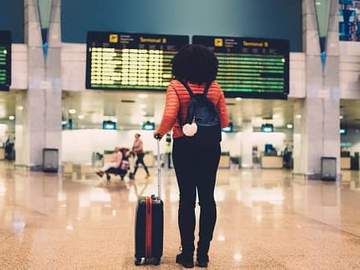
It might have a different spelling wherever you're going.
One or Two L 's?
If you look at where the single l forms originate and where the double l forms originate a pattern emerges: in the United States, traveled and traveling predominate, and everywhere else travelled and travelling are preferred.
The reason mostly comes down to one man we at Merriam-Webster hold especially dear: Noah Webster. Our lexicographical father (brothers George and Charles Merriam bought the rights to Noah Webster’s 1841 dictionary after Webster died) was a great believer in spelling reform and wanted English spelling to make more sense—and if the English of his homeland had more logic to it than its British parent, so much the better. He decided that travel needed only one l in its past and present participle forms.
Webster’s logic is the reason behind the spelling of canceled and cancelled as well: in the U.S., they have just one l , but elsewhere two l ’s are the norm.
American English Words that Use 2 L 's
Webster didn’t think all double l ’s needed to be reduced to one, however: in cases in which the accent, or emphasis, is on the syllable with the l , two l ’s are preserved: expelled and expelling ; controlled and controlling ; patrolled and patrolling .
Word of the Day
See Definitions and Examples »
Get Word of the Day daily email!
Games & Quizzes

Commonly Confused
'canceled' or 'cancelled', is it 'home in' or 'hone in', the difference between 'race' and 'ethnicity', homophones, homographs, and homonyms, on 'biweekly' and 'bimonthly', grammar & usage, more words you always have to look up, 'fewer' and 'less', 7 pairs of commonly confused words, more commonly misspelled words, commonly misspelled words, great big list of beautiful and useless words, vol. 4, 9 other words for beautiful, why jaywalking is called jaywalking, the words of the week - may 31, pilfer: how to play and win.

FODMAP Everyday®
29 Arabic Words You Didn't Know You Were Using Every Day
Posted: June 1, 2024 | Last updated: June 1, 2024

The English language is a melting pot of influences from various cultures and languages. Among these, Arabic has made a significant contribution, especially through trade, science, and cultural exchanges over centuries. This article explores the fascinating journey of Arabic words into everyday English, their origins, and their meanings in both languages.

Algebra comes from the Arabic word al-jabr, which means “reunion of broken parts.” This term was first used by the mathematician Al-Khwarizmi in his book Kitab al-Jabr wal-Muqabala, which laid the foundations for modern algebra.

Alcohol originates from the Arabic word al-kuḥl, which initially referred to a fine powder used as eyeliner. Over time, the term evolved to mean any distilled substance, and eventually, it came to denote the intoxicating liquid we know today.

Coffee is derived from the Arabic word qahwah , which originally referred to a type of wine. The term was later used to describe the beverage made from coffee beans, which became popular in the Arab world before spreading to Europe.

Cotton comes from the Arabic word qutn . The fabric and the term were introduced to Europe by Arab traders during the Middle Ages, significantly impacting the textile industry.

Lemon is derived from the Arabic word laymūn. The fruit and its name were brought to Europe by Arab traders, and it has since become a staple in various cuisines worldwide.

Sugar originates from the Arabic word sukkar. Arab traders played a crucial role in the spread of sugarcane cultivation and the knowledge of sugar production to Europe.

Zero comes from the Arabic word ṣifr, meaning “empty” or “nothing.” This concept was introduced to Europe through translations of Arabic mathematical texts, revolutionizing mathematics.

Safari is derived from the Arabic word safar, meaning “journey.” The term was adopted into English via Swahili, where it described expeditions into the African wilderness.

Sofa comes from the Arabic word ṣuffah, which means a bench or long seat. This term was adopted into English to describe a comfortable, upholstered seat.

Magazine originates from the Arabic word makhzan, meaning “storehouse.” The term was initially used to describe a place for storing goods and later evolved to mean a periodical publication.
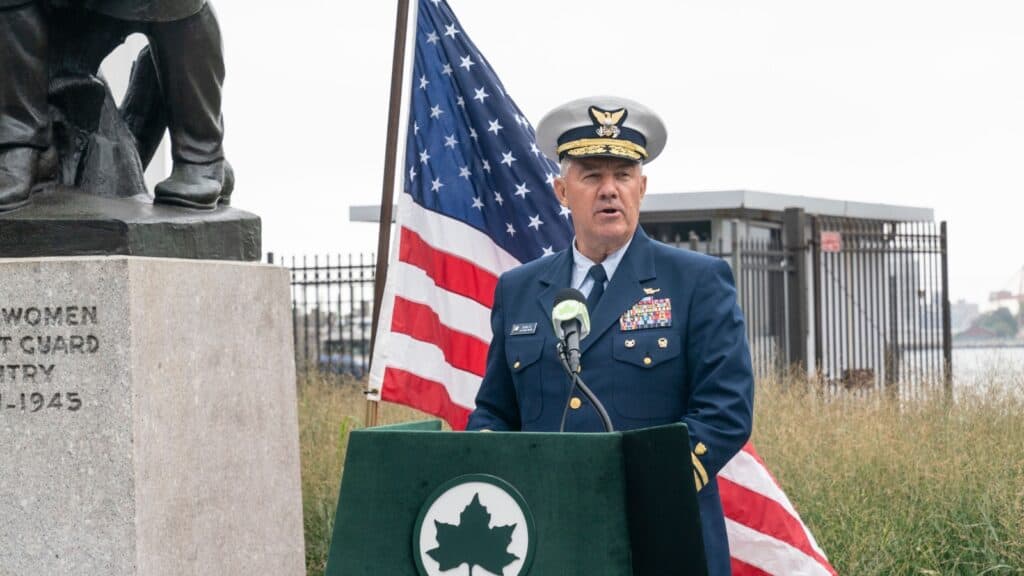
Admiral is derived from the Arabic term amīr al-baḥr, meaning “commander of the sea.” This title was used by Arab naval leaders and was later adopted by European navies.

Ghoul comes from the Arabic word ghūl, referring to a mythical creature that preys on the living and the dead. This term entered English through translations of Arabian folklore.

Elixir is derived from the Arabic word al-iksīr, which referred to a substance believed to transform base metals into gold. The term was adopted by alchemists and later came to mean a magical or medicinal potion.

Mattress comes from the Arabic word maṭraḥ, meaning “place where something is thrown down.” This term was used to describe a cushion or pad for sleeping, which was later adopted into English.

Syrup originates from the Arabic word sharāb, meaning “beverage.” The term was used to describe sweet, thick liquids and was adopted into English through medieval Latin.

Artichoke is derived from the Arabic word al-khurshūf. This vegetable was introduced to Europe by Arab traders and has since become a popular ingredient in various cuisines.

Carat comes from the Arabic word qīrāṭ, which referred to a small unit of weight used for measuring precious stones. This term was adopted into English through Italian and French.

Checkmate is derived from the Arabic phrase shāh māt, meaning “the king is dead.” This term is used in chess to indicate a winning move that traps the opponent’s king.
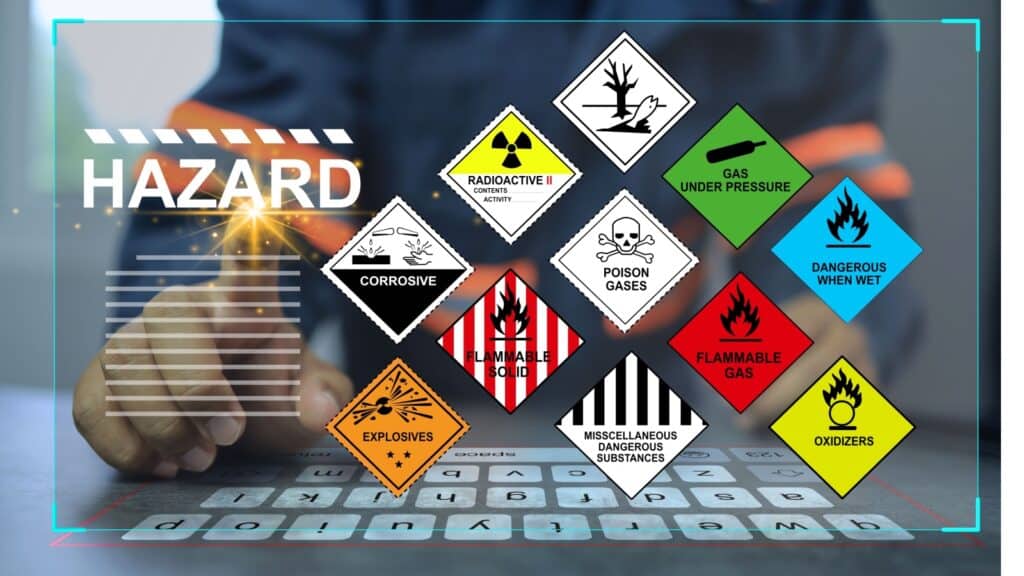
Hazard comes from the Arabic word al-zahr, meaning “the dice.” The term was used in games of chance and later adopted into English to describe a potential source of danger or risk.

Jasmine is derived from the Arabic word yāsamīn. This fragrant flower was introduced to Europe by Arab traders and has since become popular in gardens and perfumes.

Sherbet comes from the Arabic word sharbat, meaning “a drink.” This term was used to describe a sweet, flavored beverage and was later adopted into English to refer to a frozen dessert.

Arsenal is derived from the Arabic phrase dār al-ṣināʿa, meaning “house of manufacturing.” This term was used to describe a place where weapons and military equipment were made and stored.

Nadir comes from the Arabic word naẓīr, meaning “opposite.” In astronomy, it refers to the point directly opposite the zenith, or the lowest point.
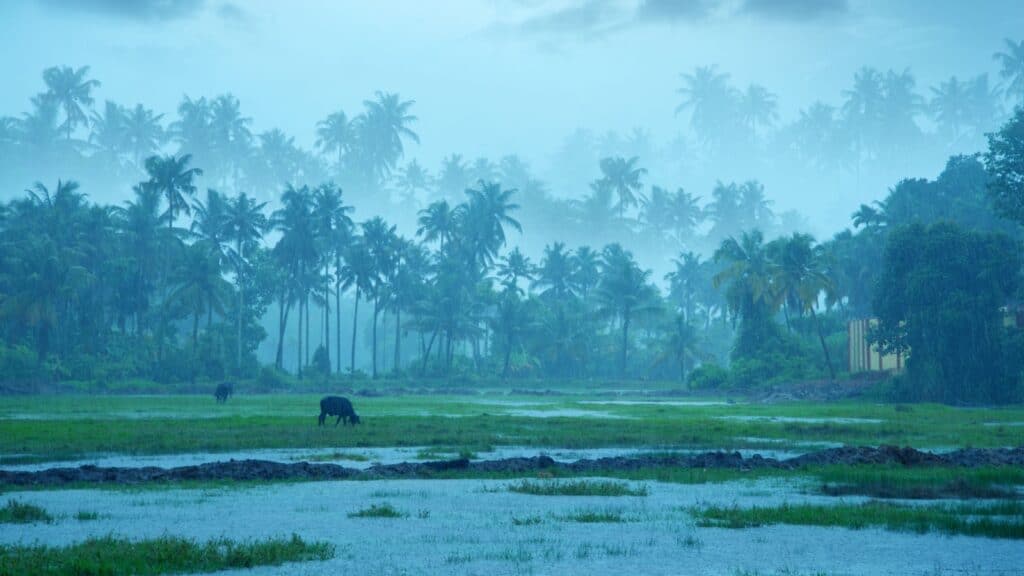
Monsoon is derived from the Arabic word mawsim, meaning “season.” This term was used by Arab sailors to describe the seasonal winds in the Indian Ocean.
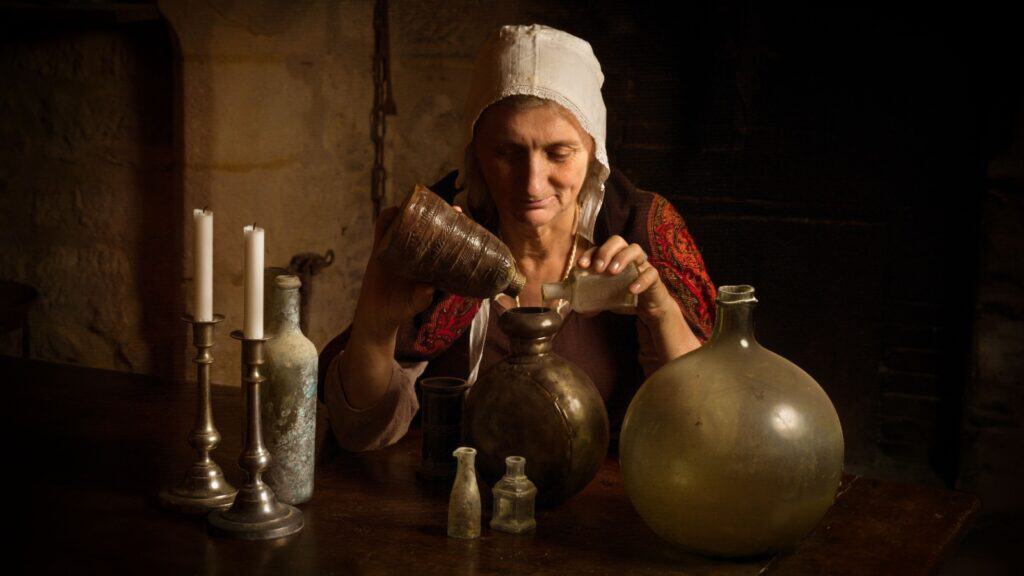
Alchemy comes from the Arabic word al-kīmiyāʾ, which referred to the ancient practice of transforming base metals into gold. This term was adopted into English through Latin and French.

Cipher is derived from the Arabic word ṣifr, meaning “zero” or “empty.” This term was used in mathematics and later came to mean a coded message.

Alcove comes from the Arabic word al-qubba, meaning “vaulted chamber.” This term was used to describe a recessed space in a room and was adopted into English through Spanish.

Carafe is derived from the Arabic word gharrafa, meaning “drinking vessel.” This term was used to describe a container for serving drinks and was adopted into English through French.

Saffron comes from the Arabic word zaʿfarān. This precious spice was introduced to Europe by Arab traders and has since become a valuable ingredient in cooking and medicine.

The Takeaway
The integration of Arabic words into the English language is a testament to the rich cultural exchange between the Arab world and the West. These words not only enrich our vocabulary but also provide a glimpse into the history, culture, and scientific advancements of the Arab world. From mathematical terms to everyday objects, the influence of Arabic on English is profound and enduring. Understanding these words and their origins enhances our appreciation of both languages and the cultures they represent.

Yiddish Words You Didn't Know You Were Using Every Day
English is a vibrant mix of many languages and cultures, and Yiddish-a Germanic language traditionally spoken by Ashkenazi Jews-has left a notable mark on American English. How many of these words have made it into your vocabulary? Do you have a favorite? READ: Yiddish Words You Didn't Know You Were Using Every Day

Countdown 18 Of The World's Most Overrated Foods
We all have foods we love and those we avoid. Everyone has their own likes and dislikes, but which foods are the most overrated? This question sparked a lively debate online, generating a variety of opinions. Some made perfect sense, while others were surprising and thought-provoking.
What's the most overrated food in your opinion?
READ: Countdown 18 Of The World's Most Overrated Foods

Science Tells Us What To Expect As We Age: Strategies For Thriving In Later Life
that pertain to us all. Aging gradually alters people over decades, a long period shaped by individuals' economic and social circumstances, their behaviors, their neighborhoods, and other factors. Also, while people experience common physiological issues in later life, they don't follow a well-charted, developmentally predetermined path. Let's take a look at what science has told us to expect. READ: Science Tells Us What To Expect As We Age: Strategies For Thriving In Later Life

Join us on this empowering journey as we explore, celebrate, and elevate "her story." The Queen Zone is not just a platform; it's a community where women from all walks of life can come together, share their experiences, and inspire one another. Welcome to a space where the female experience takes center stage. Sign up for our newsletter so you don't miss a thing, Queen!
The post 29 Arabic Words You Didn’t Know You Were Using Every Day appeared first on The Queen Zone .
More for You
These Are The 7 Things Stroke Doctors Say You Should Never, Ever Do
Mechanic shares photo of unexpected object that punctured vehicle's tire: 'This will be increasingly common'
New Camera Angle Shows Malicious and Dirty Hit on Caitlin Clark
“The whole thing that’s happening to Spike is B.S.”: Edward Norton Protested Against Unjust Criticism Against His $25.3 Million Movie
I'm a 57-year-old Woman and People Think I'm in my 30's - Here's My Tips to Aging Gracefully
Donald Trump Gets Unexpected Support for New York Pardon
12 States Are Banning the Sale of Gas-Powered Cars
Air Force Pilot Who Had Been Ordered to Prevent 9/11 Hijacked Plane from Reaching Washington, D.C., Retires
A relationship expert reveals the top five reasons why people cheat
Why some major artists are suddenly canceling shows, and in some cases entire tours
Getting Rid of a Printer? Do This First—or Risk Getting Hacked
The Only Major Actors Still Alive From Gilligan's Island
Angel Reese Is Blowing Up Online After Crazy Play On Caitlin Clark
'Way better than my day job': This Florida mom made over $85,000 in just 1 year renting out strollers, car seats and baby toys as a side hustle — here's how she did it
If you have this much money in your 401(k), you're doing better than most—here's how to save even more
New poll finds 49% of independents and 15% of Republicans think Trump should end campaign after conviction
Scammer Alert: If Someone Calls You Using Any of These 12 Phrases You’re About To Be Scammed
“I like to call that scene the kiss of life”: Halle Berry Completely Lost Herself During Her Oscar Winning Role in Monster’s Ball
A 70-year-old who finally found a solution to a lifetime of loneliness says the friendships he's made are worth the cost
The Little-Known Wax Paper Trick That Will Keep Your Microwave Sparkling Clean

Politics | Quest for DeSantis’ travel records leads to…
Share this:.
- Click to share on Facebook (Opens in new window)
- Click to share on X (Opens in new window)
Daily e-Edition
Evening e-Edition
SUBSCRIBER ONLY
Politics | quest for desantis’ travel records leads to 2-year delay, then denial, “we have a new model that can be summed up in two words: trust me,” first amendment advocate says.

The newspaper wanted to determine if DeSantis, who was running for reelection, had piggybacked campaign events on top of official ones without the campaign reimbursing the state for the Aug. 30, 2022, flight.
It also wanted to know whether other candidates reimbursed FDLE for using the jet bought with taxpayer dollars after DeSantis became governor in 2019. The aircraft is available to the governor and other top state leaders for official duties.
The FDLE denied the requests in late April and early May. It delayed the response until a year after DeSantis signed a law that bans the release of his and the other leaders’ travel records. Lawmakers called it necessary to protect their safety.
“My fear and suspicion is they are using public safety as an excuse to hide expenditures they don’t want you to know about,” said Bobby Block, executive director of the First Amendment Foundation. “We have a new model that can be summed up in two words: Trust me.”
The bill’s sponsors, both of them Republican, repeatedly assured public records advocates and Democratic lawmakers that the financial records related to travel would continue to be available to the public as they always had been. The law was meant to shield only the logistics of the trips, they said.
The bill passed along party lines in both the House and Senate.
Rep. Jeff Holcomb, R-Spring Hill, sponsor of the House version of the bill, also assured fellow lawmakers during a committee hearing in March that the bill wouldn’t affect public records requests related to campaign travel.
“This doesn’t affect any of the financial disclosures in place,” Holcomb said. “This is about the methods and means of security protection.”
But that has not turned out to be the case. Other news outlets besides the Orlando Sentinel have waited several months to find out their requests for travel records were denied.
The reason given for the lengthy delay was that the agency’s public records department is short-staffed and deals with a high volume of requests.
Holcomb did not return an email seeking clarification.
Complaints have been filed with the Federal Elections Commission and the state Commission on Ethics over the governor’s frequent use of state and private aircraft and failure to disclose using it for personal reasons. They are pending.
A lawsuit challenging the law’s constitutionality was recently filed in Leon Circuit Court by American Oversight, a nonprofit government watchdog committee.
“It’s about accountability that impacts all the citizens of the state,” Block said. “Are you spending dollars on things that impact citizens or is it a personal trip intended for your career interests and nothing to do with the public good?
The governor’s office did not respond to a request for comment.
Part of the problem is the law includes a long list of things to be exempt from public view but says nothing about the transportation costs or travel related to political campaigns or other personal use, he said. And the language is vague enough to make understanding legislative intent problematic.
“The only way to get to the bottom of this is a court case,” Block said.
It was difficult enough to trace the governor’s travel before he signed the bill into law, which went into effect immediately with hundreds of requests going back months and more than a year still in the pipeline, waiting to be processed. And the law is retroactive.
“The retroactivity makes it such that we’re not going to get anything related to his travel,” Michael Barfield, director of public access for the Florida Center for Government Accountability, said at the time. The FLCGA has filed numerous public records lawsuits against the DeSantis administration.
Other recent trips that have raised concerns about who was paying for them include ones to Japan, Seoul, South Korea and Israel, all paid for with officials said were private donations, Politico reported.
A book tour to launch DeSantis’ memoir and kick off his presidential campaign was handled by a nonprofit that didn’t have to disclose its records.
And a law enforcement report of a fender bender outside of Chattanooga that waylaid the governor’s presidential campaign convoy last July revealed that the FDLE had rented the vehicles used in the motorcade. The cost of those rentals is still unknown.
The Sentinel asked FDLE back in August 2022 how much it had cost to fly the governor to and from Fort Pierce and Live Oak, including flight crew costs, ground transportation, and security team expenses. A September 2022 flight to Fort Myers was also questioned.
Unlike previous campaign reports that show the DeSantis campaign paid back the FDLE $14,459 for transportation, campaign records show no repayment to FDLE for the Aug. 30 trip.
The dates of the three reimbursements lined up with DeSantis news conferences in Vero Beach, Daytona Beach, DeFuniak Springs and Sanford. But nearly two years later, the FDLE has still not provided details about those reimbursements.
Asked to explain the lengthy delays, FDLE spokeswoman Gretl Plesinger said the agency is overwhelmed by thousands of public requests.
FDLE publishes a Protective Operations Report each year that gives the total annual cost of transporting and protecting the governor, but it’s not broken down into individual trips.
The governor’s security detail for 2023, including transportation and agents’ salaries was $9.4 million, more than double the amount spent the previous year.
“The information is invariably useless to anyone trying to figure out who paid” for the travel, Block said.
Former FDLE Chief of Staff Shane Desguin said in a sworn statement filed by the Washington Post in a lawsuit against the FDLE that top aides to the governor blocked the release of records detailing the governor’s taxpayer-funded travel.
“This extra layer of review often unquestionably delayed FDLE’s ability to timely respond to the public records requests,” said Desguin, who resigned after arguing the records should be made public. “These delays were not in line with the new law to protect the governor’s safety.”
When he began working at the Florida Amendment Foundation two years ago, Block said, he was reluctant to say that the public records system was broken.
But there is no independent body to mediate when a person’s request for records is denied, delayed or not even met with a response, Block said. The only alternative is to take the agency to court, something most Floridians cannot afford, he said.
“If that’s their only option, then the system is broken,” Block said. “There is no better explanation that the system is broken than this travel financial information brouhaha we’re having now.”
More in Politics

Election 2024 | Republicans join Trump’s attacks on justice system and campaign of vengeance after guilty verdict

National News | Q&A: These researchers examined 20 years of data same-sex marriage. They didn’t find any harms

Florida News | Judge rejects Florida lawsuit over federal children’s health insurance program

National Politics | Tests find AI tools readily create election lies from the voices of well-known political leaders
- Apple Watch
- Accessories
- Digital Magazine – Subscribe
- Digital Magazine – Info
- Smart Answers
- 11th-gen iPad
- New AirPods
- Best Mac antivirus
- Best Mac VPN
When you purchase through links in our articles, we may earn a small commission. This doesn't affect our editorial independence .
iOS 18 to allow text effects for individual words in iMessage

Get ready to jazz up your iMessages. According to a MacRumors story citing “multiple sources familiar with the matter,” iOS 18 is going to take the fun text effects a step further by allowing you to add text effects to individual words within the message .
It is not clear if these will be the same text effects currently available to entire messages, entirely new ones (like bold or italics), or something else entirely. You can already add a handful of fun effects to your iMessages . There are full-screen effects like balloons, lasers, and confetti, or text effects like slam or invisible ink. Those text effects apply to your entire message, though.
Messages in iOS 18 is expected to get quite an upgrade with RCS support allowing for much better communication with Android phones, AI-powered autocomplete features, and maybe even custom AI-generated emojis . It’s not clear if these text effects will apply only to iMessages or will work with RCS messages as well, but Apple is incentivized to continue making iMessage a more full-featured and desirable alternative to the “green bubbles,” even if Android users can send messages that are more advanced that the current SMS ones.
We’ll learn about all the changes coming to Messages in iOS 18 and macOS 15 at WWDC in June .
Author: Jason Cross , Senior Editor

I have written about technology for my entire professional life - over 25 years. I enjoy learning about how complicated technology works and explaining it in a way anyone can understand.
Recent stories by Jason Cross:
- iOS 18, macOS 15 and everything else coming from Apple in June
- Report: An iOS 18 update will enable Siri to control any app
- iOS 18 Guide: ‘Project Greymatter’ might make your iPhone easier to use
- My View My View
- Following Following
- Saved Saved
Bruhat Soma, 12, wins US national spelling bee in a spell-off
- Medium Text

Sign up here.
Reporting by Daniel Trotta; Editing by Frank McGurty, Cynthia Osterman and Neil Fullick
Our Standards: The Thomson Reuters Trust Principles. New Tab , opens new tab
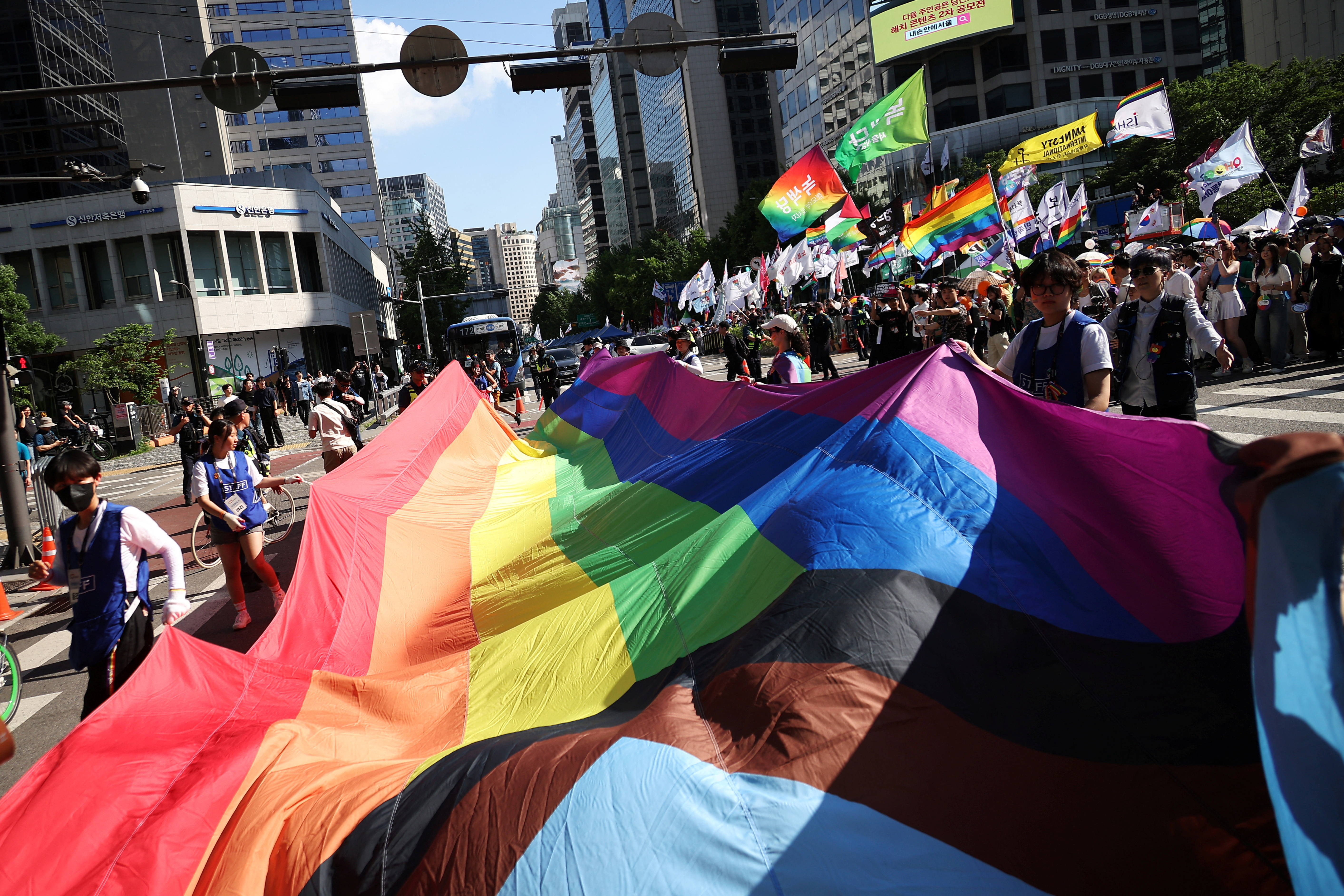
World Chevron

Prospect of peaceful 'reunification' with Taiwan being 'eroded', China says
The prospect of peaceful "reunification" with Taiwan is being increasingly "eroded" by Taiwanese separatists and external forces, Chinese Defence Minister Dong Jun said on Sunday, promising to ensure independence never happens.
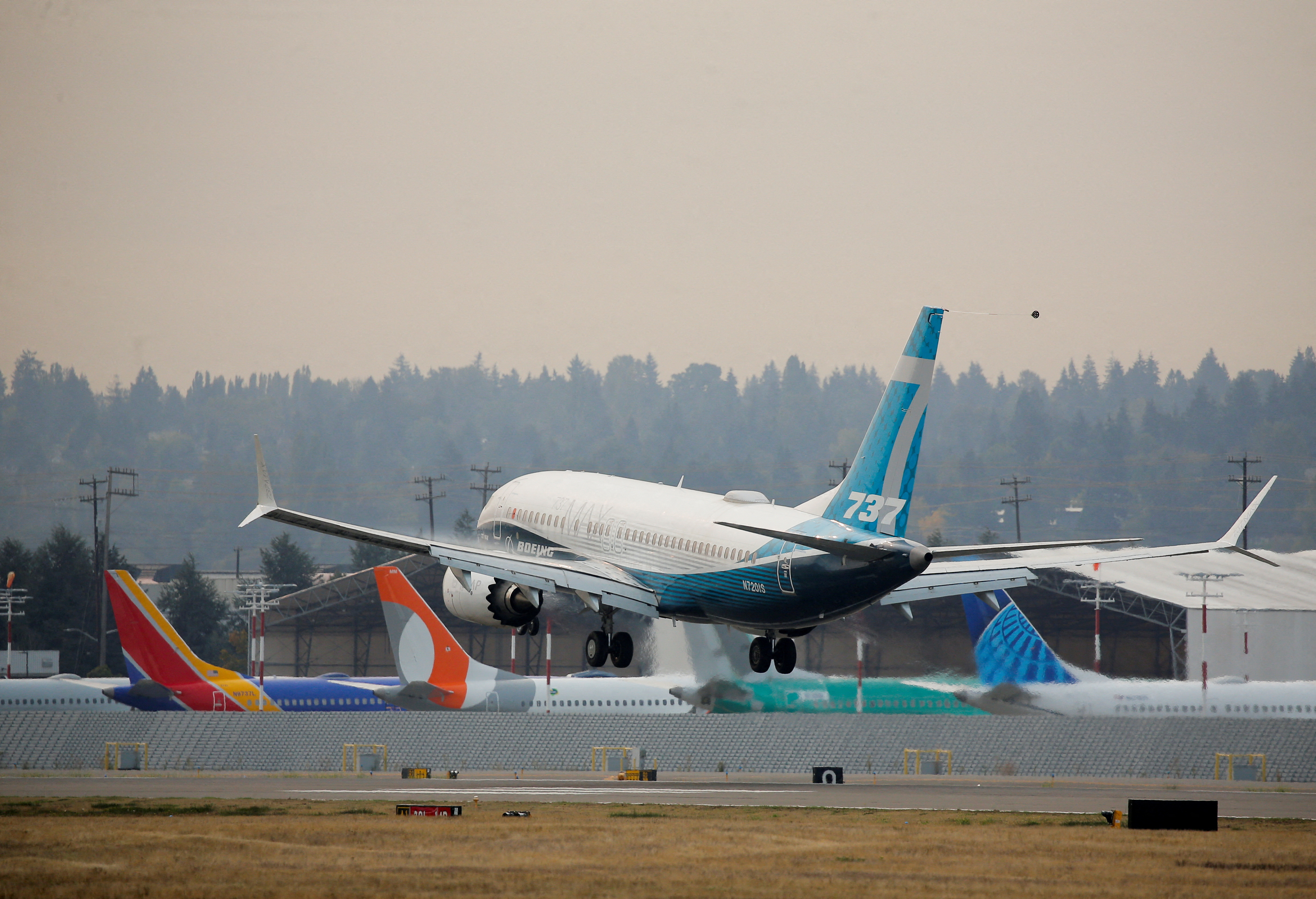
Pope Francis used an offensive slur for gay men during a discussion with bishops, sources say
Pope Francis used an offensive slur for gay men in a closed-door discussion with Italian bishops last week, two sources who were in the room told NBC News.
The pontiff's use of the derogatory term, first reported by Italian media, led the Vatican to apologize Tuesday “to those who were offended.”
The reported comment came at an assembly of bishops held behind closed doors on May 20. The group was discussing the issue of admitting homosexual men into seminaries when Francis used an Italian term that represents a vulgar way to refer to a gay person, the sources said.
Francis reiterated that gay men should not be allowed to train in seminaries as priests, according to Italian media, which said that his use of the slur left some in the audience surprised given the pope’s track record of a more welcoming approach toward the LGBTQ+ community.
The Vatican responded to the reports Tuesday, saying the pope was “aware of articles that recently came out about a conversation, behind closed doors, with the bishops.”
“As he has had the opportunity to state on several occasions, 'In the Church there is room for everyone, for everyone! No one is useless, no one is superfluous, there is room for everyone. Just as we are, everyone,'” Vatican spokesman Matteo Bruni said in a statement.
“The pope never intended to offend or express himself in homophobic terms, and he extends his apologies to those who were offended by the use of a term, reported by others,” Bruni added.
The political gossip website Dagospia appears to have been the first to report on the alleged incident, citing multiple “shocked” bishops who took part in the bishop conference.
One of Italy’s largest newspapers, Corriere della Sera, quoted several unnamed bishops suggesting that the pope may not have been aware of how offensive the word is in Italian.
Vatican veteran reporter and author Gerry O’Connell also suggested that the pope’s remark was “a gaffe on the part of the pope, rather than a slur,” as a nonnative Italian speaker.
The alleged comment came as a surprise to many as Francis, 87, is known for having more liberal views than many of his predecessors when it comes to the LGBTQ+ community, as well as on other issues such as the role of women in the Catholic Church and the environment .
Last December, he formally approved allowing priests to bless same-sex couples because people seeking God’s love and mercy shouldn’t be subject to “an exhaustive moral analysis” to receive it.

In August, he also said that the Catholic Church is open to everyone , including the gay community, and that it has a duty to accompany them on a personal path of spirituality but within the framework of its rules.
Francis set the tone at the beginning of his papacy in 2013 when he made an off-the-cuff remark to reporters that won over many critics who had dismissed the church as close-minded. “If a person is gay and seeks God and has good will, who am I to judge him?” he said.
An instruction issued by the Vatican under Francis’ predecessor, Pope Benedict, in 2005 ruled that those who “practice homosexuality, present deep-seated homosexual tendencies or support the so-called gay culture” cannot be admitted into the seminary or holy orders.
Yuliya Talmazan is a reporter for NBC News Digital, based in London.
Matteo Moschella is a London-based reporter for NBC News' Social Newsgathering team.

IMAGES
VIDEO
COMMENTS
English is often used in travel situations as a common language which many people can speak. This means that knowing some English phrases can make your trip safer and more fun, even if you're not traveling to a place where English is the official language. Travel is also an amazing reason to improve your English.
Follow us on Instagram and send us a direct message to get your hands on our comprehensive eBook (write "Travel eBook"), which features 200 essential English words and phrases for travel, plus 2 special bonuses! We hope this guide will be a valuable resource for your travel adventures.
Travel Vocabulary: Using English for Travel. Travel vocabulary is one of the most useful areas of language learning today, as more people than ever are travelling far and wide for business and pleasure. There are many useful words and phrases we use when travelling and dealing with transport.
Air Travel Vocabulary and Sample Sentences. Airport: I went to the airport to catch a flight to San Francisco. Check in: Make sure to get to the airport two hours early to check in. Fly: I like to fly on the same airline to get mileage points. Land: The airplane will land in two hours. Landing: The landing took place during a storm.
Travel English Phrases. English is essential for communication in most countries. Wherever you are going, you need to have a good grasp of the basics of the language to get around and communicate at the airport, hotel and everywhere in between.. This post has dozens of travel English phrases to help you navigate any foreign country.
Whether you're working in English or simply exploring a new country, these words and phrases will help you communicate with ease. Firstly, let's start with some basic greetings. It's always nice to say "hello" and "goodbye" when you meet new people, so learn phrases like "hello", "good morning", "good evening", and ...
100+ Travel words: depart, arrive, transfer, splash out, check-in, accommodation, currency, take off, landing, alarm and more ›››› ... Home English Vocabulary 100 + Travel Words explained 🛫🏝 ️ Best Free Lesson. English Vocabulary; Infographics; 100 + Travel Words explained 🛫🏝 ️ Best Free Lesson. By. Amina - April 11 ...
Travelling is going from a place to a distant place. Movement of people is considered as travel. People travel by many vehicles such as car, bus, plane, train or ship. These are called means of transport. ⬤ Pictures of travel vocabulary with pronunciations. Here is a list of travel vocabulary in English with pictures.
Practice your travel English with other learners, language enthusiasts, and professional instructors on the italki app, which doubles as an interactive social media platform. More good news; you can sample a few instructors before deciding on the one you feel most comfortable working with. English for travel expressions you should know
Learn Laugh Speak is here to help you master essential travel vocabulary for English students. With our structured lessons at levels A1, A2, B1, and B2, you can easily learn the words and phrases you need for traveling in an English-speaking country. Our platform provides instant corrections, ensuring that you're learning English at the right ...
Write your own travel story using some of the new vocabulary and expressions. You can write about a past travel experience, a business trip, a future vacation or any other travel opportunity. Then share your story in the comments. The goal is for you to use the same keywords in your own sentences. This is the best way for you to truly learn and ...
Focus on Memrise English courses for tourism. These lessons feature English vocabulary words and phrases that anyone in the tourism industry would use in their daily activities. Try spending at least 30 minutes a day using Memrise to brush up on your tourism vocabulary—you'll notice a difference!
Travel Words: Car Rentals. Travel Words: Navigating Your Journey. Travel Words: Maps and Directions. Travel Words: Signage and Symbols. Travel Words: At the Airport. Travel Words: Check-In Process. Travel Words: Departure Lounge. Travel Words: Arrival and Baggage Claim. Travel Words: On the Plane.
4. Fernweh (n.) Origin: German. Definition: This German word,means an ache to get away and travel to a distant place, a feeling even stronger than wanderlust. If wanderlust wasn't poetic enough for you, allow me to present fernweh, a German word that literally translates to "distance-sickness.".
TRAVEL ENGLISH/ENGLISH FOR TOURISTS Welcome to our Travel English section! If you're planning a trip, and would like to learn/practice common English phrases used by travelers, we offer 60 free exercises that will help you do this. This is much more than a simple English phrase book. It's a collection of interactive exercises designed to assist ...
Learn English for free with 2063 video lessons by experienced teachers. Classes cover English grammar, vocabulary, pronunciation, IELTS, TOEFL, and more. Join millions of English learners worldwide who are improving every day with engVid. Learn important, basic words you will need when you travel. Knowing a little English vocabulary can help a ...
Hygge (n.) Origin: Danish. Pronunciation: hue-gah. Meaning: the Danish practice of creating warmth, connection, and well-being; a complete absence of anything annoying or emotionally overwhelming; taking pleasure from the presence of gentle, soothing things; celebrating the everyday.
the act of changing location by raising the foot and setting it down. fly. travel through the air; be airborne. journey. the act of traveling from one place to another. voyage. a journey to some distant place. tour. a route all the way around a particular place or area.
Origin: Norwegian. Definition: The euphoria you experience when you are first falling in love. This is such a beautiful and creative travel word. The first time we fell in love with each other, it was confusing. But the tangled emotion that I was feeling at that time was probably known as "forelsket"!
Expressions and phrases for stayin in hotels / hostels. English for travel: Asking about directions. Expressions and phrases you need to know to get to your destination. English for travel: Food and restaurants. Travel expressions to use at the restaurant. Travel English phrases: Shopping.
An urge to travel even stronger than wanderlust. That feeling you get when you've been home too long and you ache to be out into the world again. Sometimes you don't know where you want to be, but you know that it's away. Sometimes you know where, and you want to get there as quickly as possible. This is that feeling.
Travelling - related words and phrases | Cambridge SMART Vocabulary
A tale of two variants. What to Know. When it comes to spelling the forms of the verb travel, traveled and traveling are more common in the U.S., and travelled and travelling are dominant everywhere else. Spelling is typically clear-cut in modern English: forty unfailingly betrays four; the sweet treat after dinner is spelled dessert, not desert.
Hazard. Hazard comes from the Arabic word al-zahr, meaning "the dice.". The term was used in games of chance and later adopted into English to describe a potential source of danger or risk ...
A quest for Gov. Ron DeSantis' travel records leads to 2-year delay, then denial by the Florida Department of Law Enforcement. In the meantime, the Legislature passed a law keeping such recor…
David Pastrnak scored the third-period winner at 9:13 as the Czechs blanked Switzerland 2-0 in the 2024 gold medal game in Prague. Amid a wild atmosphere, Czechia becomes just the fifth nation ever to win the IIHF Ice Hockey World Championship on home ice. Set up by Tomas Kundratek after an offensive-zone draw, the Boston Bruins superstar ...
You can already add a handful of fun effects to your iMessages. There are full-screen effects like balloons, lasers, and confetti, or text effects like slam or invisible ink. Those text effects ...
Last year, Largo, Florida's Dev Shah, then 14, battled through 15 rounds and won the championship with his spelling of the word "psammophile" (a plant or animal that thrives in sandy areas).
By Yuliya Talmazan and Matteo Moschella. Pope Francis used an offensive slur for gay men in a closed-door discussion with Italian bishops last week, two sources who were in the room told NBC News ...
Eilish's "Lunch" is a brilliant reinvention of our freedom of queer expression, and it comes at a most desperate time. In states across the country and countries around the world, anti-LGBTQ ...